Vol. XVII. APRIL, 1915 No. 2
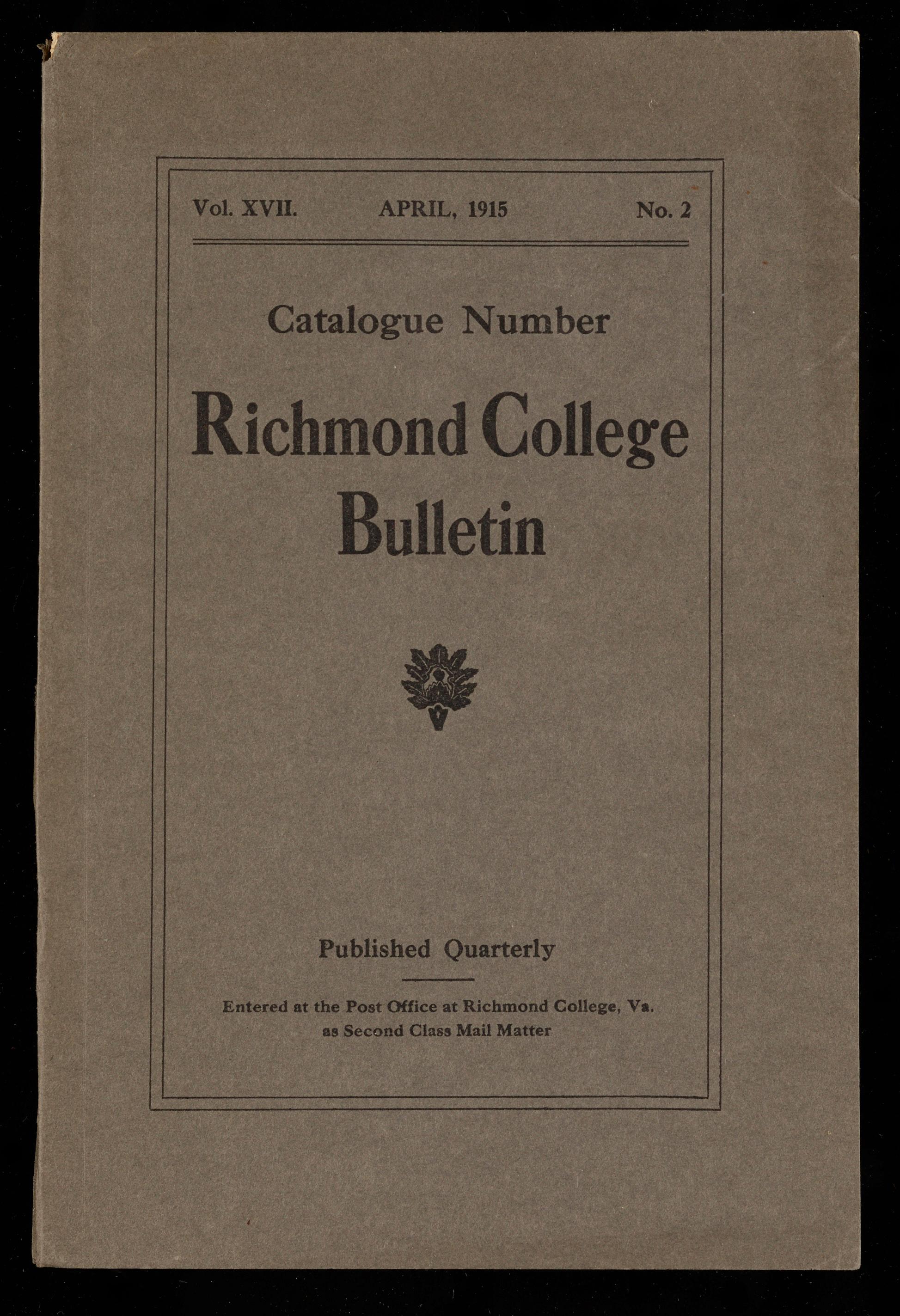
Entered at the Post Office at Richmond College, Va. as Second Class Mail Matter


Vol. XVII. APRIL, 1915 No. 2

Entered at the Post Office at Richmond College, Va. as Second Class Mail Matter


SESSION 1914 - 15 with An nouncements for SESSION 1915-16
1915
WHITTET & SHEPPERSON, PRJNTKU RICHMOND, VIRGINIA


SEPTEMBER 15, WEDNESDAY,9 :oo A. M.-Registration of new students.
SEPTEMBER16, TH URSDAY.-Session begins; registration of students.
SEPTEMBER 17, FRIDAY.-Organization of classes.
SEPTEMBER20, MONDAY,1 l :oo A . M .- First chapel assembly.
SEPTEMBER25, SATURDAY.-End of Special Examinations.
OCTOBER15, FRIDAY.-Applications for degrees.
NOVEMBER25, THuRso.w.-Thanksgiving holiday.
DECEMBER16, THURSDAY.-Examina ti ons begin.
DECEMBER 23, THURSDAY, NooN.-Close of first term.
JANUARY, TUESDAY,9 :oo A. M.-Second term begins. FEBRUARY22, TUESDAY,HALF HoLIDAY.-Washington's birthday.
MARCH 4, SATURDAY.-Founders' Day.
MARCH 16, THURSDAY.-Examinations begin.
MARCH 24, FRIDAY, NooN.-Close of second term.
MARCH 28, TUESDAY,9:00 A. M.-T hird term begins.
MAY 1, MoNDAY.-M. A. Theses hand ed in.
MAY 20, THURSDAY.-Senior examinations begin.
MAY 27, THURSDAY.-Regular examinations begin.
JUNE 4, SUNDAY, II :oo A. M.-Bacca laureate Sermon .
JUNE 5, MoNDAY.-Class Day Exercises.
JUNE 6, TuESDAY.-Annual Meeting of Trustees, Alumni Reunions.
JUNE 7, WEDNESDAY,IO :30 A. M.-Commencement Day.
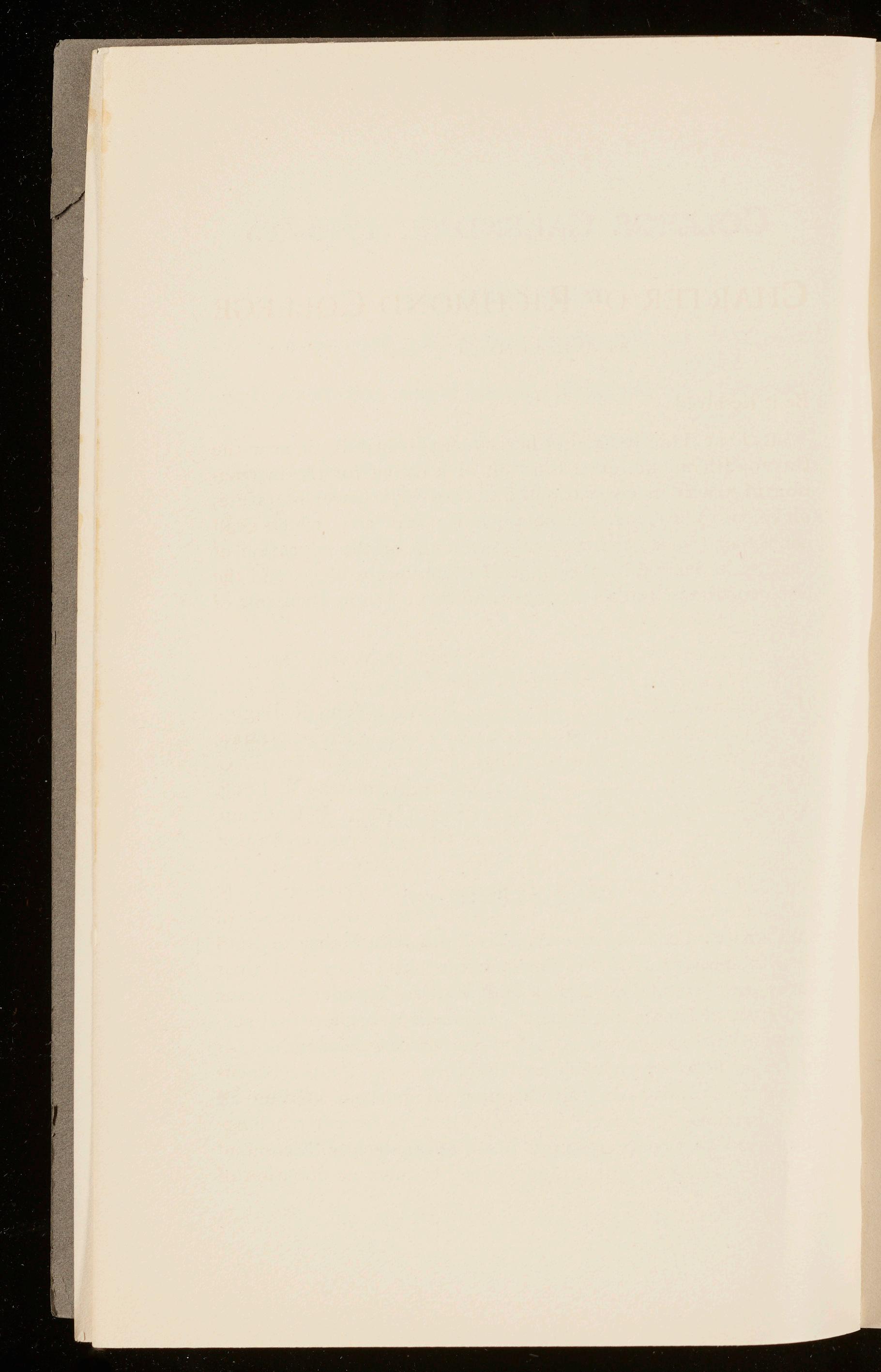
(As AMENDED MARCH 3, 1914)

Be it Resolved:
r. That there be, and is hereby established at, or near the City of Richmond, an institution of learning for the instruction of youth in the various branches of science, literature, philosophy, law, and the liberal and useful arts, which shall consist of two co-ordinate colleges, one for the education of men, to be known by the name of Richmond College, and the other for the education of women, to be known by the name of "Westhampton College."
2. That A. R. Courtney, C. H. Ryland, H. Wythe Davis, C. T. Watkins, J. A. C. Chandler, J. Hunt Hargrave, R. H. Pitt, H. L. Schmelz, H. W. Straley, Geo. B. West, John R. Bagby, J. J. Montague, J. M. Pilcher, C. R. Sands, George Swann, George W. Bea l e, J. Taylor Ellyson, John T. Griffin, T. C. Williams, Jr., B. T. Gunter, W. C. James, Armistead R. Long, A. J. Montague, R. C. Williams, W. W. Baker, J. L. Camp, Livius Lankford, A. W. Patterson, George Braxton Taylor, William L. Ball, S. C. Mitchell, T. B. McAdams, G. W. McDaniel, C. E. Nicol, W. R. Barksdale, T. S. Dunaway, I. B. Lake, C. V. Meredith, and George B. Steel, the trustees of said institution now in office, are to continue therein until their respective terms of office expire, and they and their successors are, and shall be a body corporate under the name and style of Richmond College, who shall have perpetual successsion and a common seal; may sue or be sued, implead, or be imp leaded; may receive and hold property for the benefit of said institution, in said name receiving and holding all rights, claims, privileges, and appurtenances formerly belonging, or in anywise pertaining to "the Trustees of Richmond College;" and any gift, grant, devise, bequest or donation of

RICHMOND COLLEGE CATALOGUE
property to said Westhampton College shall be effective to vest the title to said property in said body corporate, to be held for the benefit of said College. And the said trustees may receive donations, bequests and devises, or, in their discretion, purchase and hold property, real and personal, in any county or corporation of this Commonwealth, and use and control the same for ,educational purposes in the founding and maintaining of schools or academies, under such rules and regulations as the said trustees may prescribe.
The said trustees shall have power to appoint and remove officers for their own body, and administrative officers and a faculty, or faculties of instruction for said Colleges, and to regulate all fees and salaries. They shall also have power to make by-laws and regulations not contrary to the laws of the land. Any seven trustees shall form a quorum, and a less number may adjourn from time to time until a quorum be had.
3. The said trustees, or any seven of them, are hereby authorized and empowered to confer honors and degrees upon such persons as in their opinion shall merit the same, in as ample a manner as any other college in this State, and under the corporate seal, to grant testimonials thereof.
4. The said trustees shall elect a treasurer, who shall give bond with approved security, payable to said corporation, and conditioned on the faithful discharge of the duties of his office, upon default in which he may be proceeded against in th-2 appropriate court by motion upon ten days' notice, or other · wise as the law may provide.
5. The number of trustees shall never be less than twentyf'our, nor more than forty, and they shall hold office for a term of eight years, one-eighth in number, as nearly as practicable, being elected annually, as at present; but elections to fill a vacancy shall be for the unexpired term, and all election:, shall be made by the Board of Trustees from a list of persons nominated to it by the Baptist General Association of Virginia, through its Education Board.

Any trustee may be removed, and the vacancy thereby created filled for the unexpired term by the Board of Trustees at any annual or stated meeting, not less than ten of the trustees being present and concurring in such action.
There shall be annual and other stated meetings of the trustees at such time and place as their by-laws shall prescribe, and there may be special meetings at the call of their presiding officer, or any three trustees, due notice of all such meetings being given.
6. The said trustees are hereby authorized and required to admit to instruction in all the classes of the College for men, free of all charges except board, and in all respects upon terms of equality with other students, all ministers and preachers and candidates for the ministry belonging to the denomination of Christians called the Regular Baptists, who may be recommended by the Education Board of the Baptist General Association, in which Board are vested all the rights , properties, privileges, powers, duties and obligations of the Virginia Baptist Education Society; and the said trustees may also admit gratuitously such other students as they may think proper .

LIEUTENANT-GOVERNOR
J. TAYLOR ELLYSON PRESIDENT
A. W. PATTERSON, ESQ.
VICE-PRESIDENT
CLASS ONE
Term expires June, 1915
J. HUNT HARGRAVE,EsQ ... Chatham
R. H. PITT, D. D., LL. D., Richmond
H. w. STRALEY,ESQ., Princeton, W. Va.
GEO. B. WEST, EsQ., Newport News
CLASS TWO
Term expires June, 1916
J. J. MONTAGUE,EsQ ..... Richmond
J. M. PILCHER, D. D .... Fetersburg
C. R. SANDS, EsQ . . .... Richmond
PROF. GEO SWANN ...... Powhatan
CLASS THREE
Term expires June, 1917
GEO W. BEALE, D. D ........ Hague
JAMES D. CRUMP, EsQ Richmond
J. TAYLORELLYSON,EsQ .. Richmon<l
]No. T. GRIFFIN, ESQ P o rtsmouth
T. C. WILLIAMS, JR., EsQ, Richmond
CLASS FOUR
Term expires June, 1918
A. J. MONTAGUE,LL. D .. Richmond
R. C. \VrLLIAMS, EsQ Ri chmond
B. T. GUNTER, EsQ Accomac
W. C. JAMES, D. D Richmond
A. R. LONG, EsQ . . Lynchburg

CLASS FIVE
Term expires June, 1919
W. W. BAKER, EsQ ...... Hallsboro
J. L. CAMP, EsQ Franklin
L1vrns LANKFORD, M. D ... Norfolk
A. W. PATTERSON,EsQ., Richmond
GEO. B. TAYLOR, D. D ...... Hollins
CLASS SIX
Term expires June, 1920
REV. 'vVM. L. BALL Richmond
T. B. McADAMS, EsQ .... Richmond
C. E. NrcoL, EsQ ....... Alexandria
CLASS SEVEN
Term expires June, 1921
JUDGE w. R. BARKSDALE, .. Houston
T. S. DUNAWAY, D. D., Fred'burg
I. B. LAKE, D. D ....... Upperville
C. V. MEREDITH, EsQ .... Richmond
GEO. B STEEL, ESQ...... Richmond
CLASS EIGHT
Term expires Jun e 1922
J. A. C. CHANDLER,Ph. D., Rich'd
C. T. WATKINS, EsQ Richmond
R. S. BARDOUR,EsQ., South Boston
T. C. SKINNER, D. D .... Richmond

RICHMOND COLLEGE CATALOGUE
{NSTRUCTION.-J. M. Pilcher, W. L. Ball, A. J . Montague, W. C. Jam es, A. R. Long, G. B Taylor, J. A. C. Chand ler.
LAW ScHOOL.-A. W. Patterson, T. C . Williams, Jr. , C. V. Meredith, B. T. Gunter, W. R. Barksdale.
LIBRARY-}. D. Crump, A. J. Montague, George B. Steel, Professors Metcalf and Anderson.
FINANCE.-T C. Williams, Jr., A. W. Patterson, T. B. McAdams, J. L. Camp, R. C. Williams, J. D . Crump
GROUNDSAND Bu1LDINGs.-J. J. Montague, C. T. Watkins, W. W. Baker, Conway R. Sands, W. L. Ball, R. C. Williams.
Arn FUNDS (Scholarships and Donations).-R. H. Fitt, R. S. Barbour, J. H. Hargrave, A. R. Long, G. W. Beale.
ENDOWMENT.-G. B. We st, J. T. Griffin, T . C. Williams, Jr., H. W. Straley, R. H. Pitt, R. S. Barb our AcADEMIES.-vV. R. Barksdale, C. E. icol, George Swann, Livius Lankford, G. B. Taylor.
NOMINATIONOF NEW TRUSTEES.-W. C. James, A. W. Patterson, R. H. Pitt, J. A. C. Chandler, A. R. Long.
NOMINATIONFOR HONORARYDEGREES.-G. W. Beale, I. B. Lake, J. H. Hargrave, T. S. Dunaway, R. E. Loving.
RICHMONDAcADEMY.-R. H. Pitt, T. B. McAdams, J. J. Montague, C. T. Watkins, T. C. Skinner.
v\TOMAN'sCOLLEGEOF RICHMOND.-J. A. C. Chandler, A. W. Patterson, J. D. Crump, T. C. Skinner, W. L. Ball.
The By-Laws provide that the President of the Trustees and the Secretary shall be members of all the above committees, and have equal privileges with other members; and that the President of the College shall be ex-officio a member of all except Nomination of New Trustees.
PRUDENTIALCOMMITTEE.-}. Taylor Ellyson, F. W. Boatwright, J. A. C. Chandler, W. C. James, J. C. Metca l f, May L. Ke ll er.

FREDERICKWrLLUM BOATWRIGHT,LL. D., President.
JOHN CALVIN METCALF,Litt. D., Dean.
BENJAMIN \tV1.:sT TABB, B. A., Treasurer and Registrar.
CHARLESIIENRY ·wrnsTON, M. A., LL. D., Emeritus Professor of Physics and Professor of Astronomy.
A. B. Hampden-Sidney, i854; l\f. A. University of Virginia, 1857; LL. D. Hamp<len-Sidney, i883; Assistant Profes sor, HampdenSidney, 1854-'55; Profe ssor Transylvania, University 1857.-'58; Pre s ident Richmond Female Institute, 1859-'73; Professor of Phy s ics, 1873-i908: Professor of Astronomy since 1873
FREDERICK\tVcLLIAMBOATWRIGHT,M . A., LL. D , Professor of Modern Languages.
M. A Richmond College, 1888; LL. D. Mercer University, 1895; LL. D. Ge o rgetown College, 1913; Assistant in Greek, Richmond College, 1887-'89; Student University of Halle and of the Sorbonne, 1889-'90; Professor of French and German since 1890; Student University of Leipsic, 1892; President since 1894.
ROBERTEDWIN GAINES, M. A., Litt. D., Professor of Mathematics.
M. A. Furman University, 1886; Litt. D. Furman University, 1go8; Instructor in Furman UniYersity, 1882-'87; Student Johns Hopk ins University, 1887-'88; Instructor in Wright's University School, Baltimore, 1888-'Sg; Harvard University, 1899-1900; Professor of Mathematics since rSgo.
WILLIAM ASBURY HARRIS, M . A., Ph. D., Professo r of Gree k.
M. A. Richmond College, r886; Ph. D. J oh n s Hopkins U n iversity, i 8g2; Professo r o f Gr eek, Bay l or U n iversity, 1893-190 1 ; Professor of Gree k sin ce 1901.

JoHN CALVINMETCALF,M. A., Litt. D., Professor of English on the James A. Bostwick Foundation.
B. A., M. A. Georgetown College; M. A. Harvard University; Litt. D. Georgetown; Graduate Student, Chicago and Harvard; Professor of Modern Languag es, Mercer University; Professor of Latin, and later, of English, Georgetown College; Professorial Lec tur er, University of Chicago; Professor o f English, University of Virginia Summer School, since 19n; Professor of English since 1904.
ROBERTARMISTEADSTEWART, M. A., Ph. D., Professor of Romance Languages.
M. A. University of Virginia, 1899; Ph. D. University of Virginia . 1901; Professor of Modern Languages, Wofford College, 1899-1900; Instructor of Teutonic Languages, University of Virginia, 1900-'01 Assistant Profes so r of Modern Languages, Tulane University 1901-'02; A ssoc iate Professor, 1903-'12; Professor of Romance Languages since 1912.
WALTERScoTT McNEILL, B. A., Ph. D., LL. B., Professor of Law.
B. A. Richmond College, 1899; Ph. D. University of Berlin, 1902; LL. B. Harvard University, 1905; Associate Professor of L;i\' 190.9-'09; Professor of Law since 1909.
EUGENECooK BINGHAM,A. B., Ph. D., Professor of Chemistry.
A. B. Middlebury College, 1900; Ph. D. Johns Hopkins University, 1905; Student of Universities of Leipsic and Berlin, 19o6; Profe,sor of Chemistry since 19o6.
ROBERTEDWARDLovrnc, M. A., Ph. D., Professor of Physics.
M. A. Richmond College, 1898; Fellow Johns Hopkins University, 1901-'02; Ph. D., ibid., 1905; Professor of Physics and Chemistry Blackburn College, 1905-'06; Profe sso r of Physics Cornell College 1906-'07; Associate in Physics University of Missouri, 1907-'08; Professor of Physics since 1908.
Drrn ROBINS ANDERSON,M. A., Ph. D., Professor of History and Political Science.
B. A. Randolph-Macon College, 1900; M. A ., ibid., 1901; Ph. D Univers ity of Chicago, 1913; Principal Randolph-Macon Academy 1903-'05; Presi~ent of Willie Han sel College (Okla.), 1905-'06; Instructor m History at University of Chicago, 1907-'09; Professol of History and Political Science since 1909.
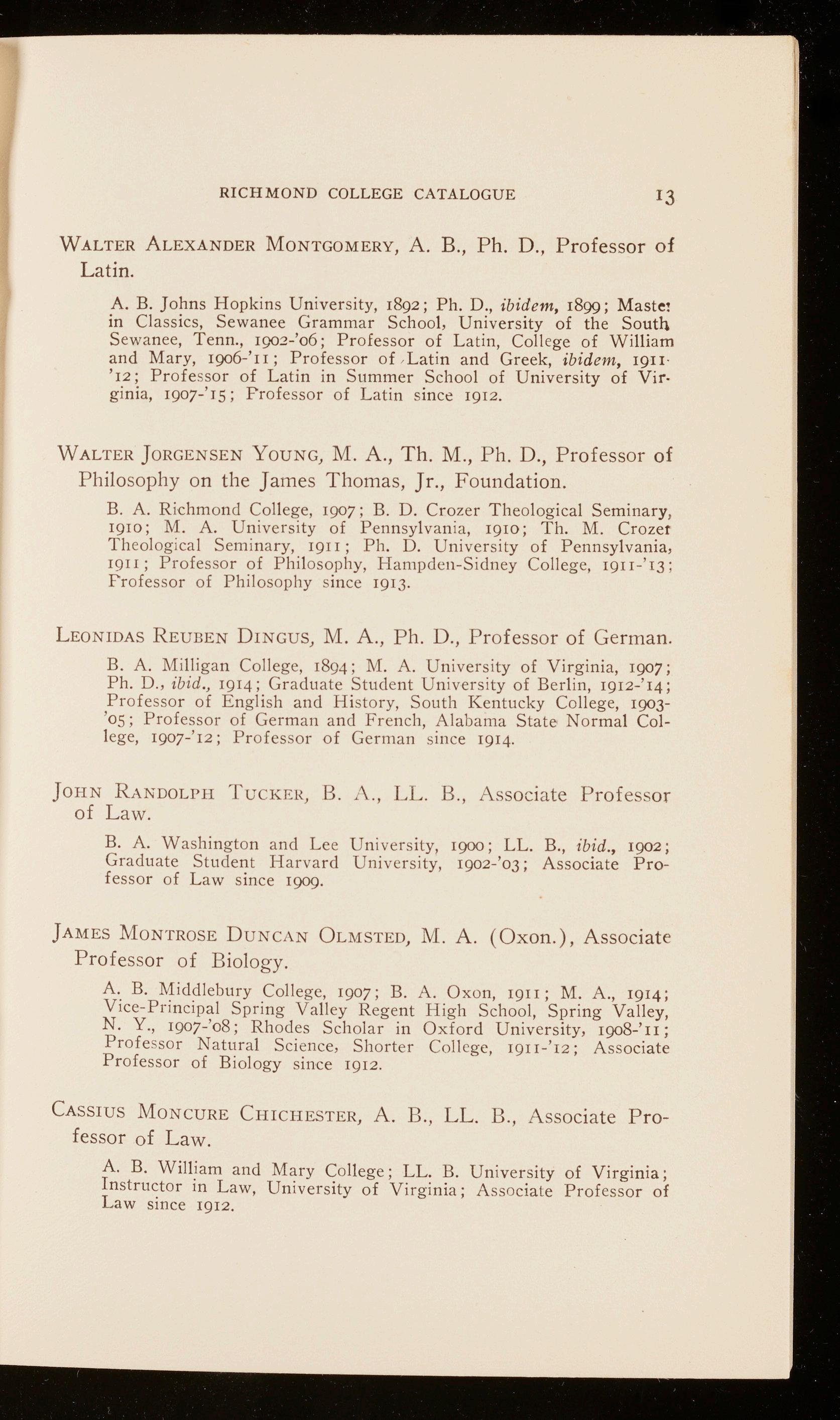
WALTERALEXANDERMONTGOMERY,A. B., Ph. D., Professor of Latin.
A B. Johns Hopkin s University, 1892; Ph. D., ibidem, 1899; Mastc! in Classics, Sewanee Grammar School, University of the South S ewa n ee , Tenn., 1902-'06; Pr o fessor of Latin, Coll ege of William and Mary, 1906-'II; Professor of , Latin and Greek, ibidem, 19II'12; Professor of Latin in Summer School of University of Virginia, 1907-'rs; Professor of Latin s ince 1912.
WALTERJORGENSEN YouNG, M.A., Th. M., Ph.D., Professor of Philosophy on the James Thomas, Jr., Foundation.
B. A. Richmond College, 1907; B. D. Crozer The ological Seminary , 1910; M. A. University of Pennsylvania, 1910; Th. M. Crozer Theological Seminary, 19II; Ph. D. University o f Pennsylvania, 19u; Professor of Philosophy, Hampden-Sidney College, 191 1-'13; Professor of Philosophy s in ce 1913.
LEONIDASREUBEN DINGUS, M. A., Ph. D., Professor of German.
B. A. Milligan College, 1894; M. A. University of Virginia, 1907; Ph. D., ibid ., 1914; Graduate Student University of Berlin, 1912-'14; Professor of English and History, South Kentucky College, 1903'05; Professor of German a nd Fre n ch, Alabama State Normal College, 1907-'12; Professor of German since 1914.
JoHN RANDOLPH TucKER, B. "'\., LL. B., Associate Professor of Law.
B. A. Washington and Lee University, 1900; LL. B., ibid., 1902; Graduate Student Harvard University, 1902-'03; Associate Professor of Law s in ce 1909.
JAMES MONTROSEDUNCAN OLMSTED,M. A. (Oxon.), Associate Professor of Biology.
A. B. Middlebury College, 1907 ; B. A. Oxon, 1911; M. A., 1914; Vice-Principal Spring Valley Regent High School, Spring Valley, N. Y., 1907-'08; Rhodes Scholar in Oxford University, 1908-'II; Profe sso r Natural Science, Shorter College, 191 r-'12; Associate Professor of Biology since r9r2.
CASSIUSMONCURECHICHESTER,A. B., LL. B., Associate Professor of Law.
A. B. William and Mary College; LL. B. University of Virginia; Instructor in Law, University of Vircrinia · Associate Professor of Law since 19r2. "' '

RICHMONDCOLLEGECATALOGUE
THOMAS JusTIN MooRE, B. A., LL. B., Associate Professor of Law.
B. A. Richmond College, 1go8; LL. B. Harvard University, 1913; In structor in Richmond Academy, 19o8-'IO; Associate Professor of Law since 1913.
HENRY BRANTLEY HANDY, M. A., Associate Professor of English.
B. A. Richm o nd College, 19o6; :M. A. ibid., 1908; A. M. Harvard University, 1913; In structor in English, Richmond Academy, 1906'1 1 and 1913-'14.
ROBERTWILLIAM DURRETT,M. A., Associate Professor of Latin and Greek.
B. A. Richmond College, 1898; M. A., ibid., 1899; A. M. Harvard University, 1905; Instructor in Latin in High Schools, 1899-1904; Principal Welsh N eek ( S. C.) High School, 1906-'oS; In st ructor in Latin Richmond Academy, 1909-' 14.
WALLACEFRANK PowERS, A. M., Ph. D ., Associate Professor of Physics and Mathematics.
A. B. Clark College, 19w; A. M. Clark University, 19II; Fellow, ibid., 1911-'14 ; Fh. D., ibid., 1914; In s tructor in Laboratory Physics, Clark University, 19u-'14.
JAMES WILLIAM NORMAN, M. A., Associate Professor of Education and Philosophy.
B. A. Mercer University, 1906; M. A. Harvard University, 1912; Professor of Mathematics and Education, Howard College, 1907-'IO ; Exchange Instruct or Charlottenburg Oberr ealesc hule, 1912-'13; Graduate Stud ent Columbia University, 1913- ' 14.
HAMILTONJAMES ECKENRODE,A. B., I h. D., Associate Professor of Economics and History.
A. B. Fredericksburg Collegf!: Student University of Virginia; Ph. D. Johns Hopkins University; Professor of Hi story, Arizona Norma:! School ; Archivist Virginia State Library.
SAMUELHUNTINGTONTEMPLEMAN,M A .. Acting Professor of English Bible.
B. A. Richmond College, 1904; M. A., ibid., 1905; Graduate Colgate University, 1go8; Student Columbia University, winter 1908, Department of Sociology; Studied at Union Theological Seminary, Richmond, Va., 19I0-'II, 19u-'.12.

FRANK RosE ELDER, B. S., M. A., Associate Professor of Chemistry.
B. S. Amherst, 1911; M. A. Columbia, 1913; Assistant in Organic Chemistry, Columbia University, 1911-'12.
FRANK ZENAS DROWN,S. B. E. E., Instructor in Drawing.
B. S. Virginia Military Institute, 1900; S_. B. E .. E. Massachu~e~ts Institute of Technology, 1903; Instructor 111 Physics and Electricity Virginia Mechanics Institute since 1903; Instructor in Drawing since 1904.
JAMES HENRY KtMHALL, l\L A., Lecturer on i\Jcteorology.
B. S. Michigan Agricultural College; M. A. Richmond College; W eather Ob server, United States Weather Bureau, Richmond.
MARrONGARNETTRYLA D, B. A., B. S., Librarian.
B. A., B. S. Columbia University.
JEssm M. Wooo, B. A., Assistant to the Librarian.
CLYDECANNONWEBSTER,B. A., Assistant in English.
WILLIAM HERBERTBAHLKE, Laboratory Assistant in Chemistry.
ANDREW NEWTON WILKINSON, B. A., Laboratory Assistant m Chemistry.
KARL BROOKEANDERSON,Laboratory Assistant in Biology.
CRAWFORDCURRY CROUCH, Laboratory Assistant in Physics.
ROBERTLANCELOTBURRUSS,Laboratory Assistant in Physics.
FRANK MILLS DOBSON,Director of Athletics.
EDWARDC. JAMES, Litt. D., Head of College Refectory and Purchasing Agent.
COURSESAND DEGREEs.-Professors Gaines, Loving, Montgomery, and Handy.
ATHLETlCS.-Professors Harris, Olmsted, and Handy. FRATERNlTIES.-Professors Bingham, Montgomery, and Stewart. PuBuc LECTURES.-Profe ssors Anderson, Young, and Durrett. STUDENTL1FE.-Professors Anderson, Loving, and Gaines. STUDENTPuBLICATlONs.-Professors Montgomery, Dingus, and Norman. STUDENTAPPOINTMENTS.-Frofessors Loving, McNeill, and Brown. Ar.UMNl.-Professors Loving, Harris, and Bingham. The President and the Dean are ex-officio members of all committees.
RICHMOND COLLEGE CATALOGUE
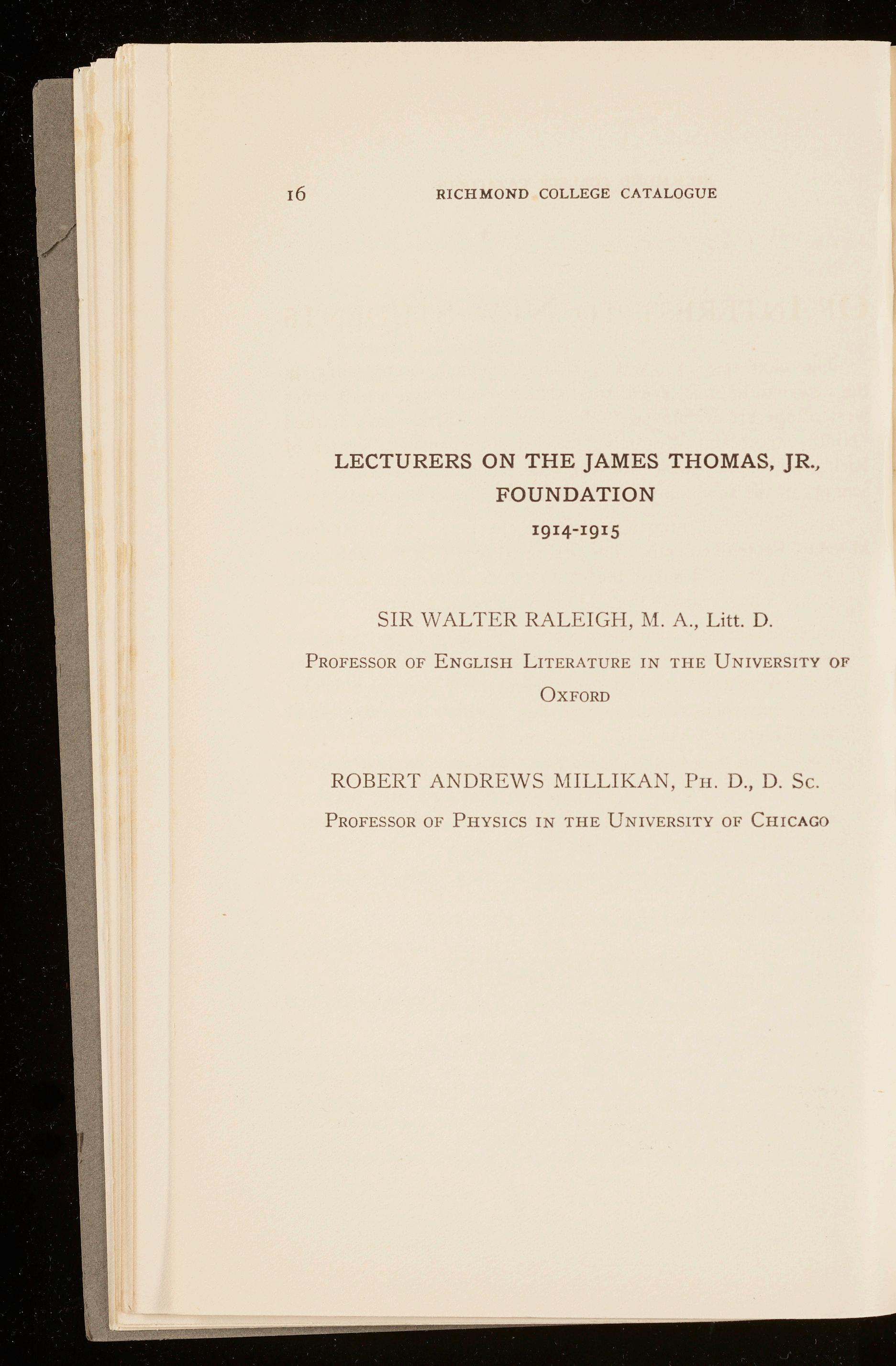
SIR WALTER RALEIGH, M.A., Litt. D.
PROFESSOR OF ENGLISH LITERATURE IN THE UNIVERSITY OF OXFORD
ROBERT ANDREWS MILLIKAN, Pu. D., D. Sc .
PROFESSOR OF PHYSICS IN THE UNIVERSITY OF CHICAGO

The next session opens Thursday, September 16, 1915, in the new buildings at Westhampton Park, three and a half miles west of the old Richmond College campus. Street cars marked "Ninth Street and Westhampton" leave the business center of Richmond, usually on a fifteen minute schedule, and deliver passengers in the new college grounds. The fare is five cents.
The College dormitories open for the reception of students Monday, September 13th. The first meal served at the Refectory will be supper on Monday, the 13th. Students are advised not to arrive at College earlier than Monday, September 13th.
Students furnish their own rooms. A large supply of good second-hand furniture is offered for sale at the College by the Y. M. C. A. at low rates, so that students will have no difficulty in furnishing their rooms on the day of their arrival. Small articles like pillows, blankets, sheets and towels are often brought from home, but may be purchased after arrival. Single bedsteads are used in all rooms.
Rooms in the dormitories will be assigned whenever application is made. Application should be made to the Dean of Richmond College. Au advance deposit of $rn.oo is necessary in order to hold a particular room. Checks should be made payable to B. West Tabb, Treasurer.
Matriculation begins Wednesday, September 15th. Classes meet for organization Friday, September 17th.
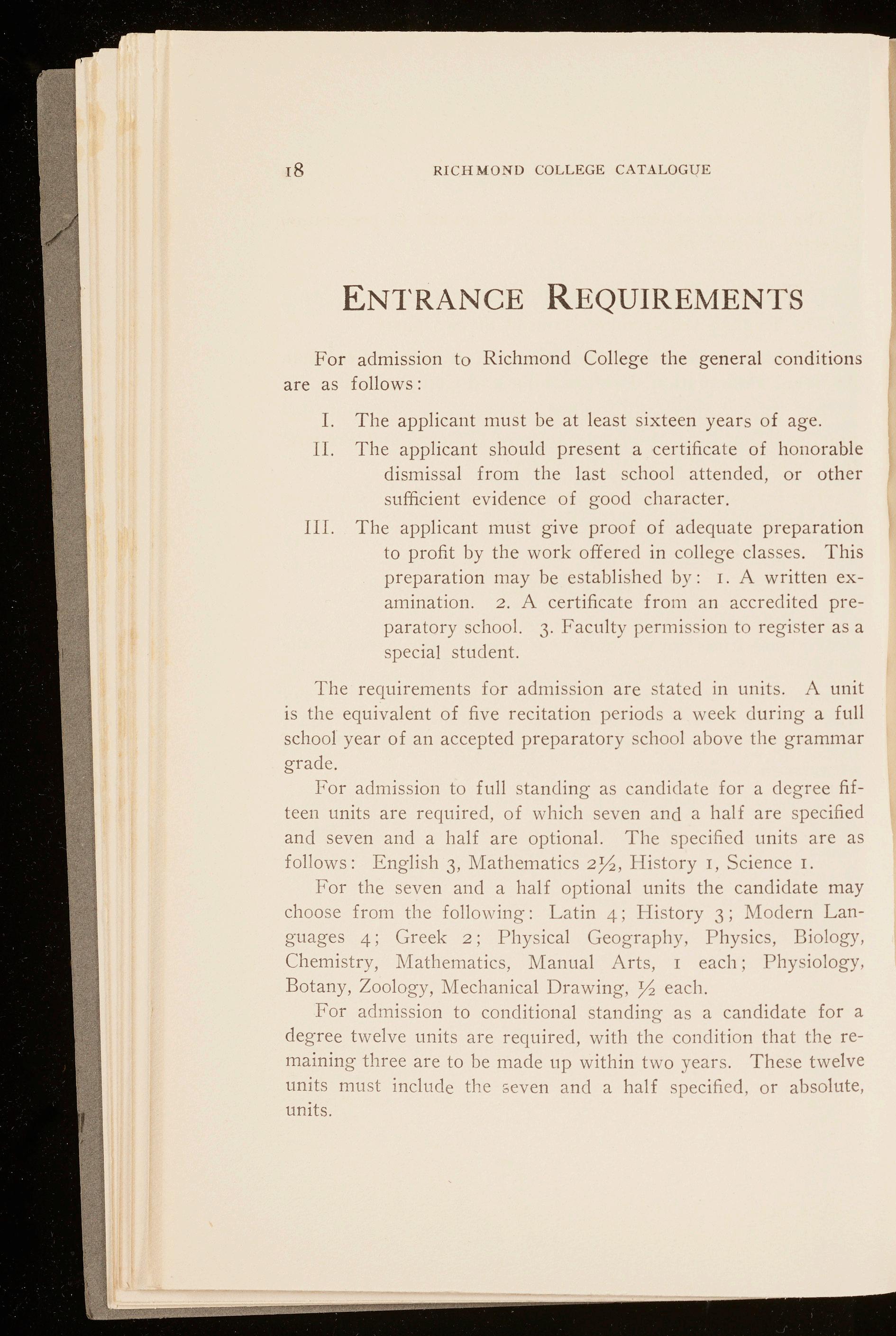
For admission to Richmond College the general conditions are as follows :
I. The applicant must be at least s ixteen years of age.
II. The applicant sho uld present a certificate of honorable dismissal from the last sc hool attended, or other sufficient evidence of good character.
III. The applicant must give proof of adequate preparation to profit by the work offered in college classes. This preparation may be established by: r. A written examination. 2. A certificate from an accredited preparatory school. 3. Faculty permission to register as a special student.
The requirements for admission are stated in units A unit is the equivalent of five recitation periods a week during a full school year of an accepted preparatory school above the grammar grade.
For admission to full standing as candidate for a degree fifteen units are required, of which seven and a half are specified and seven and a half are optional. The specified units are as follows: English 3, Mathematics 21/z, History I, Science r.
For the seven and a half optional units the candidate may choose from the following: Latin 4; History 3 ; Modern Languages 4; Greek 2; Physical Geography, Physics, Biology, Chemistry, Mathematics, Manual Arts, r each; Physiology, Botany, Zoology, Mechanical Drawing, ¼ each.
For admission to conditional standing as a candidate for a degree twelve units are required, with the condition that the remaining three are to be made up within two years. These twelve units must include the seven and a half specified, or absolute, units.
The followin g s tatem ent indi cate s the am ount o f preparation expecte d in ea ch subject:
r. English. -T hr ee unit s ; a ll requir ed.
The E n g li s h r eq uir e m e nt s con s is t o f t w o part s :
(a) E n g li s h G r a mmar a nd Rh etori c, including Grammar , Ana lysis, P un ct u at io n , Par ag raphin g and Composition
(b) The r ead ing co ur se a n d th e co ur se in s p ecia l s tudy and prac t ice adopted by t h e Associa ti o n o f Co ll eges a nd Pr ep a rato r y Schoo ls o f t h e So uth ern Sta t es.
The fo ll owing a r e th e co ur ses ass igned by th e Assoc iat io n for entrance requi r ements in E n g lis h :

A. READING.
The aim of this course is to foster in the student the habit of in telligent reading and to de,·elop a taste for good literature, by giving hi m a first-hand knowledge of some of its best specimens He should read t h e books carefully, but his attention should not be so fixed upon detai l s tha t he fails to appreciate the main purpose and charm of what he reads.
With a view to a great freedom of choice, the books provide d fo r reading are arranged in the following groups, from which at least ten selections are to be made-two from each group :
Group I. (two to be selected) The Old Testatment, comprisi n g a t least the chief narrative episodes in Genesis, Exodus, Joshua, J udges, Samuel. Kings, and Daniel together with the books of R uth and Esthe r ; Homer's Odyssc:,', with the omission, if desired, of Books I. , II ., III., IV ., V., XV., XVI., XVII.: Homer's Iliad, with the omission, if desire d , of Book s XI., XIII., XIV., XV., XVII., XXI.; Vergil's Aeneid The Odyssey, Iliad, and Aeneid should be read in English translations of recognized literary excellence.
(For any selections from this group a selection from any other group may be submitted )
Group II. ( two to be selected) .-Shakespeare's Merchant of Venice, Mi~summer Night's Dream, As You Lilw It, Twelfth Night, Henry V., Julms Caesar.
Group III. ( two to be selected) .-Defoe's Robinson Crusol', Part I.; Goldsmith's Vicar of Tilakcficld; Scott's Iva11hoe, or Quentin Diwward; Hawthorne's House of the Seven Gables; Dickens' David Copperfie ld, or Tale of Two Cities; Thackeray's Henry Esmond; Mrs. Gaskell's Cranford; George Eliot's Silas Marner; SteYen son 's Treasurr lsla11d.

Group IV. (two to be selected).-Bunyan·s Pilgrim's Progress, Fart I.; the Sir Roger de Coverley Papers in the Spectator; Franklin's Aittobiography (condensed); Irving's Sketch Book; Macaulay's Essay on Lord Clive, and Essay on Warren Hastings; Thackeray's E11glish Humorists; Selections from Lincoln, including at least the two Inaugurals and Lincoln's Speeches in Independence Hall and at Gettysburg , Last Public Address, Letter to Horace Greely, along with a brief memoir or estimate; Parkman's Oregon Trail; Thoreau's Walden, or Huxley's Autobiography, and Selections from Lay Sermons, including the addresses on improving Natural Knowledge, A Liberal Education, and A Piece of Chalk; Stevenson's inland Voyage, and Travels with a Donkey.
Group V. ( two to be selected) .-Palgrave's Golden Treasury (First Series), Books II. and III., with especial attention to Dryden, Collins, Gray, Cowper and Burns; Gray's El<'gy in a Coimtry Churchyard; Goldsmith's Deserted Village; Coleridge's Ancient Mariner; Lowell's Vision of Sir Launfal; Scott's Lady of the Lake; Bryon's Childe Harold, Canto IV., and the Prisoner of Chillon; Palgrave 's Golden Treasury (First Series) Book IV., with especial attention to Wordsworth, Keats, and Shelley; Poe's Raven; Longfellow's Courtship of Miles Standish, and Whittier's Snow Bound; Macaulay's Lays of Ancient Rome, and Arnold's Sohrab and Rustum; Tennyson's Gareth and Lynette, Lancelot and Elaille, and The Passing of Arthur; Browning's Caval-ier Tunes, The Lost Leader , How They Brought the Good News from Ghent to Ai.x, Home Thoughts from Abroad, Home Tho ughts from the Sea, Incident of the French Camp, Herve Riel, Pheidippides, My Last Duchess, and Up at a Villa -Down in the City.
B. STUDY.
This part of the requirement is intended as a natural and logical continuation of the student's earlier reading, and greater stress is laid upon form and style, the exact meaning of words and phrases, and the understanding of allusions.
Shakespeare's Macbeth; Milton's L'Allegro, fl Penseroso, and Camus; Burke's Speech on Conciliation with America; or both Washington's Farewell Address and Webster's First Bu11!?er Hill Oration; Macaulay's Life of Johnson; or Carlyle's Essay on Burns.
2. Mathematics.-The first two and a half of the following units are required, the others optional :
(a) Algebra to Quadratics, one unit.
(b) Advanced Algebra through progressions, one-half unit.
(c) Plane Geometry, one unit.
( d) Solid Geometry, one-half unit.
( e) Trigonometry, one-half unit.
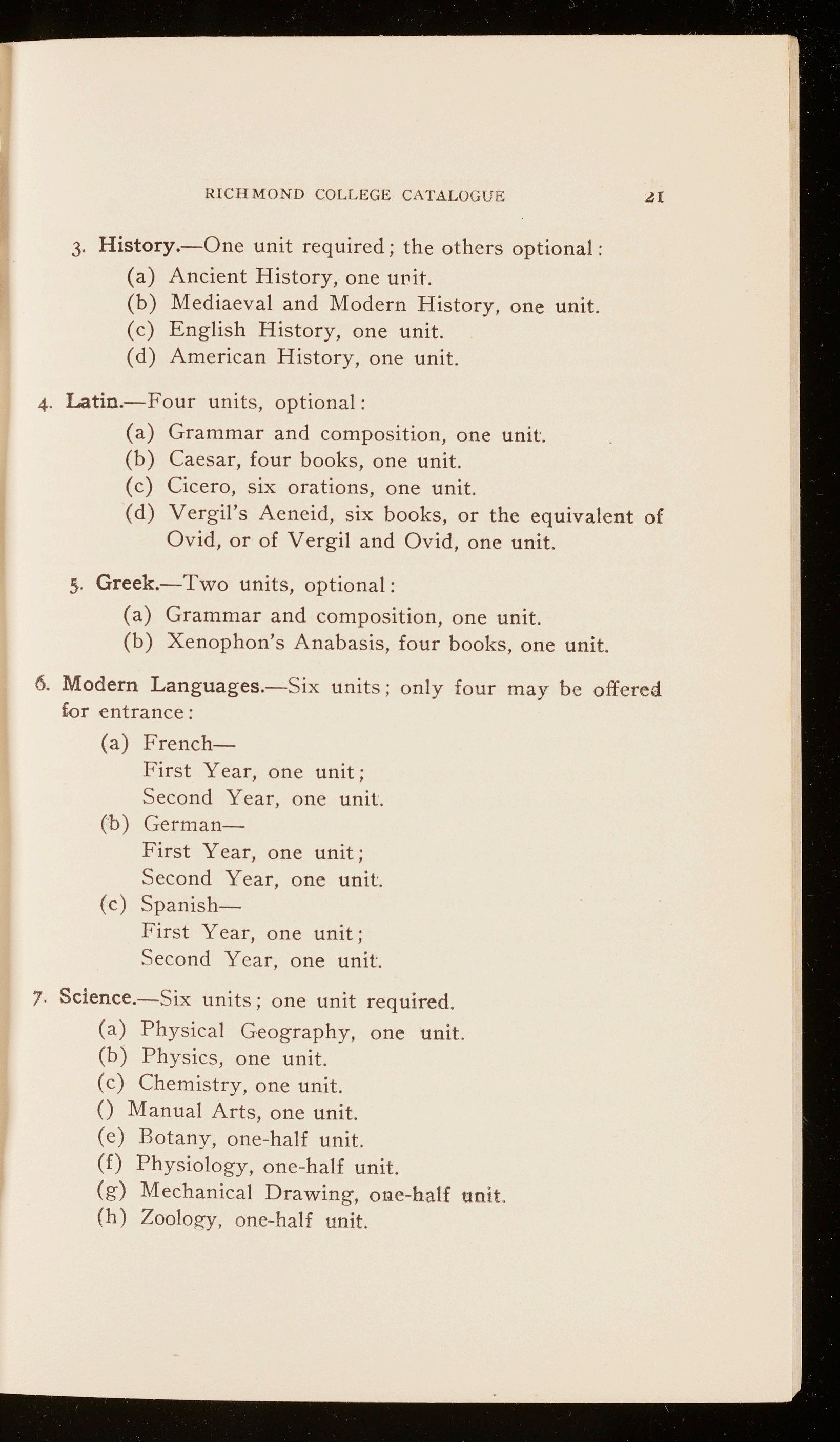
3. History.-One unit required; the others optional:
(a) Ancient History, one m,it.
(b) Mediaeval and Modern History, one unit.
( c) English History, one unit.
(d) American History, one unit.
4. Latio.-Four units, optional:
(a) Grammar and composition, one unit.
(b) Caesar, four books, one unit.
(c) Cicero, six orations, one unit.
(d) Vergil's Aeneid, six books, or the equivalent of Ovid, or of Vergil and Ovid, one unit.
5. Greek.-Two units, optional :
(a) Grammar and composition, one unit.
(b) Xenophon's Anabasis, four books, one unit.
6. Modern Languages.-Six units; only four may be offered £or entrance :
(a) FrenchFirst Year, one unit; Second Year, one unit.
(b) GermanFirst Year, one unit; Second Year, one unit.
(
c) SpanishFirst Year, one unit; Second Year, one unit.
7. Science.-Six units; one unit required.
(a) Physical Geography, one unit
(b) Physics, one unit.
(
c) Chemistry, one unit.
() Manual Arts, one unit.
(e) Botany, one-half unit.
(£) Physiology, one-half unit
(g) Mechanical Drawing, one-half unit .
(h) Zoology, one-half unit

In subjects which imply laboratory work, such as Physics and Chemistry, two hours of laboratory ,,·ork are estimated as the equivalent of one hour of recitation. The candidate's labor a- tory note-book must be subm itted for in spectio n.
No College credit will be given for Latin, French, German , or Spanish, accepted a , units for entrance.
vVhen an academy or high school furnishes evidence to the President of the College that it gives thorough college prepara- tory training to its students, it may be included in the list of accredited schools. A certificate of its principal filled out on a form provided by the College will then be accepted as a guarantee of the fulfilment of satisfactory entrance requirements. \iVithout such certificate the applicant must secure a statement from th e College committee on courses and degrees that he has success- fully passed the entrance examinations or that he ha s been ad- mitted as a spec ial student.
The courses of s tudy in the variou departments are open to any student of mature age (twenty :vears or over) who gives satisfactory evidence of fitness to pursue the particular course which he may elect, although he may n ot have passed the entrance examination. A special st udent may become a candidate for a degree only by sa tisfying the regular requirements for admission. To be recommended for a degree he must have b ee n registered as a candidate for that degree at least one session.
Entrance examinations will be held at the Co1!ege on the last two days of the session (June 2d and 3d), and on the two days immediately preceding the opening of the n ew session. These examinations will be given at the College September 14 and IS, r915. Similar examinations will also be held in the principal cities

of Virginia, and at other places so far as suitable arrangements can be made. Application for the holding of such an examination should be made to the President of the College not less than four weeks previous to the time at which the examination is desired.
Advanced Standing at Entrance.-Students who, by reason of their work elsewhere, are prepared to enter classes higher than the lowest, will be admitted to any advanced class by passing suc h special examination as may satisfy the professor in charge. When the work of the advanced class shall have been completed, full credit will be given for the work of the lower class or classes.
The President of the College will promptly furni sh any special information that may seem needful concerning entrance.
Every applicant for admission, upon arriving at the College, should report promptly at the Dean's office. If he has been a student at any other college, he should pre se nt a detailed certificate of work accomplished there, as well as a statement in regard to his character. If he comes from an academy or hi g h schoo l, he should bring with him, in case he has not already sent it, an admission certificate duly filled out and signed by the principal of the schoo l he last attended.
When the question of preparation for college has been settled affirmatively before the Committee on Co urses and Degrees, he wi]] receive a permit to matriculate. After this has been approved by the Dean it should be presented to the Treasurer and Registrar of ti1e College, who, upon payment of the required fees, will record his name as a regular matriculate. Students who delay th eir matriculation longer than forty-eight hours after obta ining a permit will be charged an extra fee of $2.00.
Attention is invitea to the wide range of studies now offered in the College. Here the student who looks forward to professional study in engineering, law, or medicine may obtain not only general training, but will also have opportunity to make special

preparation for his future work. The law student will find his special needs met in the subject treated in the departments of English, History, Economics, Political Science, and Philosophy. Similarly, the prospective student of medicine will find that the work in Biology, Chemistry, Psychology, and Physics has afforded him direct preparation for his profession. By the introduction of mechanical and free-hand drawing, and by the extension of the courses in Physics, Chemistry, and Mathematics, the College ia in position to prepare students for advanced standing in the best technical universities.

Richmond College holds membership in the Southern Association of Colleges, and undertakes to offer standard college courses o f instruction The Faculty also keeps in mind the importance of character building . Constant effort is made to promote the social and religious welfare of students .
It is believed that the new locati on o f Richm ond College is ideal for an institution of learning. The entire grounds form a park o f 288 acres just opposite the upper fall s of James River and about two mile s we st of the city limits o f Richmond. Th e campus o f the colleg e for men embrace s ab out 1 6 0 acres. Easy communication is had with the city by street cars that enter the collegeg rounds. Fare to any part of the city is five cent s . At the same time the college buildings, standing in a beautiful wooded p ark, are removed from the no ise and di s tractions o f the city str ee t s.
The building s of the college for m en have cost over $600,000 They include the library and admini stration buildings , the refectory, the two d ormitorie s, the s cience laboratori es, the auditorium, the power house , and the stadium. The ar chitecture is collegiate Gothic. The main buildings , including the dormitories, are of fireproof con s truction. All buildin gs ar e lig hted by electricity and heate d w ith hot w ater from a central h eatin g plant. W at er is supplied t o all bu ild ings fr om the city ma ins .

The deportment of a Christian gentleman is the standard to which every student is expected to conform. All appropriate means are used to develop and confirm a se n se of personal honor and sacred regard for truth, as upon these rests the best reliance for good conduct. A few plain and reasonable rules are prescribed, and each matriculate must pledge himself to obey them.
I. Occupants of rooms will be held responsible for the good order of their rooms, as well as for any damage or defacement they may sustain. o person, other than an officer of the College, has any right to enter a lodging except upon invitation of the occupants. Changes from one room to another may be allowed by the Dean, but must not be made without his previous consent.
2. A resident student desiring to leave the premises during the hours when, by the schedule of recitations, he shou ld be in his classes, shall get permission from the Dean. Any student desiring to be absent from College sha ll get the Dean's permit in writing and exhibit it to each of his professors.
3. The Facult) ' regards hazing as a serious offence against College order.
4. If a student destroy, deface, or in any way damage College property, or aid and abet others in so doing, he shall, within twenty-four hours, report the fact to the Dean. Students will be charged pro rota for all damages not individu a lly accounted for.
5. No student shall bring upon the premises or have in his possession any playing cards, intoxicating liqu ors, dogs or deadly weapons.
6. No Clubs or Societies shall be formed unless the Faculty, on application made, approve the design of suc h Association, the rules by which it proposes to be governed, and the hours of meeting-.

7. Resident students desiring to board elsewhere than on the College premises must first obtain the approval of the Dean. No boarding houses can be approved whose meal hours do not conform to the college schedule.
In the observance of the se rule s and in all matt e r s n ot specially mentioned, the deportment of a gentleman and a student is the standard lo which every o ne is expected to conform. His sense of honor is the main reliance, and hi s word in matters touching his own conduct will be called for at the discretion of the Dean or President.
\,\Thenever the President learns that a student is not improving his time, or is living disorderly, he first advises and admonishes him before any penalty is imposed, except in grave offences. Tt is neither the desire nor the purpose of the authorities to humiliate any student, but everyone must live a pure, orderly and indu strious life, or withdraw from the College.
At the end of each week each professor makes a report to the Dean of such absences on the part of students as seem to call for the Dean's attention. In case a student has a proper excuse for absence from class, he shou ld present it either to the professor himself or to the Dean. Permission to be absent from College shou ld be obtained from the Dean. Unexcused absences are marked zero on the class record and seriously reduce the scholastic standing of a st ud e nt. A few un excused absences may cause failure in a month's, or even in a term's work. A student who systematica lly absents himself from class will be dropped from the College rolls. The Faculty reo-ard this form of neo-lect of b b College duties as particularly serious, both because of its interference with scho lastic standin g and its detrimental effect on character.

If a student desires to make a change in his course of study he should make his application in person to the Dean, who will advise him in the matter. No student is permitted either to drop a study or to take up a study without the advice and permission of the Dean.
A change in a course of study later than three weeks after matriculation will not be made, except in rare cases, without the payment of a fee of $1.00 before such application for change is granted.
Students have easy access to all the advantages afforded by the various city and suburban churches, with their Bible classes and Sunday schools. Prayer meetings conducted by the students themselves are held once, or oftener every week. Vesper Services are conducted in the College Auditorium every Sunday afternoon during term time by a member of the Faculty, or by some prominent visitor. These exercises are varied from time to time by a musical program, in which solos by leading singers of Richmond form a part. A chorus choir of thirty voices, made up of students from Richmond College and Westhampton College, takes part regularly in the Vesper Services. These services, held on Sunday afternoon at five o'clock, have proved one of the most attractive features of college life.
For twenty minutes (11:00 to rr:20) each day, Monday to Friday inclusive, all classes are suspended for chapel assembly. Exercises are conducted by the President, Dean, or some other member of the Faculty; from time to time specially invited speakers may be heard on educational, civic, and religious themes. Attendance is required of all students in the College of Liberal Arts unless specially excused. Absences from chapel amounting to one-tenth of the number of assemblies each term are allowed.

PROFESSORMONTGOMERY
ASSOCIATEPROFESSORDURRETT
Three units of the standard entrance requirements as published in the catalogue are required for entrance to this department.
1. (a) READING Nepos, Selected Lives; Vergil (Aeneid I.VI.) ; Ovid (Selections).
The reading of this course will be supplemented by occasional lectures on such general subjects as Roman Biography, the ri se and development of the Roman Epic in its relation to the Greek, the lives of the authors studied, etc.
(b) P~osE COMPOSITION. Written exercises, based on model passages of Cicero, once a week throughout the session. This work will necessitate a constant study of Latin Grammar.
(c) LATIN LITERATURE. An introductory course on the history of Latin Literature. The text-book will be supplemented by lectures. Spring term. For Freshmen.
2. (a) RE.ADING. Livy ( Selections from Books I., II. and XXI.) ; Selections from Lyric Poets; Horace ( Odes and Epodes).
Appropriate lectures will be given and themes required on Roman Historiography and the history of Roman Lyric Poetry.
( b) PnosE COMPOSITION. W eeldy exercises, based on Livy and Cicero; occasional original compositions.
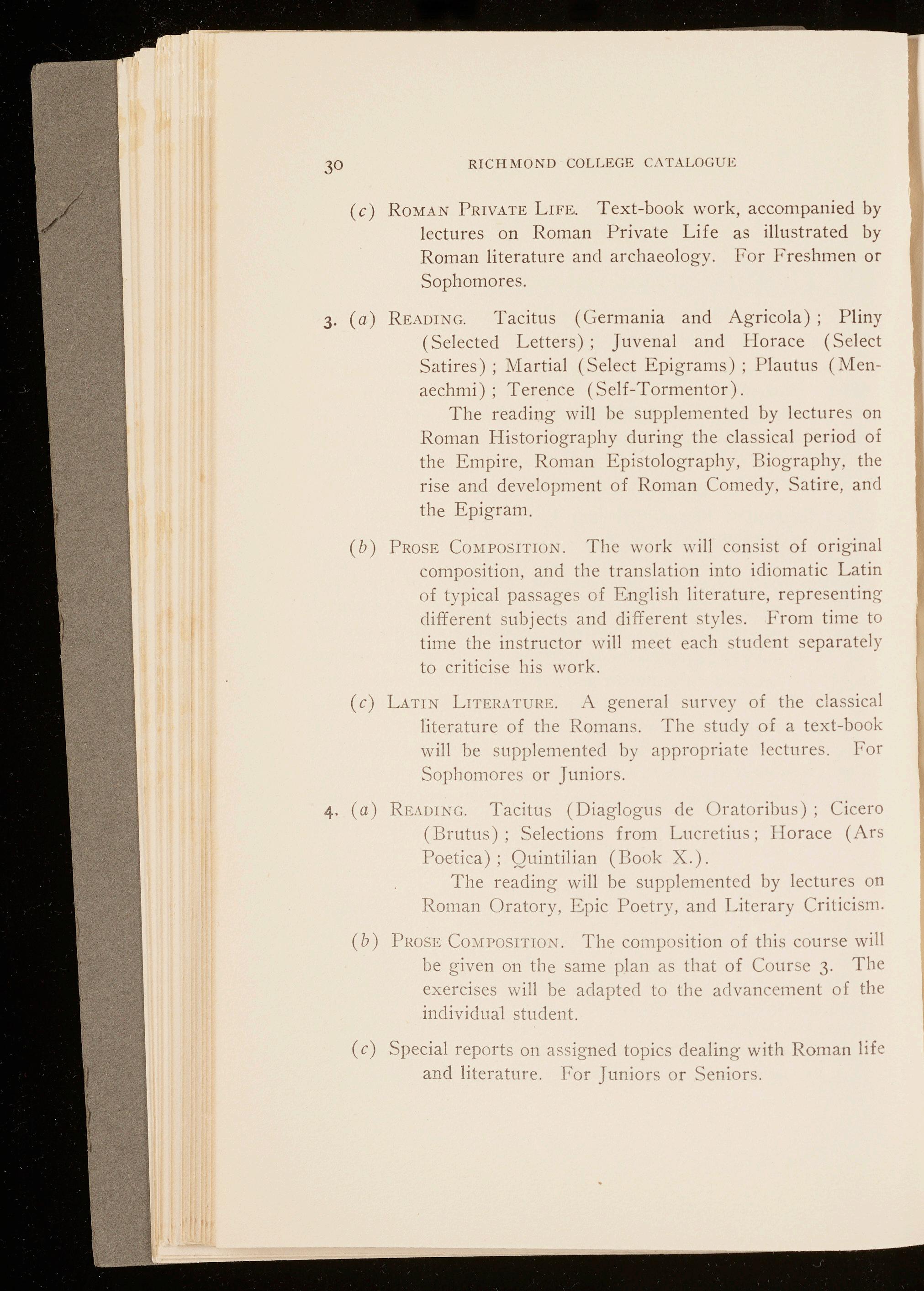
( c ) R OMANP RIVATEL IFE. T ext-b oo k wo rk , acco mpanied by l ecture s o n R o man P riv a t e Life as illu strated by Roman lit er at ure a nd a r c h aeo logy For F re shm en or So ph om o r es.
3 (a) READING. Tac it u s (Ge rmani a a nd Ag ri co la ); Plin y (Se l ec t ed Le tt e r s); Ju ve n a l a nd Horace ( Se l ect Sa tir es) ; Ma r t ia l ( Se lec t Ep igrams) ; P la utu s ( Menaechm i ); Tere n ce (Se lf -Tor m ento r ).
The r eading w il! be supp l emented by lect ur es on Roman Histo r iog r ap h y d u r ing the class ica l pe ri od of the Empire, Roma n Episto log r ap h y, B iograp h y, the rise and developme n t of Roma n Comedy, Sati r e, and the Ep ig r am.
(b) PROSE CoMPOSCTION. The work \\'ill consist of o ri ginal composition, and the translatio n into idiomatic Latin of typica l passages of Eng l is h literature, rep r esenting different subjects and different styles. From time to time the instructo r will meet each student separately to criticise his work.
(c) LATIN LITERATURE. A genera l su r vey of the classical literature of the Romans. The study of a text-book will be supplemented by appropriate lectures. For Sophomores or Juniors.
4. (a) READlNG. Tacitus ( Diag logus de Oratoribus) ; Cicero (Brutus); Selections from Lucretius; Horace (Ars Poetica) ; Quintilian (Dook X.).
The reading will be supplemented by lectures on Roman Oratory, Epic Poetry, and Literary Criticism.
( b) PROSECoMPOSITION. The composition of this course will be given on the same plan as that of Course 3 . The exercises will be adapted to the advancement of the individual student.
(c) Special reports on assigned topics dealing with Roman life and literature. For Juniors or Seniors .
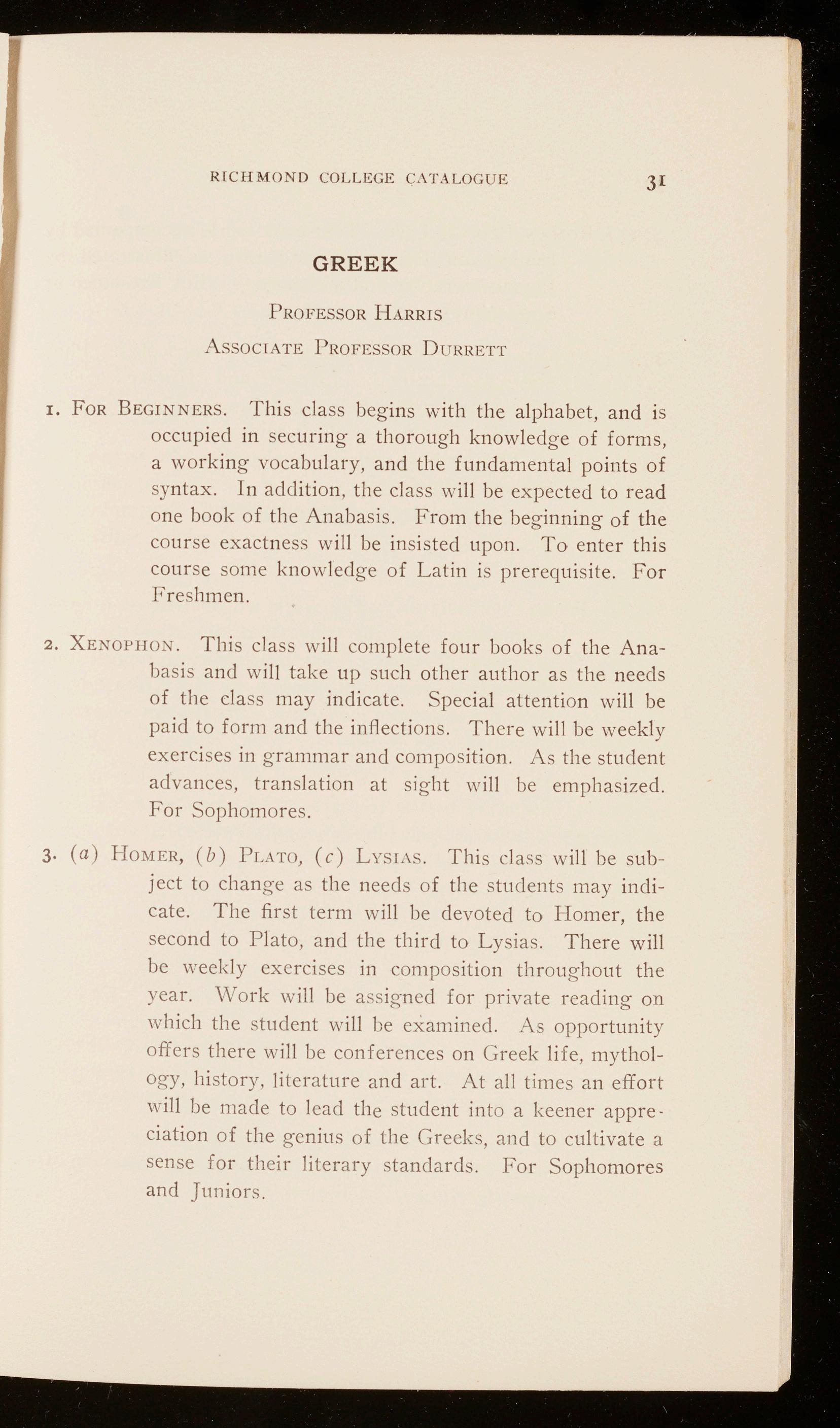
PROFESSORHARRIS
ASSOClATEPROFESSORDURRETT
1. FoR BEGINNERS. This class begins with the alphabet, and is occupied in secur ing a thorough knowledge of forms, a working vocabulary, and the fundamental points of syntax. In addition, the class will be expected to read one book of the Anabasis. From the beginning of the course exactness will be in sisted upon. To enter this course some knowledge of Latin is prerequisite. For Freshmen
2. XENOPHON. This class w ill complete four books of the Anabasis and will take up such other author as the needs of the class may indicate. Special attention will be paid to form and the inflections. There will be weekly exercises in grammar and composition. As the student advances, translation at sight will be emphas ized . For Sophomores .
3. (a) HOMER, ( b) Pu To, ( c) L,SL\S. This class will be subject to change as the needs of the students may indicate. The first term will be devoted to Homer, the second to Plato, and the third to Lysias. There will be weekly exercises in composition throughout the year. \Vork will be assigned for private reading· on which the student will be examined. As opportunity offers there will be conferences on Greek life, mythology, history, literature and art. At all times an effort will be made to lead the student into a keener appreciation of the genius of the Greeks, and to cultivate a sense for their literary standards. For Sophomores and Juniors.

4· (a) THUCYDIDES,(b) DEMOSTHENES,(c) TI-IE DRAMA. In this class the work will center around Thucydides, Demosthenes, and the Drama. Work will also be assigned for private reading, and English will be put into Greek, either as a set exercise or at dictation. This course will be made as general as is consistent with thoroughness. There will be lecture s on literature, grammar and rhetoric. For Juniors and Seniors.
PROFESSORSTEWART
1. Fon BEGINNERS. This class for beginners 111 French presupposes a sound knowledge of English grammar and of the elements of Latin. About three hundred pages of easy French are read. and Squair's "Shorter French Freshmen. Grammar: Fraser Course." For
2. GENERAL INTRODUCTIONTO TI-IE STUDY OF FRENCH LITERATURE. Conversation. The course consists of (a) Composition: Text, Francois' "Advanced Prose Composition"; (b) French Literature: Text, Wells' "Modern .French Literature"; ( c) Readings in French prose and poetry; Hugo's "Les Miserables" (Heath edition) ; Daudet's "Tartarin de Tarascon"; "French Short Stories" (Buffum) ; Canfield's "French Lyrics"; Rostand's "Cyrano de Bergerac." Critical readings and studies in Cla ssical French Comedy. Grammar: Fraser and Squair's. For Freshmen and Sophomores.
3. ADVANCEDCouRSE. This class will be conducted in French and students are expected to take notes and answer questions in French.

(a) Lectures on history of French literature from the earliest times to the present day. Text: Wright's "History of French Literature."
( b) Studies in French style, composition, etc.
( c) The reading will include selected clas s ics of the seventeenth century, examples of Romanticism and Realism in the ninetenth century, and selections from contemporary literature. Essays in French will be required.
1. A CouRSE FOR BEGINNERS. Texts: Hill and Ford's "Spanish Grammar"; Hill's "Spanish Tales"; Padre Isla's "Gil Blas"; Alarc6n's "Capitan Veneno."
2. (a) A CouRSE IN SPANISH COMPOSITION. Text: Ford's ''Spanish Prose Composition."
( b) LECTURESON SPANISH LITERATURE. Text: FitzmauriceKelly's "Spanish Literature."
( c) READINGS lN SPANISH PROSE AND POETRY. Cervantes' "Don Quixote" (Ford); "Tres Comedias Modernas"; selected dramas of Calderon and of Lope de Vega; Nuiiez de Arce's "Haz de Lena"; Alarc6n's "Sombrero de Tres Picos"; Valdes' "Jose"; Galdos' ·'Marianela''; Spani sh Lyrics.
I. FoR BEGINNERS. A beginning course for those students who have never studied German, or whose preparation is inadequate for more advanced work. When taken to fulfill Entrance Requirements. it does not count toward a degree.
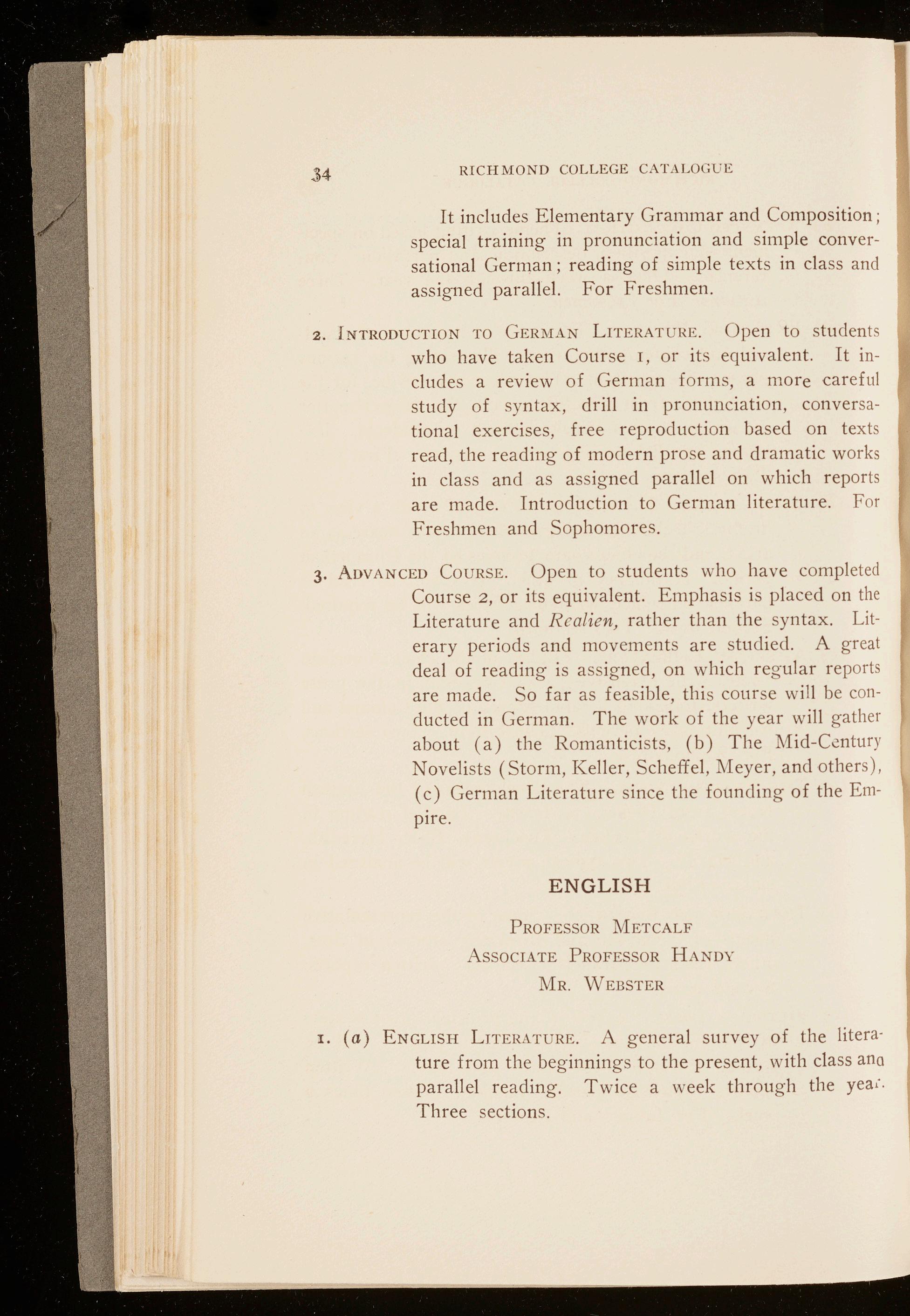
RICHMONDCOLLEGECATALOGU.':
It includes Elementary Grammar and Composition; special training in pronunciation and simple conversational German; reading of simple texts in class and assigned parallel. For Freshmen.
2. [NTRODUCTIONTO GER!IL\.N LITERATUt{E. Open to students who have taken Course I, or its equivalent. It includes a review of German forms, a more careful study of syntax, drill in pronunciation, conversational exercises , free reproduction based on te xts read, the reading of modern prose and dramatic works in class and as assigned parallel on which report s are made. Introduction to German literature. For Freshmen and Sophomores.
3. ADVANCEDCouRSE. Open to students who have completed Course 2, or its equivalent. Emphasis is placed on the Literature and Rcalien, rather than the syn tax. Literary periods and mov eme nt s are studied. A great deal of reading is assigned, on which regular rep orts are made. So far as feasible, this course will be conducted in German. The work of the year will gather about (a) the Romanticists, (b) The Mid-Century Novelists (Storm, Keller, Scheffel, Meyer, and others), (c) German Literature ince the founding of the Empire.
PROFESSORMETCALF
ASSOCIATEPROFESSORHAND\"
MR. vvEBsrnR
1. (a) ENGLISH LITERATURL A general survey of the literature from the beginnings to the present, with class ano parallel reading. Twice a week through the yea,. Three sections.
( b) ADVANCEDCoMPOSlTION. Theme writing based on specimens of exposition, description, and narration. Conferences. Once a week through the year. Three sections. For Freshmen.
2. (a) EXPOSITORYWRITING. The study of a number of standard and contemporary essays illustrating the various phases of exposition. The selections will be, for the most part, from scientific essays, the subject matter of which is of intrinsic interest to students. Extensive parallel reading, written reports. First term. Two sections.
( b) SnAKESPEARE. The study of three plays with a view to dramatic technique, the growth of Shakespeare as an artist, and the chief characteristics of the Elizabethan period. A number of other plays will be read as parallel, on which written analyses will be required. Second term. Two sections.
(c) AMERICAN LITERATURE. Studies in the chief American poets, with extensive parallel reading in the prose writers, following a rapid survey of the Colonial and Revolutionary periods. Third term. Two sections. For Sophomores.
3. (a)

TENNYSON AND BROWNING. poems of Tennyson and others read as parallel. Second term.
Some of the representative Browning studied in class, Lectures ; written reports.
(b) (c) Tim ENGLISH NovEL. The development of the English Novel from Dickens to Hardy. Parallel reading in the works of Dickens, Thackeray, Eliot, Meredith, and Hardy. Two typical novels will be analyzed in class. First term.
VICTORIANPROSE. A few of the principal prose writers of the middle and later ninteenth century will be studied through their essays and letters. Written reports; extensive parallel reading. Three times a week. For Juniors and Seniors.

4. (a) ANGLO-SAXONPROSE. Old E!nglish Grammar and Reader (Smith's), with collateral reading of selections from the prose literature. First term.
(b) ANGLO-SAXONPoETRY. Beowulf (Wyatt's edition) read entire, and several hundred line s critically studied. Second term.
( c) MIDDLEENGLISH. Selections from Middle English literature. Emerson's Middle English Reader; parallel reading in Chaucer. Third term.
(d) CHAUCER. Several of the Canterbury Tales will be studied and others, along with the shorter poems, read as parallel. Third term.
Courses 4 ( c) and 4 ( d) will be given in alternate years; for 1915-1916 Course 4 ( c) will be offered. For Seniors and Graduates.
5. (a) THE SHORT STORY. The development and technique of the hort story . Wide reading of classic and contemporary short stories, and exercise in story writing. First term.
(b) THE EIGHTEENTH CENTURY CussrcrsTs. Studies in the prose and poetry from Pope to Johnson, with extensive reading and written reports on special topics. Second term.
( c) Trrn ROMANTIC POETS. Several of the Romantic poets of the earlier nineteenth century (Wordsworth, Byron , Shelley, Keats) will be studied. The beginnings of the Romantic movement will be traced. Lectures, reports, parallel reading. Third term.
Courses 3 and Sare given in alternate years. For 19r5-'r6 course S will be given. For Juniors and Seniors

PROFESSORGAINES
ASSOCIATEPROFESSORPOWERS
1 , (a) SOLID GEOMETRY. A brief study of certain portions of plane geometry will be made, after which solid geometry will be taken up and completed. The work in plane geometry is not given merely for review, but rather for the sake of certain methods of proof, and particularly for calling the student's attention to the interrelation of groups of theorems, and the development of the subject as a whole. First term.
( b) COLLEGEALGEBRA. A course designed to follow the work of a good high school, beginning with quadratic equations, and including such subjects as the progressions, permutations and combinations, mathematical induction, binominal theorem, inequalities, logarithms, theory of equations, and infinite series. Second term.
(c) PLANE TRIGONOMETRY. The subject is approac 'hed from the practical side, problems being solved at first by graphical methods, and afterwards computed by means of trigonometrical formulas and mathematical tables. After the interest of the student is thus secured, the remainder of the time is devoted to the development of analytical trigonometry. Third term. For Freshmen and Sophomores.
2. (a) ANALYTICALGEOMETRY. Elementary course. Systems of co-ordinates with various illustrations of the use of graphical methods, the construction and discussion of loci, a detailed study of the straight line and circle, and of the simpler properties of the parabola, ellipse, and hyperbola. First term.

( b) DIFFERENTIAL CALCULUS. In this course the student is not only given much practice in differentiating the ordinary functions , but emphasis is laid upon getting a clear conception of the meaning and purpose of the calculus. The method is then applied to questi ons of maxima and minima, tangents and normals, inflex ions, assymptotes, curve tracing, and the expansion of functions in se ri es Second term .
( c) INTEGRAL CALCULUS. An elementary course, but one in which care is taken to lay the foundations securel y, and prepare the way for the m o re advanced work of the following year. During the course the method of integration is applied to a suffic ient variety of problem s to suggest to the student its wide ran ge of u sefulness. Third t e rm . For Sophomores and Juni ors.
3. (a) ANALYTICALGEOMETRY. An advanced course designed to fo ll ow course 2 (a). F ir s t term.
( b) DIFFERENTIAL CALCULUS. A n advanced course which presupposes the completion of Course 2 (b) or its equivalent. Second term.
(c) INTEGRALCALCULUS Advanced course following Course 2 (c). Third term.
The work of this cour se will vary somewhat fr o m year t o year. Lecture cour ses will be g i ven on one or more of the following subjects: Infinite ser ie s and products, analyt ical mechanics, diffe r ential equat io n s, an introduction to the theory of functions. For Juniors and Seniors.

1. (a) ELEMENTARYGENERAL PI-IYS1cs. This course covers in an elementary way the fundamental principles of Physics, including Mechanics, Properties of Matter, Heat, Sound, Light, Electricity and Magnetism. It is offered to meet the need s (I) of those who wish to acquire some knowledge of the simpler phenomena of Physics a s a part of a general education, and (2) of those who may t a ke up the study of medicine or some related science . For admi ss ion to t'his course the st ud e nt must have a kn owle d ge of Algebra and Plane Geome tr y equivalent to the necessary preparation for Mathematics I.
( b) A laboratory co ur se, tw o periods per week, two hours each . This cou r se furnishes an introduction to the instruments and methods of quantitative measurements, a nd lead s to a fuller app r ec iation of the principle and laws set fort h in course I (a) For Freshmen and Sophomore .
2. (a) ADVANCEDPnYsrcs, MECHANICS, WAVE MOTION AND LrGnT. This course is adapted to the n eeds (I) of those w h o wish to exte nd their knowledge of Physics as a part of a liber a l education, and ( 2) tho se who wish to fit them se lv es to te ac h Physics in secondary schoo ls. Much stress is laid on the quantitative relat io n s and h ence in the lecture s and in the experiments as well fr ee u se is made of the student's mathematical attainments in the derivation and di sc ussion of physical laws as expressed in mathematical formulae. The completion of Cour se r (a) and r (b) in Physics and I (a) in Mathematics i s r eq uired for admission to this course. Not give n in 1915-' 16.

( b) An advance laboratory course dea ling with the s ubj ects treated in Course 2 (a), two period s pe r week, two hours each. The st udent i s given practice in adapting and assembling apparatus and in using instruments of hi gh precision. For Sophomores and Juniors.
3. (a) ADVANCED PHYSICS, ELECTRICITY AND MAGNETISM. The grade of work and the requirement s for admission are the same as for Course 2 (a). This course will include a study of magnets and the magnetic properties of iron, electrical measuring instruments, batteries, electromagnetic inducti on and it s application in dynamos and motors, power tran mission, and a brief study of the electrical theory of matter. The work will be especially helpful ( 1) to tho se who wish a fuller und ers tanding o f and familiarity with the common applications of electricity in modern life, and ( 2) to tho se who propose to teach Physics in secondary schools.
Courses 2 (a) and 3 (a), with the accompanying laboratory courses are accepted as fulfi llin g the Physics requirement s in our best engineering schools.
( b) An advanced laborat ory course in electricity and magnetism, two periods per week, two hour s each. This course will give practice in the use of high-grade instruments of both laboratory and comme rcial types, and in the operat ion of both D. C. a nd A. C. dynamos and motors. Given in 1915-'16. For Juni ors and Seniors.
Note .-St ud ents t a king Courses 2 (b) and 3 (b) may spend a part of the assigned la boratory time in sett in g up and manipulating some of the more difficult qualitative o r demonstration experiments; this practice wi ll be especially adva nta geous to those expecting to teach.
PROFESSORBINGHAM ASSOCIATEPROFESSORELDER

4 1
x. (a) INORGANIC CHEMISTRY. The occurrence, preparation, and properties of the elements and their simple compounds, together with the fundamental laws of the science, are carefully considered. Reference is frequently made to the important applications of chemical facts and laws to the industrial arts and the phenomena of daily life.
( b) Elementary inorganic preparations, simple quantitative analysis, and an introduction to systematic qualitative analysis. Four hours per week. Primarily for Freshmen and Sophomore .
2. (a) ORGANICCHEMISTRY. This course is primarily arranged for those who intend to pursue graduate study in science or medicine. It is open to students who have completed Course I. Lectures and quizzes upon the fundamental principles of Organic Chemistry. Given in 1914-1915.
( b) Laboratory work consisting of a thorough course in organic preparations, including products of synthetical and industrial interest. Emphasis is placed upon the acquirement of a good technique. Four hours per week. Primarily for Sophomores and Juniors.
3· (a) QUANTITATIVE ANALYSIS. This course is principally laboratory work. It will contain work necessary in the training of the technical chemist, and is open to those who have completed Course r. Various salts, metals, ores, and commercial or natural products will be analyzed by gravimetric and volumetric methods. The allotment of work may be made to suit the needs of the individual student. At least seven hours per week.

(
b) One hour a week wi ll be devoted to a discuss ion of analytical met h ods, the worki n g out of problems, and the ba lancing of equations To be given in 1915-'16. For Juniors and Seniors.
ASSOCIATEPROFESSORNORMAN
1. LoGrc. This course is intended to acquaint the young student with the principles of clear, consistent thinking. Exercises are given from historical and scientific essays to acquaint the st udent at first hand with specimens of correct expres sion. From time to time professors in the various department s of sc ience are invited to deliver popular lectures on specific themes in their several fields. These with illu strations and parallel reading in the hi story of natural science enable the young student to de c id e for him se lf along what lines his scientific interest s lie, and at the same time clear away the confusion, which often beset s the beginner in science. This course is , therefore, especially recommended to Freshmen.
(a) DEDUCTION is studied to show the principle s of Inference in its relation to Definition, Cla ss ification, Hypothesis and its verification, and formation of subsidiary law s of natural sc ience. The sy llogism is reviewed as a form of consistent thought.
( b) INDUCTION is given in refernce to Ob s ervation, and the canons of experimental methods in the physical sciences. Description and Exp l anation, Terminology and Nomenclature, Theory and Fact, the Historical and Statistical methods are treated in connection with meth ods nf observation .
(
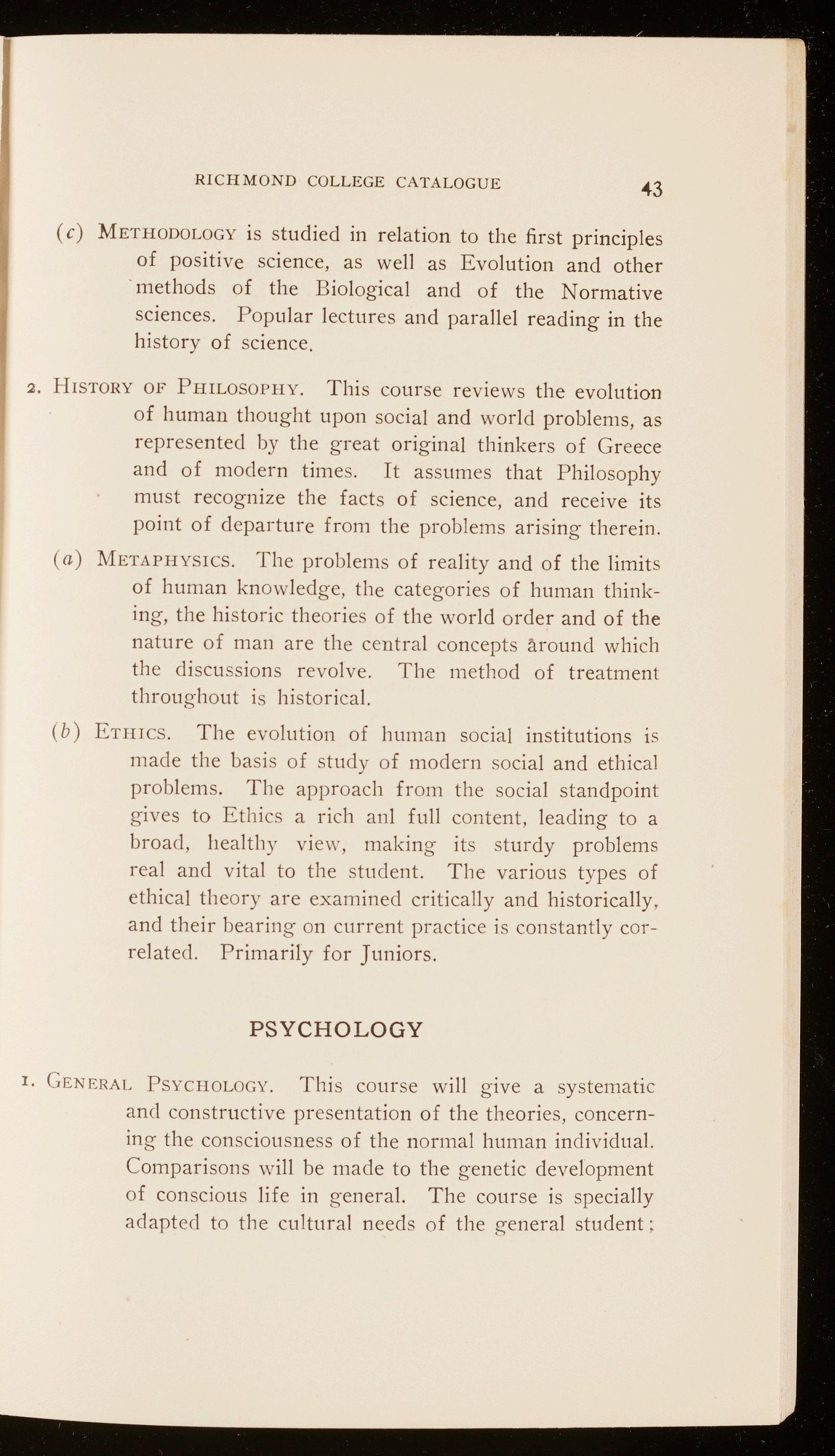
c) METHODOLOGY is studied in relation to the first principles of positive science, as well as Evolution and other - methods of the Biological and of the Normative sciences. Popular lectures and parallel reading in the history of science.
2. HISTORYOF PHILOSOPHY. This course reviews the evolution of human thought upon social and world problems, as represented by the great original thinkers of Greece and of modern time s . It assumes that Philosophy must recognize the facts of science, and receive its point of d epa rture from the problems arising therein.
(a) METAPHYSICS. The problems of reality and of the limits of human knowledge, the categories of human thinking, the historic the ories of the world order and of the nature of man are the central concepts ~round which the discussions revolve. The method of treatment throughout is historical.
(b) Ennes. The evolution of hum a n social institutions i s made the basis of study of modern socia l and ethical problems. The approach from the socia l standpoint gives to Ethics a rich an! full content, le ading to a broad, healthy view, making it s sturdy problems real and vital to the stude nt. The various types of ethical theory are examined critically and historically, and their bearing on current practice is constantly correlated . Primarily for Juniors.
1. GENERAL PsvcnoLOGY. This course will give a systema ti c and constructive presentation of the theories, concerning the consciousness of the n o rmal human individual. Comparisons will be made to the genetic development of conscious life in general. The course is specially adaptecl to the cultural need s o f the general student;
RICHMOND COLLEGECATALOGUE and will prove helpful to tho se preparing for medicine , law, education, business, and the ministry. Practical applications are made throughout the course.
(a) PHYSIOLOGICALPSYCHOLOGY. The relation of mind and body shows the dependence of the conscious life upon the nervous system.
(b) ANALYTICALPsYCI-IOLOGY. Study of sensatio n with qualitative and quantitative analysis, including the relation of sensation to the sense organs and the physical environment.
(
c) SYNTHETIC PSYCHOLOGY. Constructive study of theories, concerning the complex phases of mind, including perception, association, attention, memory and imagination, action and volition, feeling and emotion, language and intellect.
( d) LABORATORY. Exper im enta l investigation of psychological problems, demonstration of psychic phenomena, training in introspective in sight. Open to Sophomores.
2. Child Psychology and Educational Psychology. Not given in 1915-'16.
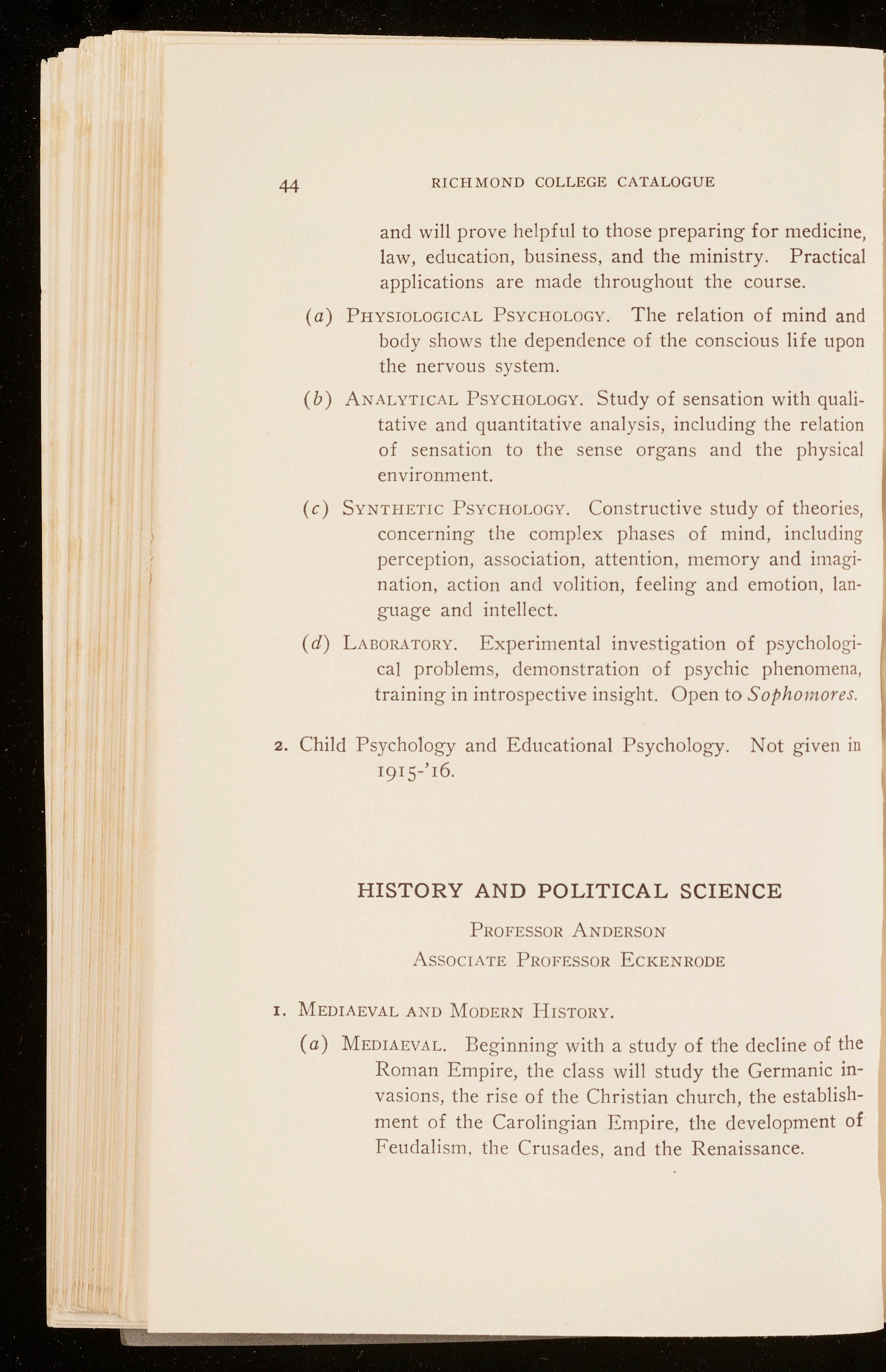
HISTORY AND POLITICAL SCIENCE
PROFESSORANDERSON
ASSOCIATEPROFESSORECKENRODE
I. MEDIAEVALAND MODERN HISTORY.
(a) MEDIAEVAL. Beginning with a study of t'he decline of the Roman Empire, the class will study the Germanic invasions, the rise of the Christian church, the establishment of the Carolingian Empire, the development of Feudalism. the Crusades, and the Renaissance.

(b) MODERN. The second half of the year will be mainly taken up with a review of the leading events of the Reformation, the French Revolution, the growth of Democracy, the Unification of Italy and Germany, the economic and territorial expansion of Europe. For Freshmen and Sophomores.
2. AMERICAN HISTORY. The main lines of political, constitutional, and economic development since 1750 will be followed. Emphasis will be placed on the social forces which 'have brought things to pass, and on the events which have counted in the building of our present civilization. The course may be subdivided as follows:
(a) The American Revolution and the Rise of Parties.
(
b) The Civil War and Reconstruction.
(c) Contemporary History. Political and Economic Readjustment. This course will not be given in 1915l916. For Sophomores and Juniors.
3. ENGLISH HISTORY. The leading movements of English History from Roman times to the present will be traced, with increasing attention, as we approach the present, to the things that count for an understanding of current English problems and politics. Matters that are significant in the formation of American institutions will be stressed. This course will alternate with Course 2 and will be given in 1915-1916. For Sophomores and Juniors.
4- EUROPE SINCE 1789. A somewhat comprehensive study of the last century and a quarter will be made in this course. Students interested in recent European history and movements will profit by taking this class. The year will be divided between:
(a) THE FRENCH REVOLUTIONAND NAPOLEON. This portion of the work will cover one-third of the session.

(b) THE NINETEENTH AND TWENTIETH CENTURY. An effort will be made in the s ix months assigned for this part of the course to give careful attention to the formation of national states, to the spread of popular government, to the enormous economic changes of the la st hundred yea r s, to the easte rn problem, and to the questions arising out of European expansion with Asia and Africa. This course will not be given in 1915-1916. For Juniors and Seniors.
5. VIRGINIA HISTORY. The founding of Virginia, Virginia as a colony, the Revolutionary strugg le , the formation of constitutions, Slavery, Sece sion, and Reconstruction, and the economic revival since 1865 will be some of the subjects considered in this class. The biographies of the most eminen t statesmen, religious leaders, and educators wi ll be touched upon. The objects of the course are, in the main, two: to afford students an opportunity to gain a knowledge of the History of the Old Dominion, and to encourage the development of historical scho larship among us. This course alternates with Course 4 and will be given in 1915-1916. For Juniors and Seniors.
1. AMERICAN GovERNMENT wili be discussed, National, State, and Local, both in theory and practice. Special t opics are assigned for investigation, and parallel reading is required. Considerable attention will be given to current problems. Not given in 1915-1916.
(a) NATIONAL GovERNMENT. Origin, colonial experience, Federal Constitution, the President, Congress, Judiciary Departments, Political Parties, current problems.
( b) STATE GovERNMENT. Constitutional basis, the Executive, the Legislative, the Courts. Particular attention will be given to the institutions and problems of Virginia.

(c) MUNICIPAL AND RuRAL GovERNMENT. The American city, history, organization, reform movements, such as the Commission and the City Manager plans; the town. county, village. For Sophomores and Juniors.
2. THE PRINC[PLES OF POLTTIC.\L SCIENCE AND COMPARATIVE GOVERNMENT.
(
a) THE PRINCIPLES OF POLITICAL ScrENCE. Under this head such subjects as the origin of the state, classification of states, the forms of government, distribution of powers, the functions of modern government will be treated.
(b) CoMPAR\TJ\'E GovERNMENT. The governments of Great Britain, France, Germany, Italy, etc., will be described.
( c) Current problems will be discussed in their relation to political theory. An effort will be made during the wh o le year to articulate important happenings of the day with the course of study, but during the last term particular attention will be given to several problems of pre s ent interest. Course 2 will be given in 19151916. For Sophomores and Juniors.
ASSOCIATEPHOFESSOROLMSTED
I. GENERALBIOLOGY. A study of the cell a s a biological unit, of the s tructure, phy s iology and development of tpyical invertebrate animals ( from the Protozod through the Arthropods) selected to illustrate general principles. A detailed study of the frog will follow as an example of a vertebrate. The student will trace the digestive. blood, nervous, and mu s cular systems, and comparisons will be made with other vertebrates, especially man. The remainder of the year will consist in the fundamentals of Botany. Seedlings, typical and modified stems, roots and leaves, organs of reproduction, pol-

lination and fertilization, plant societies and the economics relations of plants will be studied. Several lectures will be devoted to the theories of heredity and evolution. This course is designed not only to present biological principles, but also to train the student in observation and interpretation of biological principles. For Sophomores.
2. EMBRYOLOGY.Study of the development of the chick. Lectures will deal with the development of sexual cells, cleavage of egg, formation of the principal organs of the body, and the differentiation of the tissues. The student will prepare his own microscopical slides in the lab orato ry. Comparative Anatomy of Vertebrates. Lectures and laboratory work on the structures and relationships of vertebrate animals. In the laboratory a number of repre entative types, as the dogfish, turtle, and cat, are dissected. Preparatory to human anatomy and medicine. Biology 1 prerequisite. For Junior s and Seniors.
3. CRYPTOGAMICBOTANY. A study of the lowe r forms of plant life, chiefly the Algae and Fungi. Special attention will be given to mold s, rusts, mildews and others of economic importance.
Bacteriology: The various forms of bacteria, growth, etc., will be studied. The student will prepare and grow his own pure cultures.
Plant Physiology: Experimental study of the processes of nutrition, growth, irritability, etc., of the flowering plants. For Juniors ancl Seniors.
1. GEOLOGY. A study of the history of the earth as revealed by the dynamic agences now operating and by the structure o f the rocks and fossils therein. Excursions will be made to Yarious geo logica l deposits, in which Richmond and the vicinity abound. This course is planned not only for those who specialize in the sciences, but also for any who desire a broad cultural training. For Juniors and Seniors.

ASSOCIATEPROFESSORECKENRODE
1. THE PRINCIPLES OF EcoNOMICS. A survey of the principles of Economics is made with special reference to the problems of modern industrial and frnancial life. Lecture s vvill be supplemented by assigned readings and reports. For Sophomores and Juniors.
2. SPECIALTOPICS. This course is designed for those who have had a grounding in the principles of the science. A careful study of Distribution is followed by courses i::-i Money and Banking, Labor Problems, and Public Finance, or Business Organization. Papers are assigned students for research and an examination of business conditions as they exist in Richmond. Thus theoretical training goes hand in hand with practical demonstration. The object is to make the student thoroughly familiar with fiscal and financial operations. For Juniors and Seniors.
I. (a) The Principles of Education. The meaning and aim of education, heredity and education, the relation of education to society, the conditions of individual development, recapitulation, learning by trial and error, conscious learning, the question of formal discipline, imitation, play, liberal and vocational education.
( b) The principles and methods of teaching; the drill lesson, inductive and deductive lessons, the lesson for appreciation, moral education, questioning.
( c) Lesson plans, the relations of the teacher to supervision and to the course of study; the investigation and measurement of educational products. Open to Juniors and Seniors.
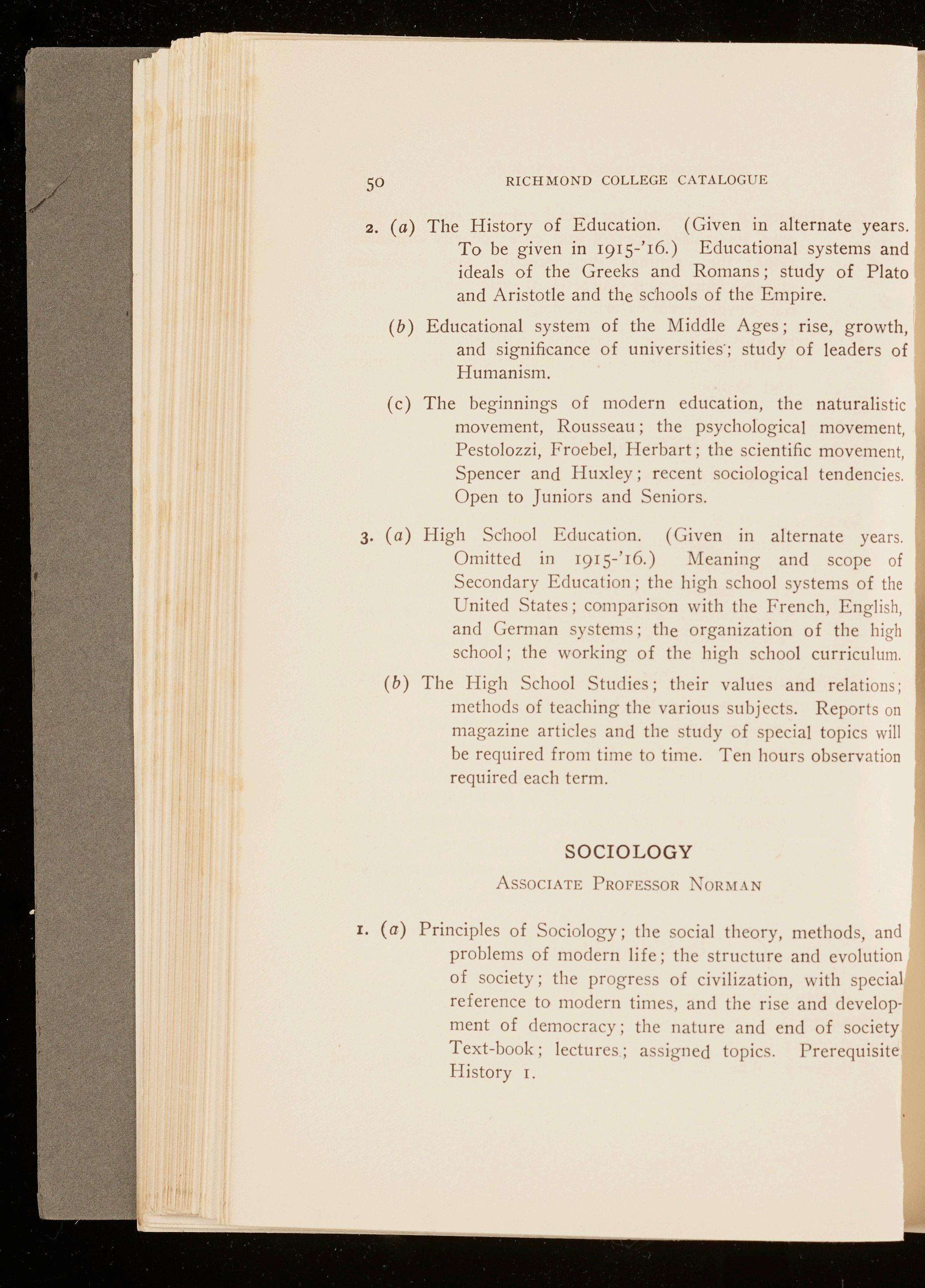
2. (a) The History of Education. (Given in alternate years. To be given in r9r5-'r6.) Educational systems and ideals of the Greeks and Romans; study of Plato and Aristotle and the schools of the Empire.
( b) Educational system of the Middle Ages; rise, growth, and significance of universities ·; study of leaders of Humanism.
( c) The beginnings of modern education, the naturali stic movement, Rousseau; the psychological movement , Pestolozzi, Froebe!, Herbart; the cientific movement , Spencer and Huxley; recent soc iological tendencies. Open to Juni ors and Seniors.
3. (a) High School Education. (Given 111 alternate years. Omitted in 1915-'16.) Meaning and scope of Secondary Education; th e high sc hool systems of the United States; compariso n with the French, English, and German ystems; the organization of the high school; the working of the hi g h school curriculum.
( b) The Iligh chool tudies; their value and relation ; methods of teaching the various subjects. Reports on magazine articles and the study of specia l topics will be required from time to time. Ten ho ur s observation required each term.
ASSOCIATE PROFESSOR l';ORM \N
I. (a) Principles of Sociology; the soc ial theory, methods, and problems of modern life ; the tructure and evolution of society; the progress of civilization, with special reference to modern times, and the ri se and develop· ment of democracy; the nature and end of society Text-book; lectur es; assigned topics. Prerequisite History r.

( b) History of movements for social reform; study of poverty, its causes, control and cure; charity organizations; the criminal, the defective, and dependent classes; causes and character of crime and the criminal; development of criminology.
( c) Christianity in its social bearings, with specia l reference to life and problems of the modern city. For Juniors and Seniors.
1. STUDIESIN TIIE OLD TEST,\MENT. In this course the development of thought in the Old Testament will be traced through the prophetic, priestly, and wisdom literature. Historical study of Ilebrew national life; the setting, characters, and teachings of representative books. Twice a \\·eek throughout the year.
2. STUDIESIN TIIE NEW TESTAMENT. In this course the central theme will be the lif e of Christ. The institutions, manner of Ii fe, ideal , and the literature of the Jewish people of the time will be considered; the historical study of the life of Christ; a topical study of the teachings of the Gospels; the social aspects of the Gospels in relation to present-day problems. Twice a week throughout the year.
Text-book for the e courses will be announced later.
A course of one year in the principles and practice of Public Speaking is offered. The purpose of this course is the training of students in accuracy of thought and expression and in ease of delivery. The practical matters of clearness in thought and
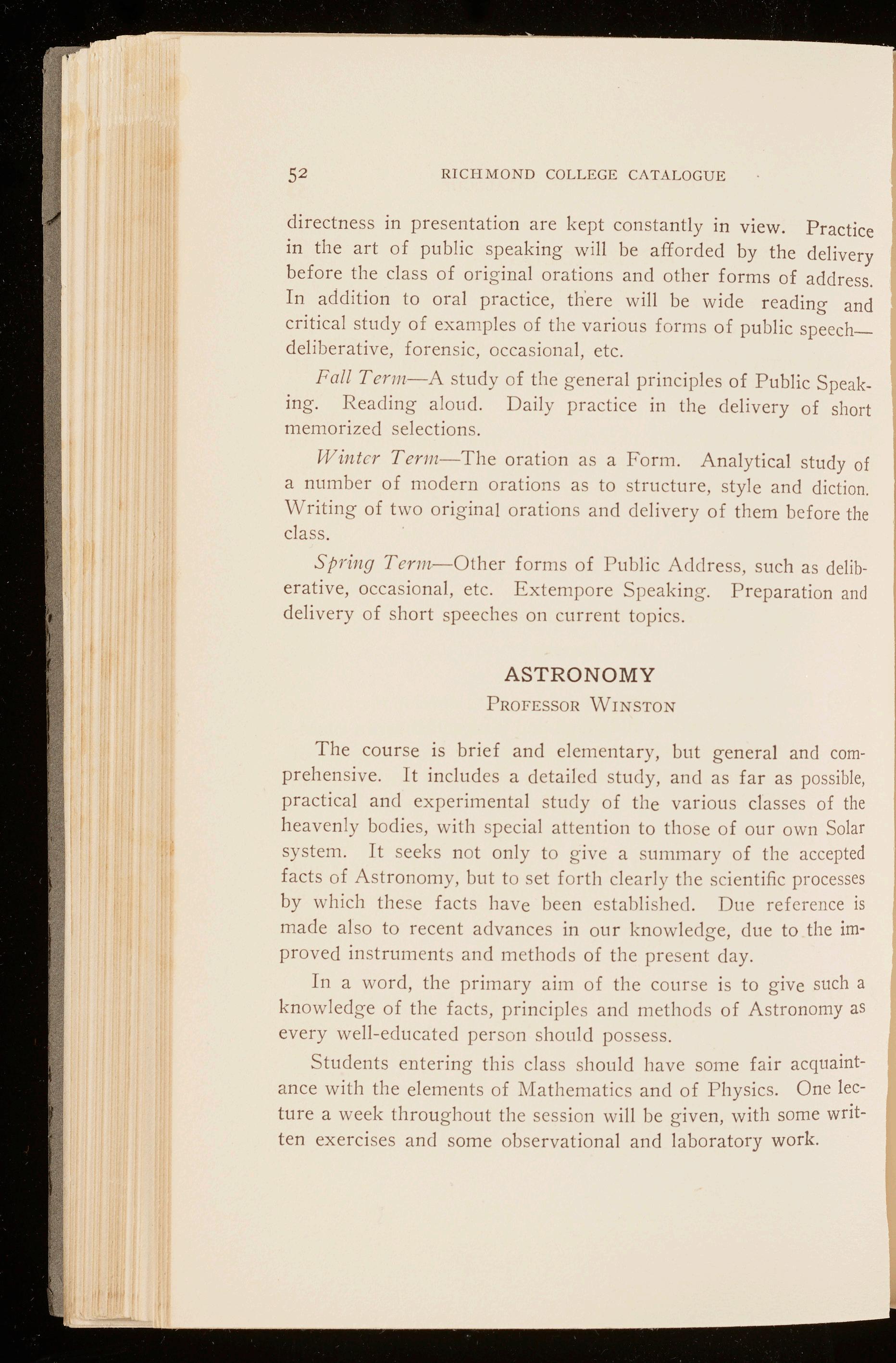
directness in presentation are kept constantly in view. Practice in the art of public speaking will be afforded by the delivery before the class of original orations and other forms of address. In addition to oral practice, there will be wide reading and critical study of examples of the various forms of public speechdeliberative, forensic, occasiona l, etc.
Fall Term-A study of the genera l principles of Public Speaking. Reading aloud. Daily practice in the delivery of short memorized selections.
Winter Term-The oration as a Form. Analytical study of a number of modern orations as to structure, style and diction. Writing of two original orations and delivery of them before the class
Spring Term-Other forms of Public Address, such as deliberative, occa ional, etc. Extempore Speaking. Preparation and delivery of hort speeches on cu rr ent topics.
PROFESSOR WINSTON
The course is brief and elementary, but general and comprehensive. lt includes a detailed study, and as far as possible, practical and experimental study of the various classes of the heavenly bodies, with special attention to those of our own Solar system. It seeks not only to give a summary of the accepted facts of Astronomy, but to set forth clearly the scientific processes by which these facts have been established. Due reference is made also to recent advances in our knowledge, due to the im· proved instruments and methods of the present day.
In a word, the primary aim of the course is to give such a knowledge of the facts, principles ancl methods of Astronomy as every well-educated person should possess.
Students entering this class should have some fair acquaintance with the elements of Mathematics and of Physics. One lee· ture a week throughout the session will be given, with some written exercises and some observationa l and laboratory work.
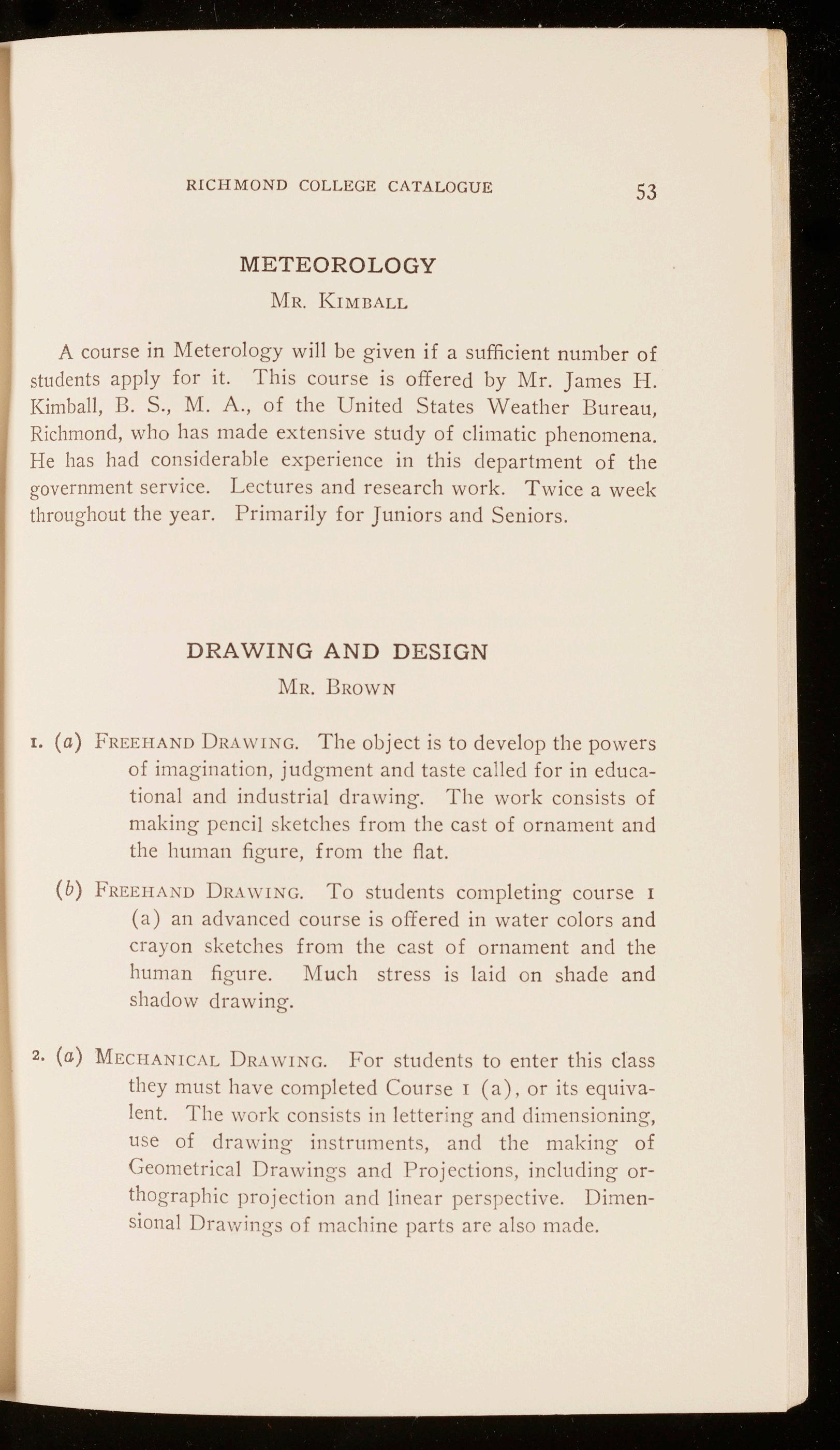
MR. KIMBALL
A course in Meterology will be given if a sufficient number of students apply for it. This course is offered by Mr. James H. Kimball, B. S., M. A., of the United States Weather Bureau, Richmond, who has made extensive study of cl imatic phenome n a. He has had considerable experience in this department of the government service. Lectures and research work. Twice a week throughout the year. Primarily for Juniors and Seniors.
MR. BROWN
1. (a) FREEHANDDRAWING. The object is to develop the powers of imaginati o n, judgment and ta te called for in educati o nal and industrial drawing. The work consists of making pencil sketches from the cast of ornament and the human figure, from the flat.
(b) FREEHAND DR.\ \\'ING. To students completing course I (a) an advanced cour e is offered in water colors and crayon sketches from the cast of ornament and the human figure. Much stress is laid on shade and shadow drawing.
2 • (a) MECHANICALDRAWING. For students to enter this class they must have comp leted Course r (a), or it s equivalent. The work consists in l ette r ing and dimensioning, use of dra\\'ing in struments, and the making of Geometrical Drawings and Projections, including orthographic projection and linear perspective. Dimensional Drawings of machine parts arc also made.
( b) MECHANICAL DRAWING. Students entering this course must have completed Course 2 (a), or its equivalent. The work consists of making Dimensional Drawings for use in practice, good shop systems being employed . The instruction includes the making of working details, assembly drawings, and blue prints of machinery from measurements.
Students in all courses furnish their own drawin g instruments and supplie .
The work completed in thi s department is granted full credit at all the universities and technical schools in the country.
MARION G. RYLAND, B. A., B. S., Librarian
JEsSJE Ill. \VooD, B. A., .Assistant to the Librarian D. . SUTTON, ' 15, R. C. r.IcD ,\NEL, '16, Student Assistants
The College Library occupies the southern wing of the Administration Building. It is one hundred and three feet long, thirty-two feet wide, and, with its vaulted arched ceiling, tw enty- three feet high - The interior is panelled in Flemish oak, and the book-cases arranged in alcove plan. There is, at each end, a fivefold Gothic window of striking size and beauty, and in each alcove a casement window, the whole affording natural light at all hours of the day. In convenience and harmony of effect, the Librar y is the culmination of the Collegiate Gothic, that exquisite per- pendicular type made familiar by the English colleges, to which all the College buildings strictly conform.
It contains over twenty thousand volumes, not including pam- phlets, arranged and catalogued by the Dewey System. The most recent and useful bibliographical aids are provided, and the best periodicals and reviews , daily and weekly papers are currently

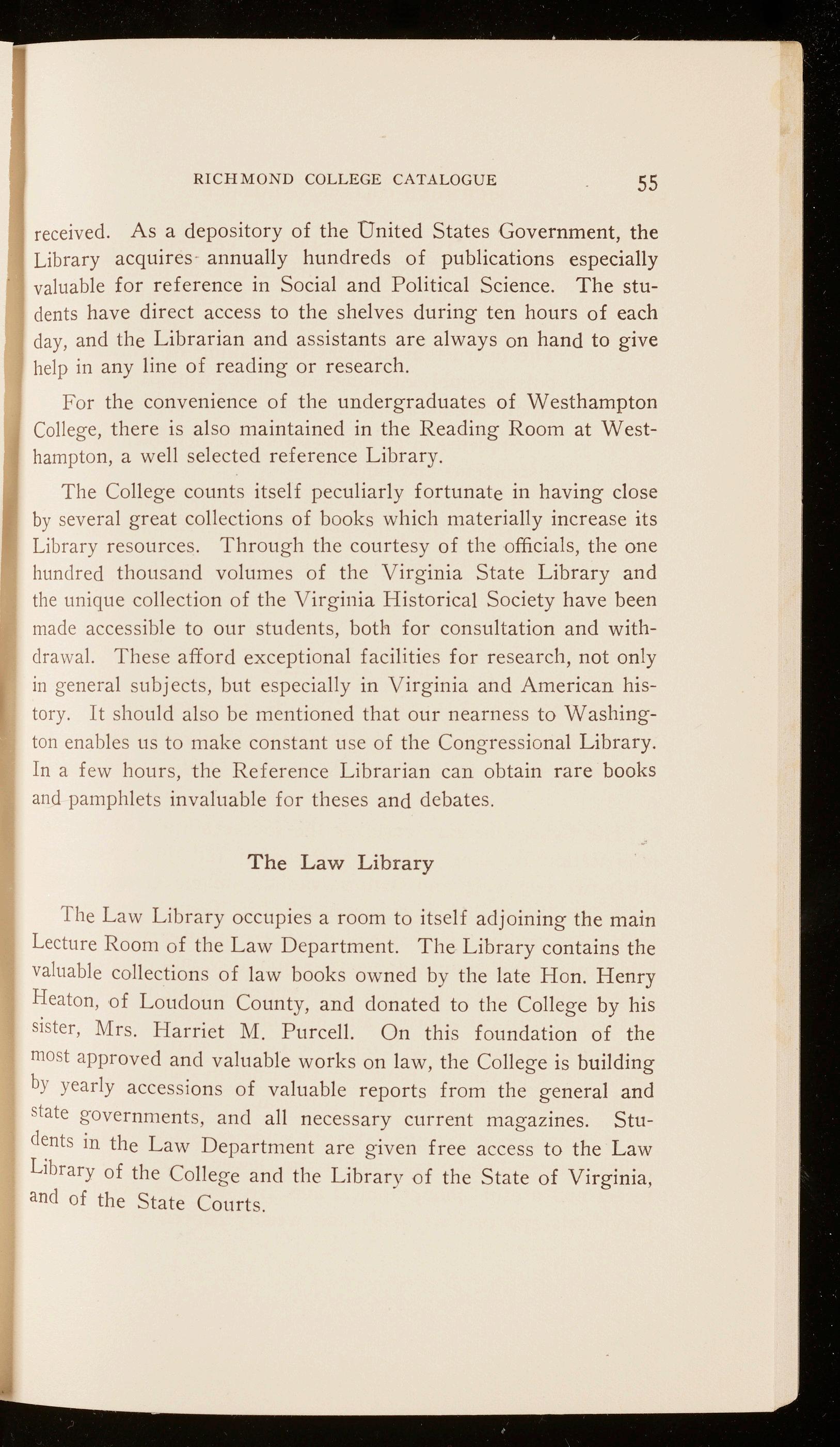
received . As a depo s itory of the Dnited States Government, the Libra ry acquires - annually hundreds of publications especially valuable for reference in Social and Political Science . The students have direct acce s s to the shelves during ten hours of each day, and the Librarian and a ss istant s are always on hand to give help in any lin e of reading or re search .
For the convenience of the undergraduate s of Westhampton College, there i s al so maintained in the Reading Room at Westhampton , a well s elected reference Library.
The College count s it se lf p e culiarly fortuna t e in having close by severa l great collecti on s of book s which m a terially increa se its Library r es our ces. Throu g h th e court es y of the officia ls , the one hundred th ou sa nd v olum es of th e Vir g inia St a t e Library and the uniq u e coll ect ion o f th e V ir g inia Hi storic a l S ociety have been made access ible to our st ud ent s, both for con sultation and withdrawal. T h ese a ffo rd exc epti onal facil itie s for r es ea rch, not only in genera l su bj ect s, but es p eciall y in V irgini a and American hi story. It sh ould a lso b e m enti oned th a t our n earn ess t o Washin gton enab les u s t o mak e con st a nt u se o f th e Con g r ess ional Libr a ry. In a few hour s, th e Refer en ce Librari a n can obt a in rare bo oks and pamp hl ets inv a luable fo r the ses and d ebate s .
The Law L ibr a ry occupi es a ro om t o it se lf adjoining the main Lecture Ro om o f the Law D epartment. The Library contains the valuable collecti on s of law book s owned by the late H on. Henry Heaton, of L o udoun Count y, and donated to the College by his sister, M r s. Harriet M Purcell. On thi s foundation of the most approve d and valuable works on law, the College is building by year ly a ccessi on s of valuabl e report s from the general and state gove rn me nt s, and all nece ss ary current magazines. Stud~nts in th e Law Department ar e g iven free a ccess to the Law Library of th e Colle g e and the Librar y o f the State of Virginia , and of the St a te Courts
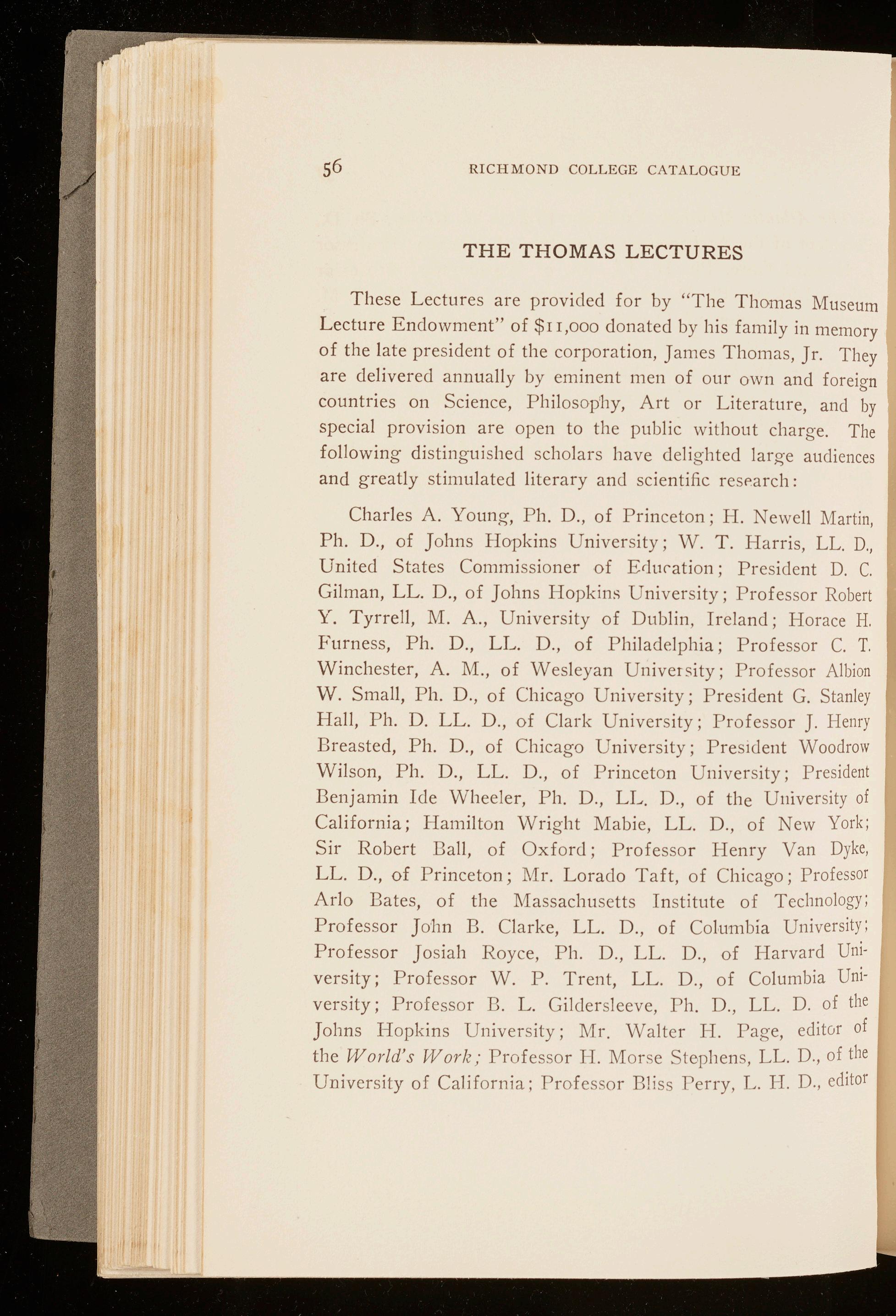
These Lectures are provided for by "The Thomas Museum Lecture Endowment" of $r r,ooo donated by his family in memory of the late president of the corporation, James Thomas, Jr. They are delivered annually by eminent men of our own and foreign countries on Science, Philos ophy, Art or Literature, and by special provision are open to the public without charge. The following distinguished scholars have delighted large audiences and greatly stimulated literary and scientific resParch: Charles A. Young, Ph. D., of Princeton; H. ewell Martin, Ph. D., of Johns Hopkins University; W. T. Harris, LL. D., United States Commissioner of Educ-ation; President D. C. Gilman, LL. D., of Johns Hopkins University; Profes sor Robert Y. Tyrrell, M. A., University of Dublin, Ireland; Horace H. Furness, Ph. D., LL. D., of Philadelphia; Professor C. T. Winchester, A. M., of Wesleyan University; Professor Albion W. Small, Ph. D., of Chicago University; President G. Stanley Hall, Ph. D. LL. D., of Clark University; Professor J. Henry Breasted, Ph. D., of Chicago University; President Woodrow Wilson, Ph. D., LL. D., of Princeton University; Pre sident Benjamin Ide Wheeler, Ph. D., LL. D., of the Uuiver sity of California; Hamilton Wright Mabie, LL. D., of New York; Sir Robert Ball, of Oxford; Professor Henry Van Dyke, LL. D., of Princeton; Mr. Lorado Taft, of Chicago; Professor Arlo Bates, of the Massachusetts Institute of Techn ology; Professor John B. Clarke, LL. D., of Columbia University; Professor Josiah Royce, Ph. D., LL. D., of Harvard University; Professor W. P. Trent, LL. D., of Columbia University; Professor D. L. Gilder sleeve, Ph. D., LL. D. of the Johns Hopkins University; Mr. Walter H. Page, edit or of the World's Wark; Profes sor II. M o r s e Stephen s , LL. D ., of the University of California; Profes sor Bli ss Perry, L. H. D., editor

of The Atlantic Monthly; Professor Francis W. Kelsey, Ph. D., President of the Archaeological Institute of America; Professor J. Howard Gore, Ph. D., LL. D., of Washington; Professor Edouard Meyer, Ph. D., of the University of Berlin; Mr. F. M. Chapman, Curator of Ornithology, Metropolitan Museum, of New York; Dr. R. G. Moulton, of the University of Chicago; Dr. Harvey W. Wiley, of ·washington; Professor William Lyon Phelps, Ph.D., of Yale University; President George E. Vincent, Ph. D., of the University of Minnesota; Jacques Loeb, Ph. D., Sc. D ., M. D., of the Rockefeller Institute, and Professor Jeremiah W. Jenks, Ph. D., LL. D., of New York University.

Two lit erary societ ies, known as the M u Sigma Rho and the Philologian, are maintained by the st u dents . They are provided with attractive halls on the top floor of the Administration Building, where they hold week ly meetings for declamation, debate, and other literary exercises. Bes id es the joint orator ical contest and the joint debate held in the spring each society holds at least one public debate during the session. A generous rivalry is maintained between the two organizations by the joint offer of an orator's meda l and a writer's medal, and among the individu:il members by the offe r in eac h society of a medal for declamation or improvement in debate, and for the best debater.
The literary societies hold membership in the Virginia State Inter-Collegiate Oratorica l Association, which is composed of the societies of the leading colleges and universities of Virginia. The inter-collegiate oratorica l contest is held annually in the late spring. Inter-collegiate debates are annually held between rep· re sentat ive s of the Co llege and representatives from other colleges in and out of Virginia. The debate between Randolph-Macon College and Richmond Co lle ge for 1914-'15 was won by Richmond Co llege.
The following publications are iss ued by the st ud ent s:
The Richmond College M essenger .-A monthly magazine published directly und er the super vis ion of th e literary soc ieti es and devoted to the development of literar y activity among the students. In this periodical are published short stories, poe ms, es·

says, alumni news, and editorials on questions of local academic interest. This magazine has for over forty years maintained a high standard of literary excellence among college monthlies.
The Richmond Collegian.-This is a weekly paper, in which are published events of local interest to the students, social, athletic, and personal. This new weekly paper has proved attractive not only to the members of the college community, but to the alumni as well.
The Spider.-This is an annual volume is sued u sually in May or June, abundantly illustrated and forming a transcript of a year of college life.
An active Young Me n' s Chr ist ian Assoc iation is maintained among the students. Its object is to promote the spiritual and moral welfare of the College and to stimu late to religious work in the College and in the city. The Association holds weekly meetings in the College Auditorium, which are addressed by representat ive students on vital topics of interest to college men, and from time to time by invit ed spea kers from Richmond and elsewhere. The Association has as its he adquarte rs a large ro om in the tower of Dormitory No. 2. This is comfortably and attractively furnished, provided with newspapers and other periodicals, and furnishes a convenient social center for the students. All students of the College are invited to make u se of this room as a recreation center. The members of the Association conduct services or teach Bible classes at the City Hospital, the Confederate Soldiers' Horne, the Locomotive Works, the Home for Incurables, and at severa l mission stations in the suburbs. A pleasant feature of the work in College is the arrangement made by the Association for meeting new stude nt s upon their arrival in Richmond and showing them many needful courtesies.
Connected with the Y. M. C. A. is a Missionary Society, which meets once a week for the study of the habit s, customs, religions, ~nd geography of the foreign countries. This Society owm an independent library.
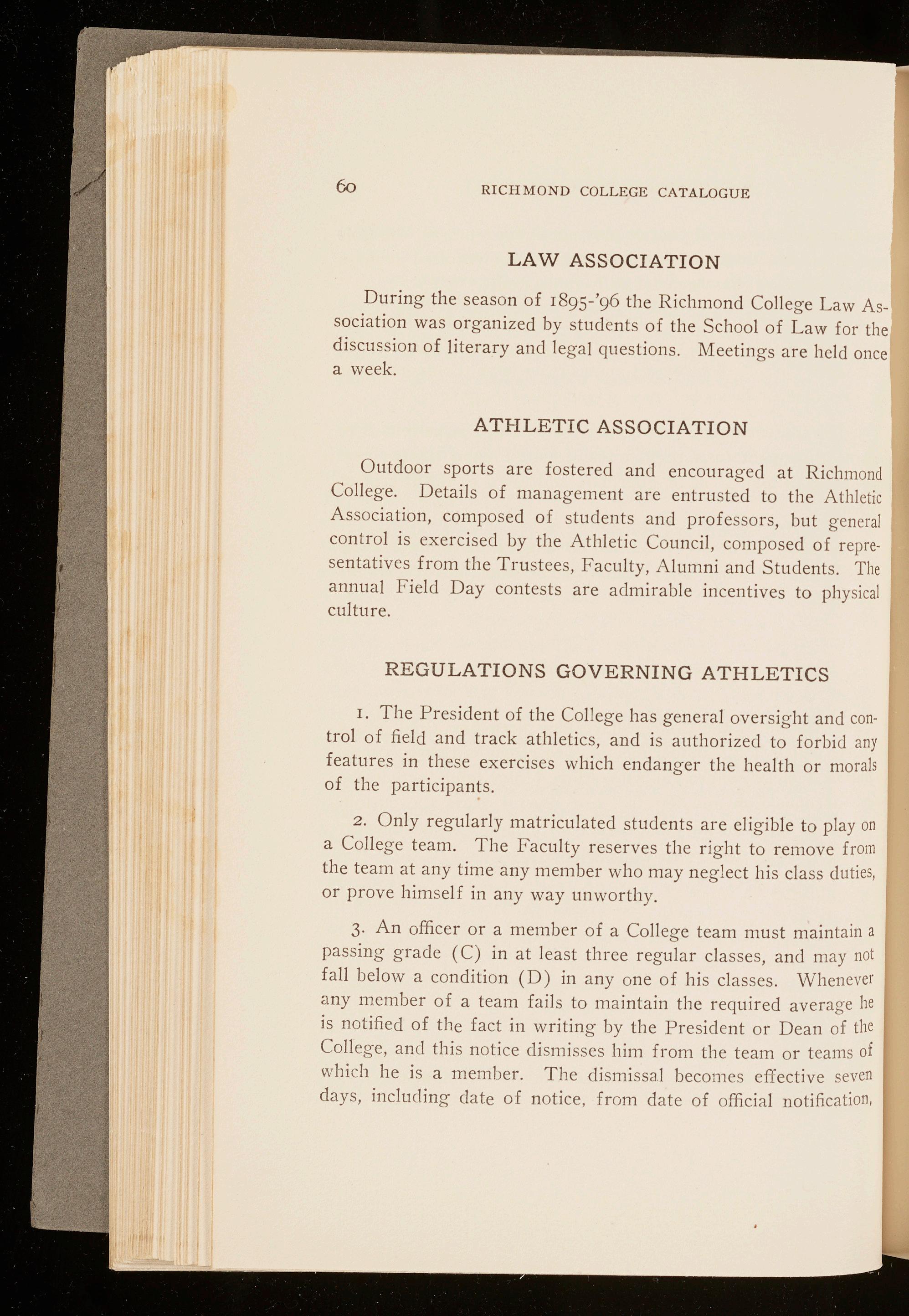
During the season of 1895-'96 the Richmond College Law Association was organized by students of the School of Law for the discussion of literary and lega l questions. Meetings are held once a week.
Outdoor sports are fostered and encouraged at Richmond College. Details of management are entrusted to the Athletic Association, composed of students and professors, but general control is exercised by the Athletic Council, composed of representatives from the Trustees, Faculty, Alumni and Students. The annual Field Day contests are admirable in cent ives to physical culture.
r. The President of the College has general oversight and control of field and track athletics, and is authorized to forbid any features in these exercises which endanger the health or morals of the participants.
2. Only regularly matriculated students are eligible t o play on a College team. The Faculty reserves the right to remove from the team at any time any member who may neglect his class duties, or prove him se lf in any way unworthy.
3. An officer or a member of a College team must maintain a passing grade ( C) in at least three regular classes, and may not fall below a condition ( D) in any one of his classes. Whenever any member of a team fails to maintain the required average he is notified of the fact in writing by the President or Dean of the College, and this notice dismisses him from the team or teams of which he is a member. The dismissal becomes effective seven clays, including elate of notice, from elate of officia l notification,
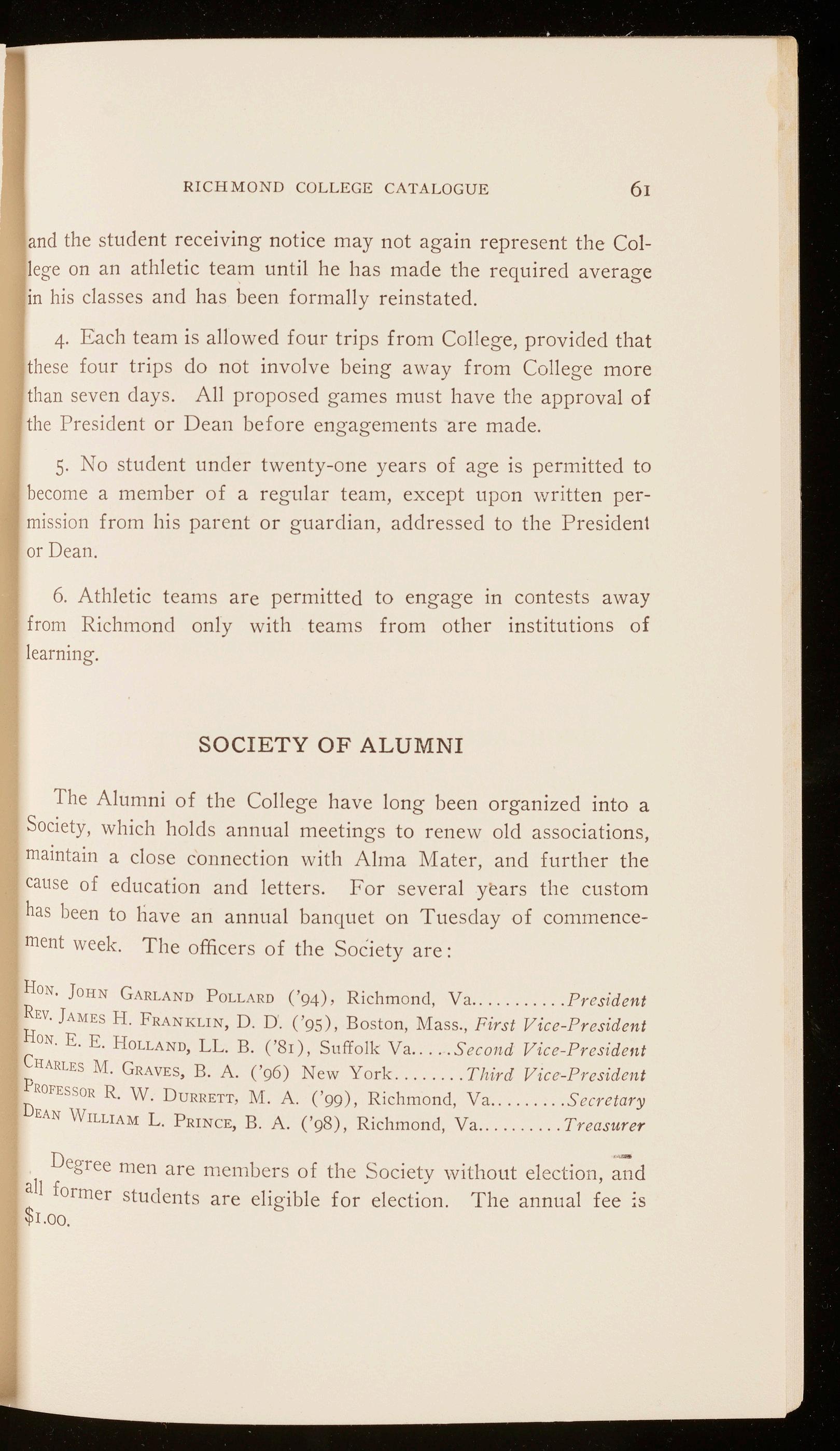
and the student receiving notice may not again represent the College on an athletic team until he has made the required average in his classes and has been formally reinstated.
4. Each team is allowed four trips from College, provided that these four trips do not involve being away from College more than seven days. All proposed games must have the approval of the Preside nt or Dean before engagements are made.
5. No student under twenty-one years of age is permitted to become a member of a regular team, except upon written permission from his parent or guardian, addressed to the President or Dean.
6. Athletic teams are permitted to engage in contests away from Richmond only with teams from other institutions of learning.
The Alumni of the College have long been organized into a Society, which holds annual meetings to renew old associations, maintain a close connection with Alma Mater, and further the cause of education and letters. For several years the custom has been to have an annual banquet on Tuesday of commencement week. The officers of the Society are:
HoN. ]OI-IN GARLAND POLLARD ('94), Richm ond , Va ......... President
REv.]AMES H. FRANKLIN, D. D. ('95), Boston, Mass., First Vice-President
HoN. E . E. HOLLAND, LL. B. ('81), Suffolk Va .... . Second Vice-President
CH ARLES M. GRAVES, B. A. ('96) New York ........ Third Vice-President
PROFESSOR R. W. DURRETT, M. A. ('99), Richmond , Va ........ Secretary
DEAN WILLIAM L P B A (' 8) R" l d V T . RINCE, . 9 , 1c 11110n , a.. . reasurer
Degree men are members of the Societv without election, ;;;d al! former students are eligible for electi~n. The annual fee :s $r.oo.

In May, 1898, there was organized in Louisville a Chapter o the General Society of Alumni, which is known as the "Kentuck Association of Richmond College Alumni." The present officer are Dr. E. S. Woody, Louisville, President; Dr. W. 0. Carver Louisville, Secretary and Treasurer.
In Feruary, 1899, the alumni resident in Norfolk, Va., and vicinity organized a "Nor folk Chapter of Richmond College Alumni." The chapter holds annual meetings in February . The present officers are S. T. Dickinson, Esq., Norfolk, President; C. W. Coleman, Esq., Churchland, Secretary and Treasurer.
In April, 1903, there was organized in Newport News, Va., a "Peninsula Chapter of Richmond College Alumni." Th e chapter holds annual meetings.
During the session of 1905-'06 alumni chapters were organized in Richmond, Baltimore, Lynchburg and Roanoke.
The West Virginia Chapter was organized October, 191r, at Hinton, W. Va., with J. W. Mitchell, M. L. Wood, and W. L. Richardson as officers.
The Richmond Chapter holds its annual meeting on March 4th, "Founders' Day." The officers of the Chapter are Cary Ellis Stern, Esq., President; Prof. W. L. Prince, Vice-President; Claude M. Dean, Secretary-Treasurer.
The President of the College will be glad to correspond with alumni who desire to form local associations.
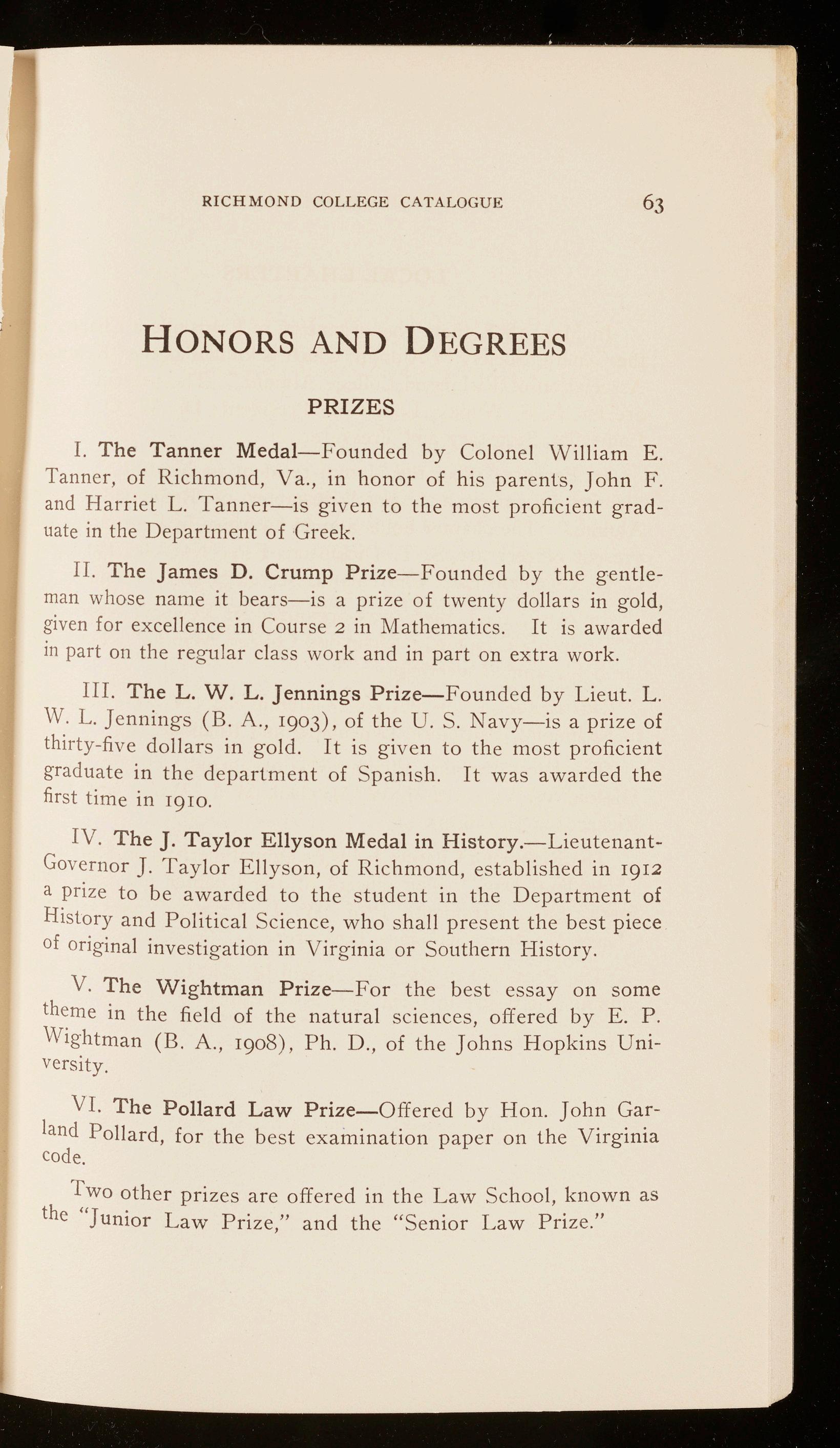
I. The Tanner Medal-Found e d by Colonel William E. Tanner, of Richmond, Va., in honor of hi s parents, John F. and Harriet L. Tanner-is given to the most proficient graduate in the Department of Gree k.
II. The James D. Crump Prize-F ounded by the gentleman whose name it bears-is a prize of twenty dollars in gold, given for excellence in Course 2 in Mathematics. It is awarded in part on the r egular class work and in part on extra wo rk.
III. The L. W. L. Jennings Prize-Found ed by Lieut. L. W. L. Jennings (B. A , 1903), of the U.S. Navy-is a prize of thirty-five dollars in go ld . It is given to the most proficient graduate in the department of Spa ni s h. It was awarded the first time in 1910.
IV. The J. Taylor Ellyson Medal in History.-Li eutenantGovernor J. Taylor Ellyson, of Richmond, estab li s h ed in 1912 a prize to be awarded to the student in the Department of History and Political Science, who s hall present the best piece of origina l investigation in Vi r g ini a or Southern History.
V. The Wightman Prize-For the best essay on some theme in the field of the natural sciences, offered by E. P. Wightman (B. A., 1908), Ph. D., of the Johns Hopkins University.
VI. The Pollard Law Prize-Off ered by Hon. John Garland Pollard, for the best exa mination paper on the Virginia code.
Two othe r prizes are offered in the Law Schoo l, known as th e "Junior Law Prize" and th e "Senior Law Prize ." '
In response to a petition from the student body, the members of the Faculty, who are also members of the scholarship society known as the Phi Beta Kappa Society, have organized a scholarship society in Richmond College to be known as the Arachnidae. These charter members recommend to the Faculty as a whole for election those students who have attained the proper qualifications. In order to qualify, a student must have an average grade , for all of his work of 90 per cent., and he must further belong to the first six of the class on the basis of scholarship and he must have good character.
The elections of the preceding four years are as follows:
Class of 1910-R. C. Ancarrow, R. A. Brock, Miss Frances Coffee, T. C. Durham, and C. D. Miller.
Class of rgrr-J. W. Decker, J. B. Duval, R. C. Duval, Miss Virginia Robertson, R. G. Smith, and Miss Ruth Thomasson.
Class of 1912-E. G. Ancarrow, W. H. Davis, Frank Gaines, H. E. Owings, E. P. T. Tyndall, and Miss Jessie Wood.
Class of 1913-J. W. Elliott, J. A. George, Miss Marion Mansell, and E. C. Primm.
Class of 1914-Miss Louise Baldwin, E. N. Gardner, S. J. Rowland, Miss Alice Spiers, C. C. Webster, C. H. Willis, and R. S. Wingfield.

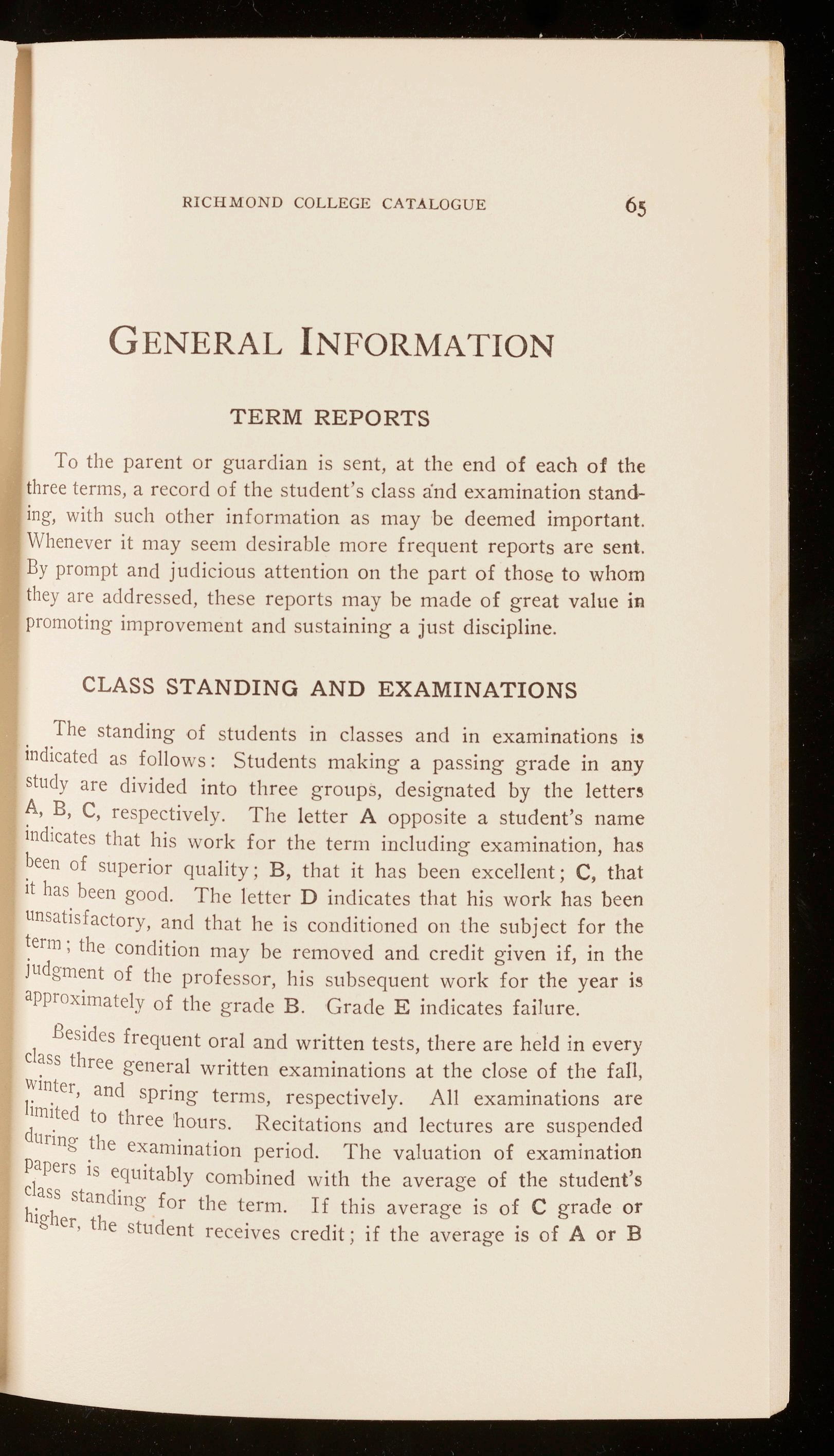
RICHMOND COLLEGE CATALOGUE
To the parent or guardian is sent, at the end of each of the three terms, a record of the student's class and examination standing, with such other information as may be deemed important. Whenever it may seem desirable more frequent reports are sent. By prompt and judicious attention on the part of those to whom they are addressed, these reports may be made of great value in promoting improvement and sustaining a just discipline.
The standing of students in classes and in examinations i!! indicated as follows: Students making a passing grade in any study are divided into three groups, designated by the letter!! A, B, C, respectively. The letter A opposite a student's name indicates that his work for the term including examination, has been of superior quality; B, that it has been excellent; C, that it has been good. The letter D indicates that his work has been unsatisfactory, and that he is conditioned on the subject for the :erm; the condition may be removed and credit given if, in the Judgment of the professor, his subsequent work for the year is approximately of the grade B. Grade E indicates failure.
Besides frequent oral and written tests, there are held in every class three general written examinations at the close of the fall, winter, and sprine- terms respectively. All examinations are r . , imited to three 'hours. Recitations and lectures are suspended durino- ti . . . . f . . o 1e exammation period. The valuat1011 o exammation papers is equitably combined with the average of the student's ~l_assst anding for the term. If this average is of C grade or igher, the student receives credit· if the averao-e is of A or B ' b

RICHMOND COLLEGE CATALOGUE
grade, the student passes with distinction. If the condition ( D on the work of a term is not removed in the manner indicate ~ above, the term's work, to be credited, must be taken a second time. Only those students who attain at least the grade of C are entitled to points in the estimates for degrees.
All candidates for College honors of any kind are expected to maintain at least the grade of C in their classes. This grade is expected of every student who wishes to appear before the publio in a representative capacity, as member or manager of any team,
Students who fail to make the regular examination, or for any reason do not stand these examinations, have no right to pass to the next higher class in a department. Special examinations may be granted only by a vote of the Faculty. All special examina· tions for entrance to 'higher classes must take place within the ten days beginning with the Tuesday preceding the opening of the College session (September 14-24).
Except in the case of new students applying for entrance to advanced classes and of candidates for degrees of the current session, students will be required to pay a fee of one dollar for each special examination, and the Treasurer's receipt for the fee must be presented to the professor before the special examination will be given.
1n the College of Liberal Arts the degrees of Bachelor of Arts ( B. A.), Bachelor of Science ( B. S.), and Master of Arts ( M. A.), are offered. The candidate for a bachelor's degree must complete, before graduation, sixty hours of college work. One class period per week for the session is the unit. Most classes meet three times a week, and a class year, therefore, unless other• wise stated, counts three hours. Classes in the physical sciencesChemistry, Physics, Biology-count four hours each. A total of fifteen hours a week is regarded as the standard amount of work, twelve hours the minimum, and eighteen hours the maximum.
Sixty hours of college work are required, distributed as follows:
1. All candidates for the degree must take six hours in English, three hours in History, three hours in Mathematics, three hours in Latin ( or six hours in Greek), nine hours in French and German, and four hours in each of two of the sciences, Physics, Chemistry, and Biology. A student who takes both Latin and Greek may choose between French and German, taking six hours in the one chosen.
All the required work in English, History, Mathematics, Latin and Greek, and at least part of the work in French and German, and in science must be completed by the end of the Sophomore year.
2. In addition to the specific requirements just mentioned, the student must, before the beginning of his Junior year, and with the advice and approval of the Committee on Courses and Degrees, choose two MAJOR SUBJECTS from the following list: English (12 hours), History (9 hours), Mathematics (9 hours), Latin (9 hours), Greek ( 12 hours), Physics ( 12 hours), Chemistry (12 hour s) , Biology (12 hours), French and German (15 hours), Philosophy (9 hours).
3. Of the remaining hours all but three must be chosen from courses intended primarily for Juniors and Seniors.
Sixty hours of college work are required, distributed as follows:
r. All candidates for the degree must take twelve hours in French and German, six hours in English, three hours in Philosophy, six hours in Mathematics, four hours in Physics, four hours in Chem istry, and four hours in Biology.


The required work in English, Mathematics, and Philosophy and in two of the sciences, and half of the work in French and German must be completed by the end of the Sophomore year
2. In addition to the specific requirements just mentioned tht student must before the beginning of his Junior year, and wit the advice and approval of the Committee on Courses and Degrees, choose two MAJOR SUBJECTS from the following list: Mathematics (9 hours), Physics ( 12 hours), Chemistry ( 12 hours), Biology (12 hours).
3. Of the remaining hours all but three must be chosen from courses intended primarily for Juniors and Seniors.
NoTE: The number of hours required for a major includes the hours previously specified in that subject.
The applicant for the degree of Master of Arts must previously have met all requirements for the Bachelor's degree. In addition to this, he must obtain from the Faculty at the beginning of the session, in which he expects to take the M. A. degree, formal approval of his course of study, which shall constitute a full year of work, none of which shall have been offered for the Bachelor's degree. This course must include such advanced classes as may be approved by the Committee on Courses and Degrees. No part of the work offered for the M. A. degree shall be done in absentia. The candidate for the M. A. degree must submit to the Faculty not later than May rst preceding the close of his course of study a tpyewritten or printed thesis on some topic within the field of his year's work. This thesis must show an intelligent grasp of subject and the power of original investigation. The subject of the thesis must be submitted to the Faculty within two months from the date on which the candidate is notified of the approval of his course of study.
The holder of a Bachelor's degree from another institution of learning who enters Richmond College as a candidate for the degree of Master of Arts, must first satisfy the Faculty that his
previous scholastic work is equivalent in amount and quality to that required for a Bachelor's degree in this institution. He will then be accepted as a candidate for the M. A. degree, on the conditions prescribed for graduates of this college.
FIRST YEAR
Math. 1
Eng. I
Latin I
Frch. 1
Hist. 1
Math. I
Eng. 1
Latin I
Frch. I
Hist. 1
Math. 1
Eng. I
Latin I
Grk. I
Hist. 1

SECOND YEAR
Latin 2
Frch. 2
Eng. 2
Chem. 1
Hist. 2
Eng. 2
Frrh. 2
Phys. I
Hi st. 2
Math. 2
Grk. 2
Eng. 2
Ger. I
Phys. 1 Phil. I
THIRD YEAR
Latin 3
Ger. 1
Eng. 3
Phil. 2 Pol. Sci.
Eng. 3
Ger. 1 Eco.
Socio!. Math. 3
Grk. 3
Ger. 2 Chem. 1 Socio!. Phil. 2
FOURTH YEAR
Socio!.
Ger. 2
Biol. Eco. Hist. 4
Eng. 4
Ger. 2 Chem. r Phil 2 Educ.
Grk. 4
Eng. 3
Pol. Sci. Bible Phil. 3
FIRST YEAR
Math. I
Eng. I
Frch . 1
Chem. I Phil. 1
Math. r
Eng. r Phil. I
Chem. r
Frch. I
SECOND YEAR
Chem. 2
Eng. 2 Frch. 2
Math. 2
Biol. 1
Math. 2 Eng. 2 Frch . 2
Drawing Phys. 1
THIRD YEAR
Phy s 1
Pol. Sci.
Ger. 1
Drawing Biol. 2
Math. 3
Ger. r Pol. Sci.
Drawing Phys. 2
FOURTH YEAR
Chem. 3
Ger. 2
Phil 2
Eco. Biol. 3
Ger. 2
Hist. 2 Biol. r
Socio!. Phys. 3
Two-year co ur ses prepa r atory to Medicine, Enginee r ing, and L aw.

Eng. 2 Pol. Sci. 2 Econ. 1 Pub. S. 1
Chem. r ( or P hys 1)
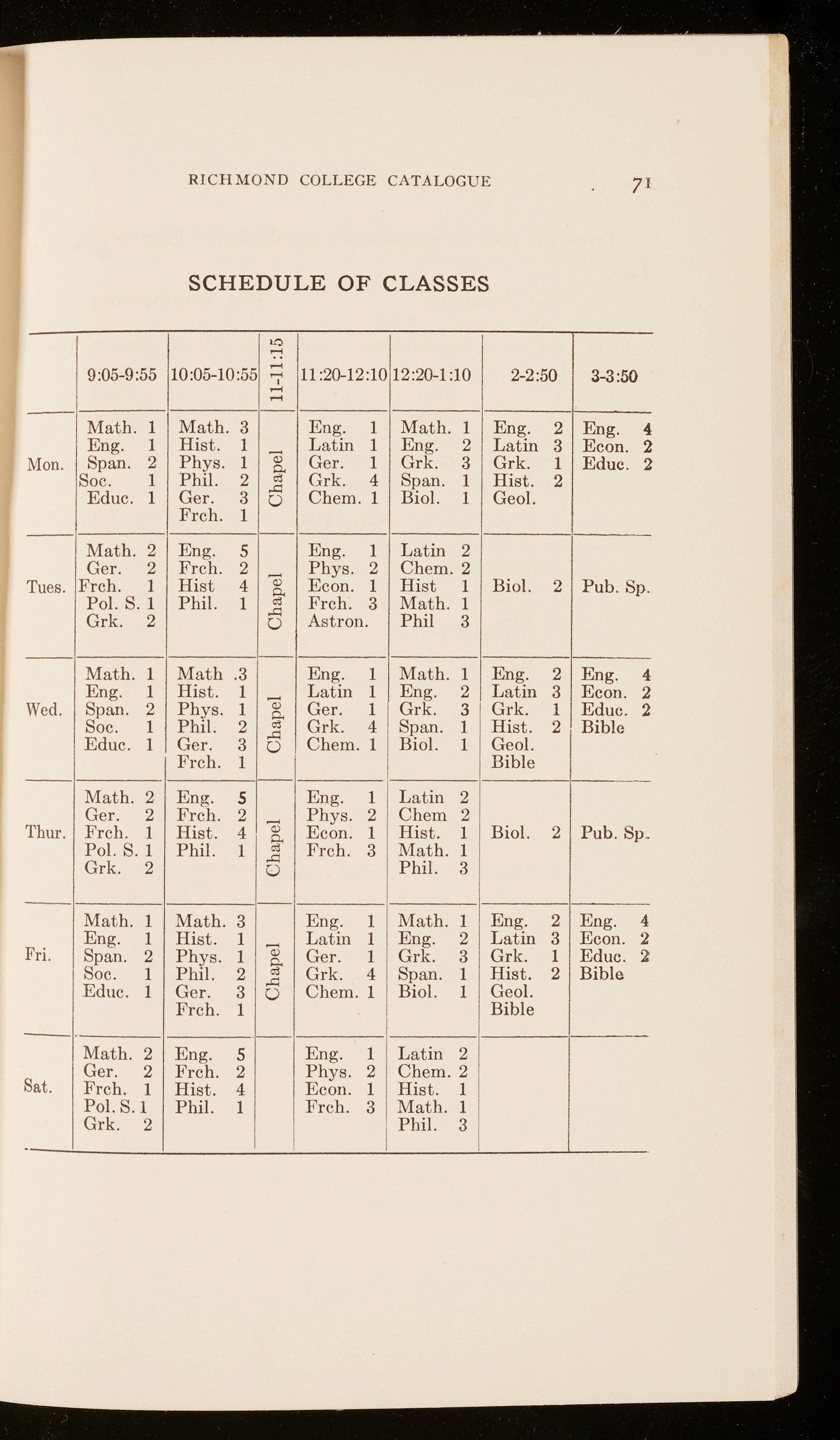
9:05-9:55 10:05-10:55 ,..... 11:20-12:10 12:20-1:10 2-2:50 3-3:50 ,.....
Math 1 Math. 3 Eng. 1 Math. 1 Eng. 2 Eng. 4 Eng. 1 Hist. 1 Q) Latin 1 Eng. 2 Latin 3 Econ. 2 Mon. Span. 2 Phys. 1 p. Ger. 1 Grk. 3 Grk. 1 Educ. 2 Soc. 1 Phil. 2 ol Grk. 4 Span. 1 Hist. 2 ..c:: Educ. 1 Ger . 3 0 Chem. 1 Biol. 1 Geo!. Frch. 1
Math. 2 Eng. 5 Eng. 1 Latin 2 Ger. 2 Frch. 2 Q) Phys. 2 Chem. 2 Tues. Frch. 1 Hist 4 p. Econ. 1 Hist 1 Biol. 2 Pub. Sp. Pol. S. 1 Phil. 1 ol Frch. 3 Math. 1 ..c:: Grk. 2 0 Astron. Phil 3
Math. 1 Math 3 Eng. 1 Math. 1 Eng. 2 Eng . 4 Eng. 1 Hist. 1 Q) Latin 1 Eng. 2 Latin 3 Econ 2 ed. Span . 2 Phys. 1 Ger. 1 Grk. 3 Grk. 1 Educ. 2 Soc. 1 Phil. 2 ..c:: Grk. 4 Span. 1 Hist. 2 Bible Educ. 1 Ger. 3 0 Chem. 1 Biol. 1 Geo!. w Frch. 1 Bible
T
Math. 2 Eng. 5 Eng. 1 Latin 2 Ger. 2 Frch. 2 Q) Phys. 2 Chem 2 bur. Frch. 1 Hist. 4 Econ. 1 Hist. 1 Biol. 2 Pub. Sp Pol. S. 1 Phil. 1 ..c:: Frch. 3 Math. 1 Grk. 2 0 Phil. 3
Math. 1 Math. 3 Eng. 1 Math. 1 Eng. 2 Eng. 4 Eng. 1 Hist. 1 Q) Latin 1 Eng. 2 Latin 3 Econ. 2 •ri. Span. 2 Phys. 1 Ger. 1 Grk. 3 Grk. 1 Educ. 2 Soc. 1 Phil. 2 ..c:: Grk. 4 Span. 1 Hist. 2 Bible Educ. 1 Ger. 3 0 Chem. 1 Biol. 1 Geo!.
F Frch. 1 Bible
Math. 2 Eng. 5 Eng. 1 Latin 2 Ger. 2 Frch. 2 Phys 2 Chem. 2 at. Frch. 1 Hist. 4 Econ. 1 Hist. 1 s Pol. S. 1 Phil. 1 Frch. 3 Math . 1 Grk. 2 Phil. 3

The following classes wi ll come at t he same time in alternat, years: Pol. S. r and 2; Hist. 2 and 3; Hist. 4 a nd S ; Che m. : and 3; Bio l. 2 and 3 ; P h ys. 2 and 3; Phi l. 3 a nd 4; and Eng lisl 3 and 5.
The Regular Laboratory Hours for Physics, Ch em istry Biology, and Psychology are as fo llO\vs:
Physics I l a)-Tues. and Thurs., 9 to II and 2 to 4.
Chemistry I (a)-Tu es . and Thurs., 9 1.o Ir and 2 to 4.
Chemistry 2 (a)-Mon. and Wed., 2 to 4.
Chemistry 3 (a)-Mon., Wed., Fri., 2 to 4.
Bio log y I (a)-Tues. a nd Thur ., I 1 :20 to 1 :ro; Mo n . and Wed ., 2 t o 4.
Philosophy 2 (a)-Mon ., 2 to 4.
It is expected that all laborat o ry work in the se courses will be done in the assigned h ou rs.
Laboratory Hours for the m ore advanced cour es will be assigned at the opening of the cs ion.
Dormitory No. r consi t s of a group of five non-communicating buildings under one roof. The five sec ti o n are de s ignated by the letters A, B, C, D, and E. Dormitory 'o. 2 has four sections. The construction is of brick and sto ne with s teel frame enca sed in concrete. The Ooors are reinfor ced co ncrete, overlaid with cypre ss. The partitions a re hollow til e, and the stairways have steel frame with s late tread s. The casements are of bronze. Toilets and baths are finished throughout in marble, \\'ith the best modern fixtures. The building is lighted with electricity and heated with hot water. Attention ha s every\\'hcre been paid to safety, health, and comfort. The 1.wo dormitory groups cost about $200,000.
The prices named be low include rent of r oom for nine months, light, heat, water, and servants' attendance, but do n ot incl ude furniture. A lar ge wardrobe closet built in the wall of th e room is provided for each occupant.
Dormitory No. 1
Rooms for two stude n ts, each expected to pay half:
$6o.oo-AI, A2, B3, B9, C3, CII.
$65.oo-A4 B6, Bio, C4, C7, Cm, C12a.
$70.oo-A7, A8, Ar2, Brr, B14, D5, E2.
$75.oo-C6, D 1r, E6.
$8o.oo-D8.
Rooms fo r one stude n t:
$45.oo-C2, C9, Ero.
$50.00-Arn, B7, B[2, Bis, B16, Br7, B12a, C8, C15, D2.
$55.00--As, A6, All, B1, B2, B8, B[2a, Cs, C12, C14, Dr, Eu.
$6o.oo- A3, A9, Cr, Dr9, Er, E4, E8.
$65.oo--D3, D4, D6, D9.
$70.oo-C12, E3, DIO, E9.
$75.00---Es, E7.
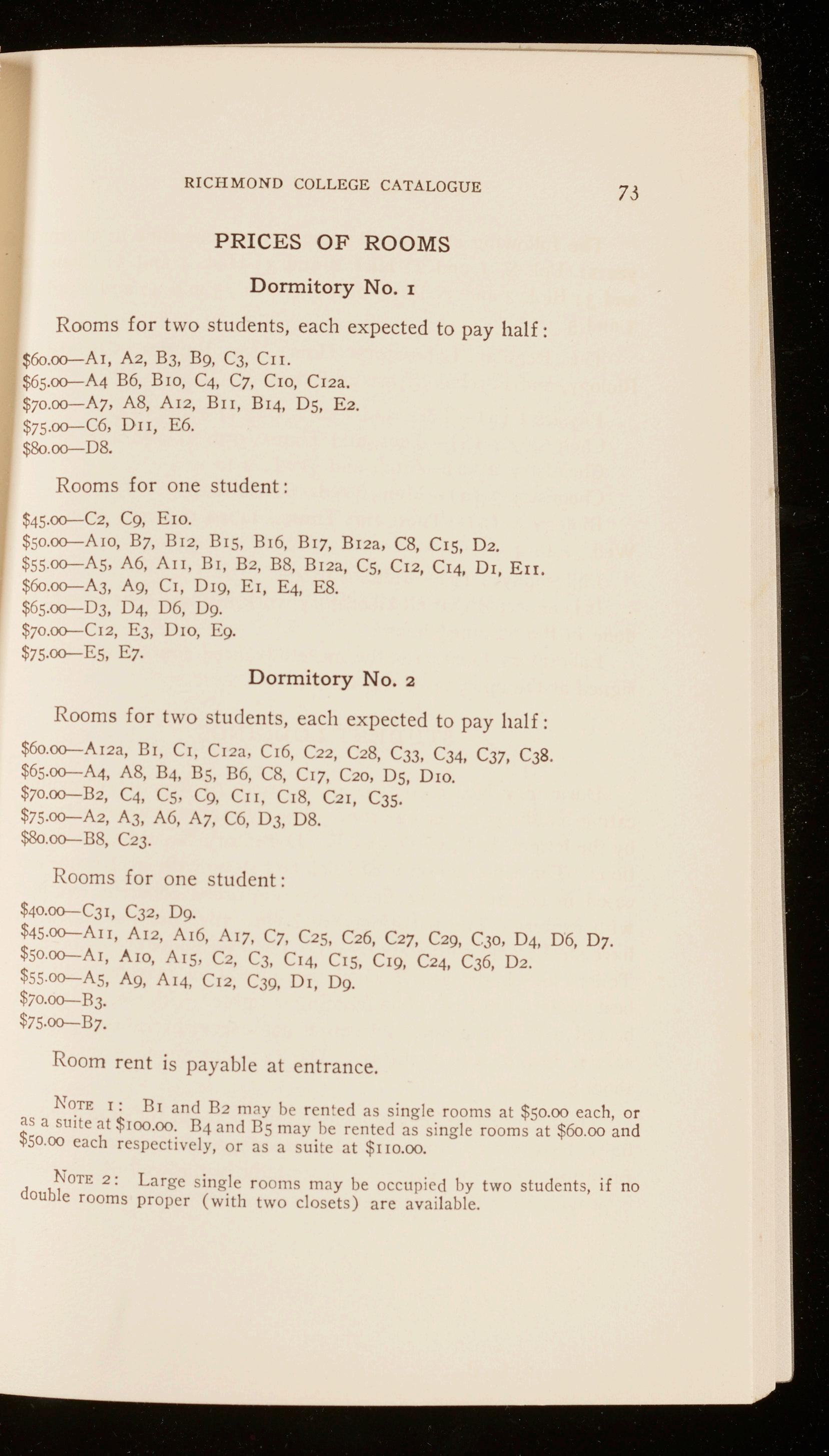
Dormitory No . 2
Rooms for two tudents, each expected to pay half:
$6o.oo--Ar2a, Br, Cr, Cr2a, Cr6, C22, C28, C33, C34, C37, C38.
$65.oo--A4, A8, B4, Bs , B6, C8, C17, C20, Ds, DIO.
$70.oo--B2, C4, Cs, C9, Cr I, C,8, C2r, C35.
$75.oo--A2, A3, A6, A7, C6, D3, D8.
$8o.oo--B8, C23.
Rooms for one stude n t:
$40.oo-C3 I' C32, D9
$45.oo-A1r, A12, A16, Ar7, C7, C25, C26, C27, C29, C30, D4, D6, D7.
$50.00--Ar, Aw, A15, C2, C3, C14, Crs, Cr9, C24, C36, D2.
$55.00--A5, A9, A14, Cr2, C39, D1, D9.
$70.00--B3.
$75.00--B7.
Room rent is payable at entrance.
NOTE I: Br and B2 may be ren ted as single rooms at $50.00 each, or as a suite at $100.00. B..iand B5 may be r ented as single rooms at $6o.oo and $50.00 each re spectively, or as a su ite at $uo.oo.
NoTE 2: Large s ing le r ooms m ay be occupied by two students, if no double rooms proper (with two closets) are available.

Matriculation. -lncluding ·ntrance fee, u se of p u b li rooms, attendance, and all college privileges, $20.00. This fe must be paid at entrance, i · not subject to deduction, no r in any case refunded. _ tudcnts enterino- after the fall term pay three-fourth of this fee. Tho _ e who enter for the pring term pay on ly h alf of the fee.
Tuition. -$100.00. Tuition has been fixed a t $100.00, rega r d le of th e nu mbe r f lass s take n by t he st u dent. \V h eneve r , fo r specia l reas ns, a student is permitte<l to take one c lass on ly, the tuition fee wil l be 25.00. The tuition fee is payable one-half on entrance, the balance 1st of February, s u bject to deduction for time lost by late entrance or by sickne , if the time ·o lost be two consecutiYe months or more , but not subject to deduction for other causes or for less time.
Contin ge nt F ee .- , \ fee f $5.00 is charged ea -h student to coyer unnecessary damag · to c liege prop rty, loss of book s from the l ibrary, etc. Such pa r t of this fee as is un u sed is returned to the student at clos · of sc sion.
A t h l e ti c F ee .-This fee of $10.00 was established upon petition of students and alumni. The fee coYers membership in the Athletic As ociation and admit to all games pla)ed by the -ollege teams in Richmond. The fee i-; not refundable Students entering after the beginning of the \\ . inter Term pay half of this fee.
Board -.' tudcnts ha, c th· 1 rivilegc of taking th ir meals at the College Refectory, a handsome, wcl l-e quipp d building located near the dormitori •-;. Th Hcfectory ac ommodatcs about two hundred and t\\' ·nty stud nts. Table board is fur· nishecl at a cost not xcccding 14.00 a month. Payment i r quired monthly in a<h ancc. . ro deduction is mad except when the . tudent is absent from the R fectory a. long as one full week on lea\'e authorized by college authority.
Students resident in the city may obtain lunch by the week at the rate of 20 cents a meal, payable in advance. The charge for single meals is 25 cents.
am s and addresses of per s ons willing to rec eive s tudent boarders in their hom es will be furnished up o n application. List is u sua ll y r ady August r. t.
Economica l Liber al Estimate. E stimate .

Matri cu latio n F cc
Tuition
Contingent Fee ...................
Ath l etic Fee ..................
Room, furniture, fuel, light, laundry and in c identals.
Table board
Book
lt will be noti ce d that the fir ·t four it e m s arc invariable . These it e m · arc th same for a ll students. Other expenses vary according to ta s te and finan c ial ability of st udent
These es timat es in c lude cyery ne ce ' sa ry expenditure except cloth in g and tra\·eling expe n ses, and lab o ratory fees for such st ud e nt s as take laborat ory c lasses.
Sc h o lar s hip students, or candidate· for th e mini try , since they pay n o tuiti o n. sho uld deduct one hundred dollar from the totals given abo\·c.
Matriculation Fee
Co nt ingent Fee
Ath letic Fee
Tu ition for entire scs, in n
20 00
Tnta l . . . .. $135 oo

The Matricu l ation, Contingen t and At hl et i c Fees, and one h a lf of Tuition, are payable at date of entra n ce. The seco n half of t u ition is payable February rst.
Diplo m a Fe e.-Fo r every Bache l or's Dip loma awarded the charge is $5.00. For a Ma ter's Dip l oma and Hood th e charge is $10.00.
Students who take degrees are required to pay for the Degree Diplomas. No honors are announced at Commencement unless all fees have been satisfactorily settled.
La bo rato ry F e es .- S tudent who take Chemi try, Bio l ogy, or Physics, are required to pay a fee of $5 .00 for l aboratory expenses in each class.
Students need not keep money about their persons or in their rooms, but may, with o ut expen e, depo s it it for safekeeping with an officer of the College. ome students open an account with one of the city banks, and thi p l an is strongly commended by the College authorities.
Ministers of the Gospel of al l denomination , and young men duly approved by their churches as candidates for the mini s try, are admitted free of charge for tuition. They pay matriculation fee, and for fuel, light, board, etc ., the same with other tudents.
The Education Board of the Virginia Bapti t General A. sociation will r ende r further a ista nce to worthy y ung men recomm e nded by churches which ontribute to the Board, and accepted after examination For further information on this matter, address Hon. J. Taylor Ellyson, Corresponding Secretary, Richmond, Virginia.

The funds are divided into Scho lars hip s and Donatio n s. The Scholarships pay tuition; the Donations are u sed to pay table board of approved students for the Baptist m1111stry. Mini s teria l students, of whatever denomination, are not char g ed for tuition.
The Trustees hold invested funds the income of which is used to pay the tuition of worthy students who are not financially able to pay a ll col l ege cha r ge . A major scholarship pays the full tuition charge of $100. A minor scho larship pays $50 on tuition. The gift of $2,000 founds a major scholarship, and such gift arc earnestly de ired.
Two Memorial Scholarships, $1,000 each, founded by the Baptists of Virginia.
The Scholarship of the First Baptist Church, Richmond , $1,000.
The Joseph E. Brown Scholarship, $ r ,ooo founded by Senator Brown, of Georgia.
The Brunet Scholarship , $1,000, given by Mrs. Sarah A. Brunet, Norfolk, Va.
The Davidson Scholarship, $r,ooo, founded by Mrs. M. E. David s on, Millboro Spring . , Va.
The two West Scholarships, $2,500, founded by Mr. George B. \,V est, Newport cws, Va.
The Fannie Lea Half Scholarship, $500, given by Mr. and Mrs. Lea , of orth arolina.
The A. M. Poindexter Half Scholarship, $500, founded by the Dan River Baptist Association.
R[CfDIO;-.;o

COLLEGE C. \T \LOC UE
The Elizabeth Stetson Aid Fund, $5,000, given by John B Stetson, of Philadelphia, in honor of his wife.
The Ella Williams Student Aid Fund, 5,000, gi\·en by th , late Thomas C. \Villiam s, of Richmond, in memory of hi, daughter.
The William Hawkins Fund, $2,000 , founded by the gentle man whose name its bear -a Philadelphian-to aid in e ducating godly, studious, desen ing young men.
The Chambers Sisson ( ·ulpeper, \ ' a.) Half Scholarship, $500, founded by th e gent leman whose name it bears.
T he J.B. Jeter Scholarship, $1,200, beque . t f i1rs. Mary C. J ete r, in memory of her hu sband, Re\ . J. B. Jeter, D. D., one o f the founders of the o ll ege, a nd I ng Presicl nt of the co rporati on.
The Elizabeth R. West Fund, $2, , stab lishccl by i\lr . George B. \\T st, of Newport rews, Va.
The H. Evelina Walker ( King ancl Queen ·ounty) Scholarship, $1,200.
The Gustavus Milhiser ( Richmond) Scholarship, $r ,000 , used for the benefit of the Richmond Iligh .·chool.
The Sarah B. Watson Scholarship , of S r ,ooo, founded by George B. \Vest, of Xewport X ws, Va.
The A. E. Dickinson ( IZichmoncl) Scholarship, ,1 1,00 0 , founded by the minister whos ' name it bears.
The N. W. Bowe (Richmond) Scholarship, established by the gent leman whose name it bears.
The John T. Griffin (Church lancl, Va.) Scholarship, $r,500, in honor of his wife.
The Court Street Church Scholarship, Port-.;mouth, Va., $1,000.
The C. C. Broaddus (Bow lin g Green, Va.) Half Scholarship, $500, in memory of hi wife and daughter.

Du ring 1905-'ou th e following full sc holar sh ip s were established:
The Grace Street Baptist Church Scholarship.
The South Boston Baptist Church Scholarship
The First Baptist Church ( of J o rfolk ) Scholarship .
The Fork Union Academy Scholarship.
The George W. Riggan Scholarship, by friends m the Portsmouth Associa ti on.
The Samuel Thomas Dickinson Scholarship, by the alumnus who'-e name it bears .
The I. B. Lake Scholarship , by the C'pper\'illc Baptist Church, in honor of their pastor.
The James T. Borum Scholarship, by the gen tl eman whose name it hears.
The Joseph Bryan Scholarship, founded b) the donor for the benefit of descn ing students from Richmond.
The following scholarships ha\ e been established in recent years, and may he used al the option of the Trustees or the donors for the benefit either of young men or young women. To scholarships ha\·c yet be n founded specifically for the benefit of \\ "csthampton ·o llcgc students. The President of the College wi ll furnish blank form of app li cation for scho larhip.
A Scholarship fo und ed by Mrs .. a rah B. Kidd.
A Scholarship founded by 1rs. . D. Goodwin, of Ora nge County.
A Scholarship founded by the Pinc Street Baptist Ch ur c h of Richmond.
A Scholarship founded by hi s wife in honor of Judge Robert H. Beale, of \V e.·tmorc land ounty.

A Special Scholarship founded by Mr. J. J. Montague, of Richmond , to be us ed at the option o f the donor either in Richm ond College o r in the Richmond Academy.
The William Thomas Hudgins Scholarship, founded by Mr. T. Archibald Cary, of Richmond.
The Susan E. Starke Scholarship, founded by Mr. E. D. Starke, of Richmond, in honor of his deceased w ife.
A Scholarship of $1,000, founded by a lady who prefers to be kn own as "A Fr iend of Christian Educatio n. "
During 1910 the scho la r ships named below were completed and are now available for u e. In most case the nomination to th e benefits is in the hands of the donor during his li fetime :
The Frances Ann Leiper Crouch Scholarship, founded by Dr. R. G. Crouch in honor o f his wife.
The Luther Wright George Scholarship, founded by Mr . H. H. George, Jr. in memory o f his son, who, at the time of his lam ented death by accident, was a st ud ent in Richmond College.
The Eva Baker Gwathmey Scholarship, founded by Mr . Basil M. Gwathmey, of Richmond.
The Robert Eugene Lockett Scholarship, founded by his par ents, Capt. E. F . and 1r . Lucy Lockett, of Crewe, Va ., to h onor the memory of their son, a former student of Richmond College.
A Scholarship estab li shed by Mrs. Mary E. Winch and Mrs. Kate R. \Vinch, of Richmond.
A Scholarship established by Mr. W. E. Harris, of Richmond.
A Scholarship established by Mr. P. A. Fore, of Richmond.
A Scholarship established by Mr. and Mrs. E. T. Ivey, of Newport News, Va.

A Special Scholarship founded by Mr. R. L. Barnes, of Richmond.
A Scholarship founded by Mrs. Martha P. Taylor, of Newport News, Va.
A Scholarship founded by Mr. Skye V. Straley, of Princeton, \V. Va.
A Scholarship founded by Mr. John P. Branch, of Richmond, for the benefit of a student to be appointed by the stewards of Centenary Methodist Episcopal Church, Richmond, Va.
The John P. Branch Scholarship, founded by Mr. M. C. Branch, of Richmond.
The E. Carrington Cabell Scholarship, founded by Mr. H. L. Cabell, of h.ichmond, in honor of his brother a distinguished alumnus of Richmond College.
The William F. Harwood Scholarship founded by Col. John S. Harwood and Mr. R. H. Harwood, in honor of their father.
The Alonzo L. Phillips Scholarship, $1,000, founded by the gentleman whose name it bears.
In 191 I the following cholarships and other aid funds were established :
The Sarah Jane Bagby Scholarship, founded by her son, Mr. Chas. T. Bagby, of Baltimore, Md.
The Appomattox Association Scholarship, established by the churches of the Appomattox A sociation.
The Simon Seward Scholarship, giYen by the gentleman whose name it bears.
The J. R. Paschall Scholarship, established by the gentleman whose name it bear .
The Mrs. E. A. Colston Scholarship, founded by her husband, and for the benefit of a woman student.

The William Fayette Fox Scholarship, established by the students and teachers of the Richmond Public Schools in honor of their beloved Superintendent.
The Milton Cayce Scholarship, founded by Mrs. Lelia G. Hutcheson in honor of her father.
The Raleigh C. Forbes Fellowship Fund of $3,000, established by Mr. and Mrs. W. S. Forbes, of Richmond, Va., in memory of their son.
In 1912 the following scholarships were completed and are now available:
The Sarah B. Watson Scholarship Fund of $2,500, founded by George B. West, of Newport News.
The Emma Lewis Bowe Memorial Scholarship of $1,000, founded by her father and mother, Mr. and Mrs. N. W. Bowe
The Jessie Gresham Pollard Scholarship of $1,000, founded in honor of their mother by H. R. Pollard, Jr., and James J. Pollard.
The H. C. Taylor Endowment Scholarship of $1,000, founded by H. C. Taylor, of Black Ridge, Va.
The Henry Jones Memorial Scholarship, founded by his daughters, Mrs. Livius Lankford, of Norfolk, Va., and Mrs. W. C. Taylor, of Clarksburg, W. Va.
A Scholarship founded by the "Junior Aid Society," of Freemason Street Baptist Church, of Norfolk, Va.
In 1913 the following scholarships were established:
A Scholarship, founded by Miss Grace Arents, Richmond, Va.
A Scholarship, founded by R. S. Barbour, South Boston, Va.
A Scholarship, founded by Frank B. Bell, Machipongo, Va.

A Scholarship, founded by Charles J. Billups, Richmond, Va., in memory of his father, L. W. Billups.
"The Sallie G. Bundy Memorial Scholarship," founded by J G. Bundy, Tazewell, Va.
A Scholarship, founded by Bethel Church, Accomac Associatio n.
A Scholarship, founded by l\Irs. :i\Iattie E. Bosher, Richmond, Va.
"Th e Mildred Bugg Scholarship," founded by her father and mother, Mr. and Mrs. B. L. Bugg, of Atlanta, Ga.
A Scholarship, founded by R. J. Camp, Franklin, Va.
The J. L. Camp Scholarship, founded by J. L. Camp, Franklin, Va.
The "Mrs. Carrie S. Camp Scholarship," founded by J. L. Cam p, Frank lin, Va.
The "P. D. Camp Scholarship ," founded by P. D. Camp, Franklin, Va.
The Mrs. P. D. Camp Scholarship, founded by P. D. Camp, Fra nklin, Va.
"The J. C. Carpenter Memorial Scholarship," founded by Mrs . J. C. Carpente r, Clifton Forge, Va.
Two Scholarships, founded by J. D. Carneal, Richmond, Va.
A Scholarship, founded by Chatham Church, Roanoke Associat ion.
"The D. 0. Davis Memorial Scholarship Fund of $5,000," founded by his daughter, Miss Elizabeth Belle Davis, Richmond, Va.
"Th e E. M. Foster Scholarship," founded by his wife, Mrs. J. An nie Foster, Richmond, Va.
A Scholarship, founded by Dr. Robert Frazer, Lahore, Va.
A Scholarship, founded by John T. Griffin, Churchland, Va.

"The Miss Hardinia M. Gwathmey Scholarship," by 0. 0. Gwathmey and Beulah Church, Hermon Association.
"The Clarence Gresham Memorial Scholarship," founded by Thomas Gresham, Richmond, Va.
A Scholarship, founded by E. A. Hartley, Petersburg, Va.
A Scholarship, founded by J. T. Jennings, Lynchburg, Va.
A Scholarship, founded by W. A. Julian, Cincinnati, 0.
"The Charles S. Jurgens Memorial Scholarship," founded by J. F. B. Jurgens, Richmond, Va.
"The Reps Jones Scholarship" founded by Reps Jones, Lawrenceville, Va.
A Scholarship, founded by Thomas F. Jeffress, Richmond, Va.
A Scholarship, founded by Egbert G. Leigh, Richmond, Va., in memory of his brother, Junius E. Leigh.
A Scholarship, founded by Liberty Church, Appomattox Association.
A Scholarship, founded by Mill Swamp Church, Blackwater Association.
A Scholarship, founded by \i\Tarner Moore, Richmond, Va., in memory of his daughter, Marie Jane Moore.
"The Rev. William Laws Memorial Scholarship," founded by W. H. Matthews, Assowoman, Va.
A Scholarship, founded by Thomas L. Moore, Richmond, Va., in memory of Dorothy A. Moore.
A Scholarship in honor of Dr. J. C. Riden, contributed by Monroe Baptist Church and L. H. Jenkins, Richmond, Va.
A Scholarship, established by an Alumnus of the Class of 1871.
A Scholarship in Memory of Mrs. Mary Jordan Miller, founded by John B. Miller, Sperryville, Va., and Robert E. Miller, Woodville, Va.
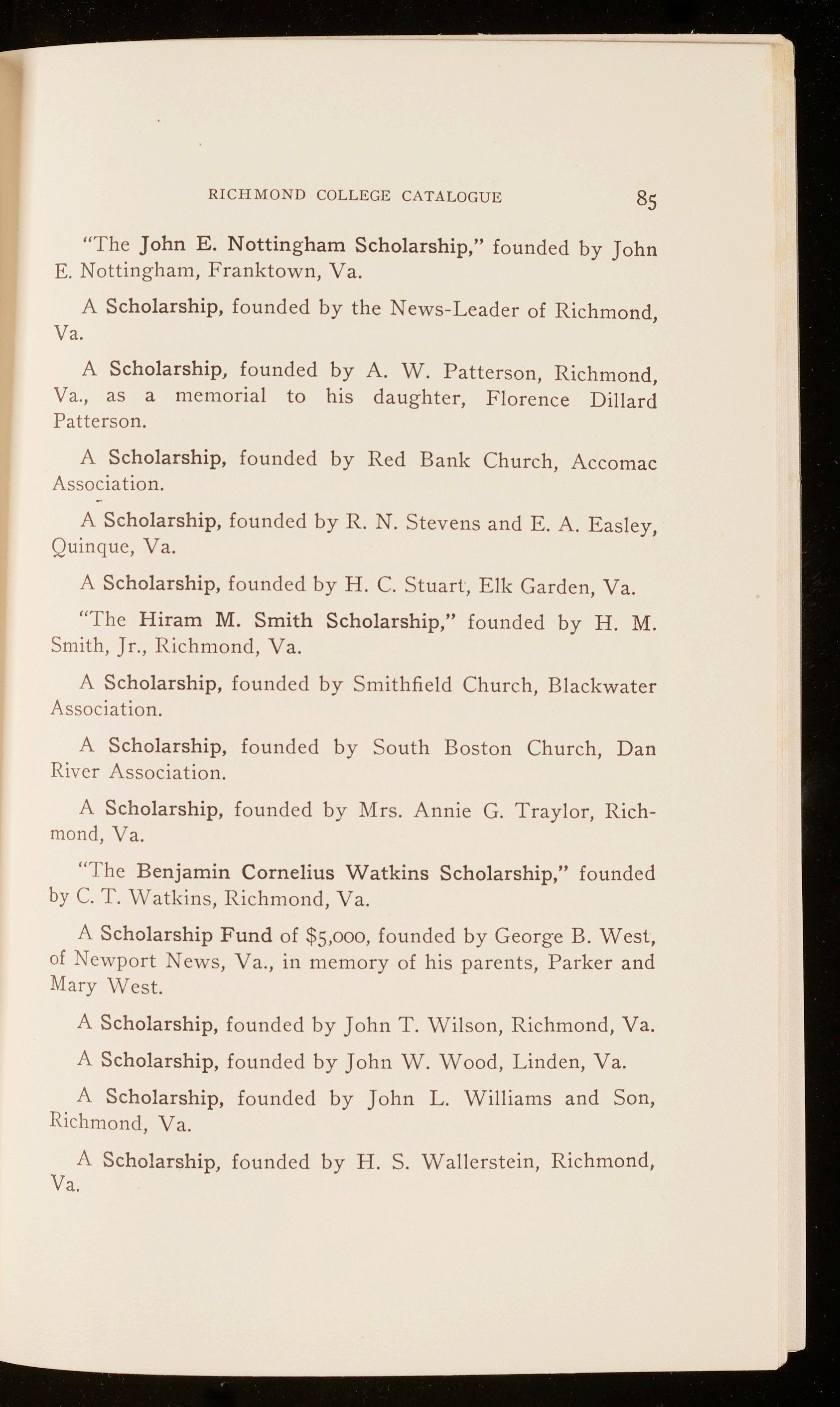
" The John E. Nottingham Scholarship," founded by John E. Nottingham, Franktown, Va.
A Scholarship, founded by the News-Leader of Richmond, Va .
A Scholarship, founded by A. W. Patterson, Richmond, Va., as a memorial to his daughter, Florence Dillard P atte r son.
A Scholarship, founded by Red Bank Church, Accomac Assoc iation
A Scholarship, founded by R. N. Stevens and E. A . Easley, Quinqu e, Va.
A Scholarship, founded by H C. Stuart, Elk Garden, Va.
"T he Hiram M. Smith Scholarship," founded by H. M. Smith, Jr. , Ri chmond , Va.
A Scholarship, founded by Smithfield Church, Blackwater Assoc ia ti o n
A Scholarship, founded by South Boston Church, Dan River A ss ociation.
A Scholarship, founded by Mrs. Annie G. Traylor, Richmond , Va.
"T h e Benjamin Cornelius Watkins Scholarship," founded by C. T. Watkin s , Richmond, Va.
A Scholarship Fund of $5 ,000, founded by George B. West, of New p ort News, Va., in memory of his parents, Parker and Mar y 'N e st.
A Scholarship, founded by John T. Wilson, Richmond, Va.
A Scholarship, found e d by John W. vVood, Linden, Va.
A Scholarship, founded b y John L. Williams and Son, Rich mond, Va.
A Scholarship, founded by H. S. Waller s tein, Richmond, Va .

A Memorial Scholarship, founded by H. W. Straley, of Princeton, W. Va., in honor of his mother, Mrs. Delilah Stra ley.
In 1914 the following scholarships were established:
A Scholarship founded by Zion Church, of the Accoma c Association.
The Mary Baxter Downer Scholarship, founded by Mr. R. L. Downer, of Daniel, Va., in honor of his mother.
The Henry Marion Allport Scholarship, founded by Mr . and Mrs. H. M. Allport, of Richmond.
The M. L. Straus Scholarship, founded by Mr. Charl es Straus, of Richmond, in honor of his father, M. L. Straus, and of his son, Malcolm Lee Straus, who died while a student of Richmond College, April 1, 1914.
A Scholarship, founded by Mr. J. G. Corley, of Richmond . Hon. J. L. M. Curry transferred to the College his copyright interest in two books, "Wi lliam Ewart Gladstone" and "Southern States of American Union," the same to be held and the income used for scholarship purposes.
The donations are used to pay the board of young men studying for the gospel ministry of the Baptist denomination Their application is not confined to young men from Virginia .
The Woolverton Donation, $1,000, founded by George A. Vvoolverton, of Albany, N. Y.
The John Tabb Donation, $1,200, founded by Thomas Tabb, Hampton, Va., in memory of his father.
The Mathew T. Yates Donation, $1,300, given by the Rev. Dr. M. T. Yates, Missionary, Shanghai, China, "to help educate young men who shall continue to preach after my voice is hushed."

The Joseph B. Hoyt Fund, $5,000, given by the deceased friend whose name it bear s, of Stamford, Conn.
The William A. Gray Donation, $1,200, founded by William B. Gray, M. D., of Richmond, Va., in memory of his father, a distinguished Christian physician of Fluvanna County.
The Lulie L. Pollard Donation, $2,500, founded by Thomas F. Pollard, of Richmond, Va., in honor of his wife.
The Mattie Schmelz Donation, $1,000, founded by Henry L. and George A. Schme lz, of Hampton, Va., in memory of Mrs. Henry L. Schme lz.
The W. T. Clark (Prince Edward County, Va.) Donation , $1,000
The E. A. Colston Fund, now of $1,000, bequeathed by the friend whose name it bears.
A Fund of $5,000, founded by George B. \iVest, of New• port News, Va., in memory of his parents, Parker and Mary West.
All these donations have conditions attached, which are filed with the bonds, for the guidance of the Trustees.
The trustees of Richmond College have approved a proposal to raise a fund of ten thousand dollars to be invested and held by the College as a permanent memorial in honor of William E. Hatcher, D. D., LL. D., late president of the Board . The income of the fund will be used to assist worthy students who need help to secure college education. The fund lacks $3,500 of completion, and gifts are invited.

Scholarships established in Richmond College during the campaign for the Women's College and Endowment Fund shall be used under the following regulations:
r. A scholarship becomes available for use when not le s s than two thousand dollars has been paid into the College treasury.
2. Scholarships established since January 1, 1908, are open to either male or female students, unless the donor specifies a sex limitation.
3. A scholarship pays the annual tuition of the holder. This fee is at present one hundred dollars, which is therefore the present annual value of a scholarship.
4. Recipients of scholarships must meet the usual entrance requirements that are demanded of students who pay tuition.
5. Donors of scholarships who wish to nominate students to receive the benefit of their scholarships are informed that it is a rule of the College to make its appointments for one year at a time, and then repeat the appointment as often as may be needful and desirable.
6. Donors of scholarships are requested to nominate beneficiaries by July 1st preceding the opening of the session when the scholarship is to be used, and to notify the President of the College of the nomination. If the donor has reported no nomination by September rst, the College will appoint a beneficiary for the current session.
7. It is sometimes desirable to divide a scholarship and to appoint two persons to enjoy the benefits of a half-scholarship each. In such case the holder of a half-scholarship pays half of of the one hundred dollar tuition fee, or $25 for each half session.

8. Reports of students' class and examination standing are rr:ailed at regular intervals to parents or guardians, and a transcript of a beneficiary's report will be mailed to the donor of a scholarship, provided request is made at the President's office.
The committee in charge has general instructions, in making its award of all Aid Funds, to give the preference:
I. To applicants already at College, who have maintained a good standing, both in character and study.
II. To other fully prepared applicants who shall present satisfactory testimonials from the school last attended, or from other persons who have had opportunity to judge, certifying to their health, attainments, habits of study and moral character.
III. To those of either class who give reasonable assurance that they will complete a course of study leading to one of the degrees of the College.
The recipients of aid are expected to prove, as students, not only above censure in all respects, but actively helpful to the College by example and by earnest work.
RICHMOND COLLEGE CAT.1LOGUE
FREDERICK WILLIAM BOA T\VRIGHT, LL. D.
PRESIDENT
W . S. :McNEILL, Ph. D., LL. B.
PROFE SOR OF L\ \\'
JOHN RA DOLPH TUCKER, A. B., LL. B. CASSIUS MONCURE CHICHESTER, A. B., LL. B. THOMAS JUSTIN MOORE, A . B., LL. B.

JOHN GARLAND POLLARD, LL. B.
LECTURER ON THE VIRGINIA CODE
The Law Schoo l, established in 1870, and contin u ed with slight interruption ti ll 1882, was in 1890 firm ly re -establis h ed. T he location is eminently suited for combining pract ical with theoretica l instruction, by reason of easy access to the n umerous Courts-Federa l, State, Municipa l-held in the city of Richmond, and the large and well-selected librar ies of the State and of the College.
There are two classes in the Sc h oo l. Regular attendance, satis factory daily recitations and written examinat ions on the subjects of each class are r eq uir ed for g r ad uati on. No student wil l be permitted to enter the Senior Cla ss who has not comp leted satisfactor ily the work of the Junior Class, or its eq uivalent. No student may take the wo rk of both classes in one year. Each applicant for admission must g·ive evidence of fai r genera l ed u cat ion . Cand id ates for the law degree of LL. B. must show twelve e ntr ance uni ts, or the equivalent of three years of high sc h oo l work.
The courses, divided according to classes, are as fo ll ows:
r. Personal Property, including Wills and Administration, Bailments and Carrier s.
2. Domestic Relations.
3. Crimina l Law .
4. Contracts.
5. Torts.
6. Negotiable In struments.
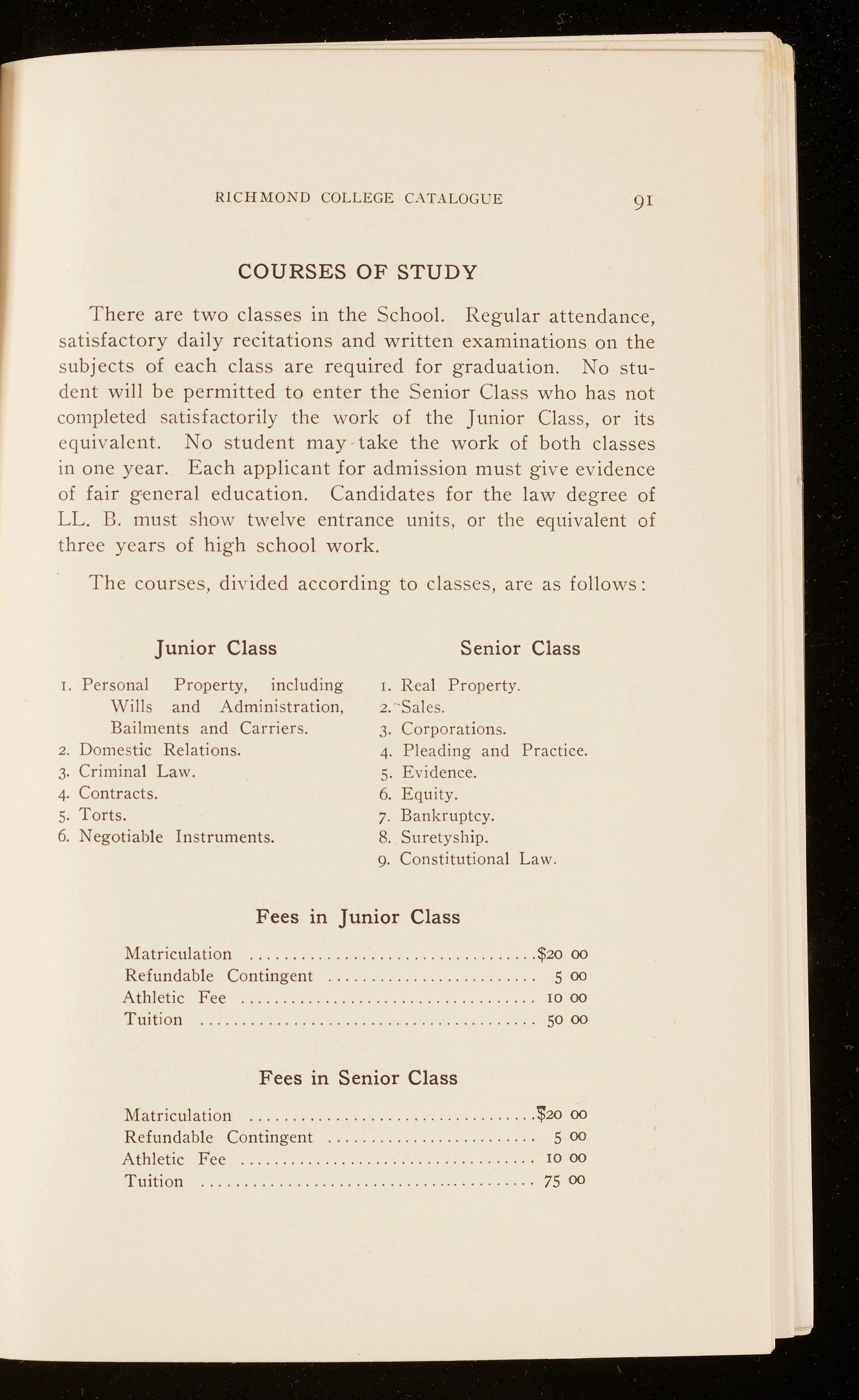
r. Rea l Property.
2. "Sales.
3 Corporations.
4. Pleading and Practice.
5. Evidence .
6. Equity.
7 Bankruptcy.
8. Suretyship.
9. Constitutiona l Law.
Matriculatio n
Refundable Contingent
At hl et ic Fee .........
Tuition
Matriculat ion
Refundable Contingent

The matriculation fee, the contingent fee, the athletic fee and half of the tuition fee are payable at entrance. The second half of tuition fee is payable in February. No honors are announced nntil all fees are paid in full.
Instruction is given between the hours of 9 :oo A. M. and 12 :30 P. M. Detailed schedule will be found in the special law catalogue.

A COLLEGE FOR WOMEN
CO-ORDINATE WITH RICHMOND COLLEGE FOR MEN
FREDERICK WILLIAM BOATWRIGHT, L L. D. PRESIDENT
MAY LANSFIELD KELLER, Ph. D. DEAN
The b u ildings of Westhampton Co ll ege occ u py the highest part of a t r act of land emb r ac ing 130 acres . Sepa r ated fr om this camp u s by a lake of abo u t eight ac r es in extent a r e the spacious gro u nds of the co llege for me n. The situation is in the western s u b ur bs of R ichmo n d, eas ily accessib le by st r eet cars.
·westhampton Co llege is owned and controlled by t h e Richmond Co ll ege corpo r ation, and enjoys a ll the genera l advanta g es afforded by co-ordi n at io n with an o ld and we ll established college of standard grade . At the same time the college for women has its own separate campus, its own buildin gs , and its independent institutional life. While many profess ors wi ll teac h in both co ll ege s , instructio n wi ll be altog ether separate, and women wi ll at no time be ta u ght in class es with men . The interna l administration of Westhampton Coll ege is immediate ly in charge of a woman dean, and both men and women t e ach i n t h e fac ul ty.
The grounds, bui ld ings, a n d equipment of Westhampto n College are va lu ed at $400,000, and the co ll ege shares l a r ge ly in the benefit of the mill ion do ll ar endowme n t he ld by the
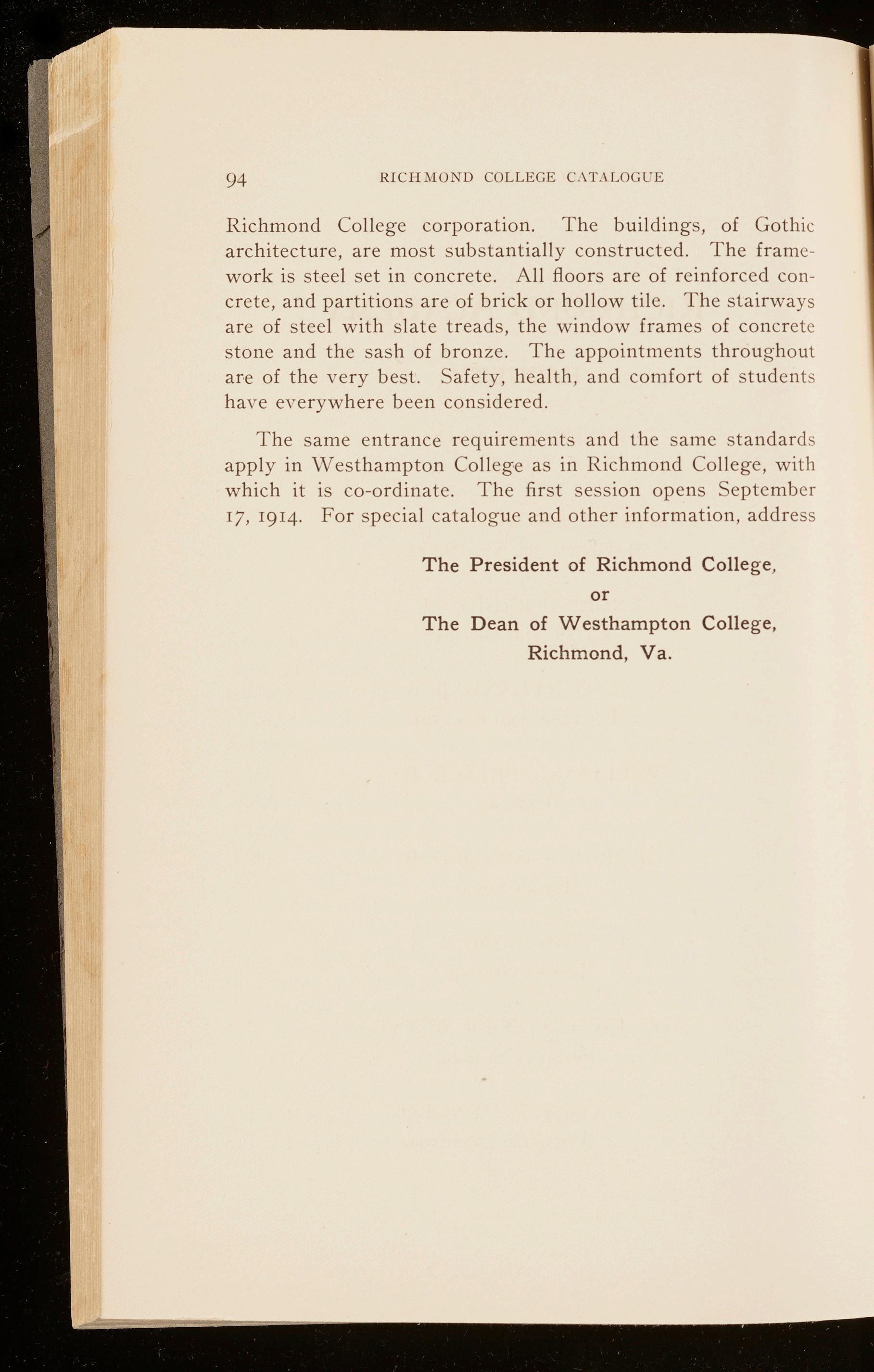
Richmond College corporation. The building s, of Gothic architecture, are mo st s ub s tantiall y constructed. The fram ework is stee l set in concrete. All floor s are of reinforced concrete, and partitions are of brick or hollow til e. The sta irw ay s are of stee l with s late treads, the window frames of concret e stone and the sas h of bronze. The appointments throughou t ar •e of the very best. Sa fety, health , and co mfort of student s have everyw h ere been conside r ed.
The same ent ran ce r eq uir ements a nd the same sta ndar d s apply in Westhampton Co ll ege as in Richmond Co ll ege, with which it is co-ordi na te. The first sess ion opens Septemb er 17, 1914. For special cata lo g u e and other information, add r es s
The President of Richmond College , or
The Dean of Westhampton College, Richmond, Va.

RCCIIMONOCOLLEGEC,\L\LOGUE
WILLIAM L. PRINCE DEAr
FRA?\K Z. BRO\Vl\", B. S., E. E. l\bTIIL\I.\TIC ANO SCIENCE
ENGLISH BAGBY, M. A. L.tTIN ANOGERMAN
A. G. RYLAND, B. A. ENGLISHANOFRE 'CH
WILLIAM L. PRIKCE, B. A. HISTORY
GEORGE P. ARNOLD, B. A. THIRD FORM
L. . GILLIAM, B. A. LowER ScuooL
l\IISS KA TE STEGER WINSTON PRnrARY ScnooL
GEORGE P. ARNOLD A TIILETICDIRECTOR
The Richmond Academy occupies a large brick building on the old Richmond College campus between Ryland and Lombardy, and Broad and Grace Streets. The building has been recently remodeled within so as to afford the most ample and modern faciltics for school use. Large grounds around the Academy furnish abundant opportunities for athletic sports.
Tuit ion, Forms I-IV (per session)
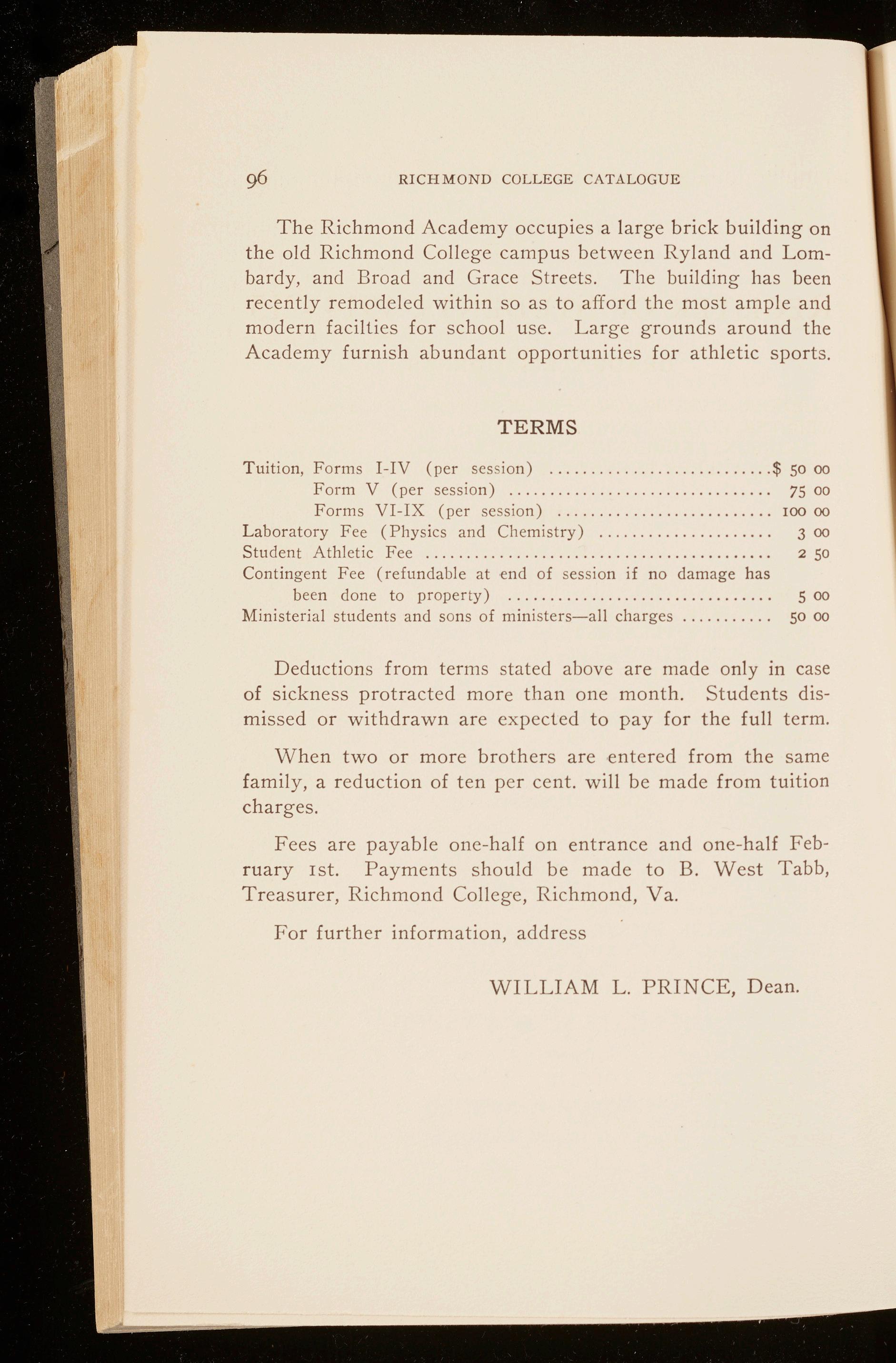
Contingent Fee (refundable at end of session if no damage has been done to property)
Deductions from terms stated above are made only in case of sickness protracted more than one month. Students dismissed or withdrawn are expected to pay for the full term.
When two or more brothers are entered from the same family, a reduction of ten per cent. will be made from tuition charges.
Fees are payable one-half on entrance and one-half February rst. Payments should be made to B. West Tabb, Treasurer, Richmond College, Richmond, Va.
For further information, address
WILLIAM L. PRINCE, Dean.
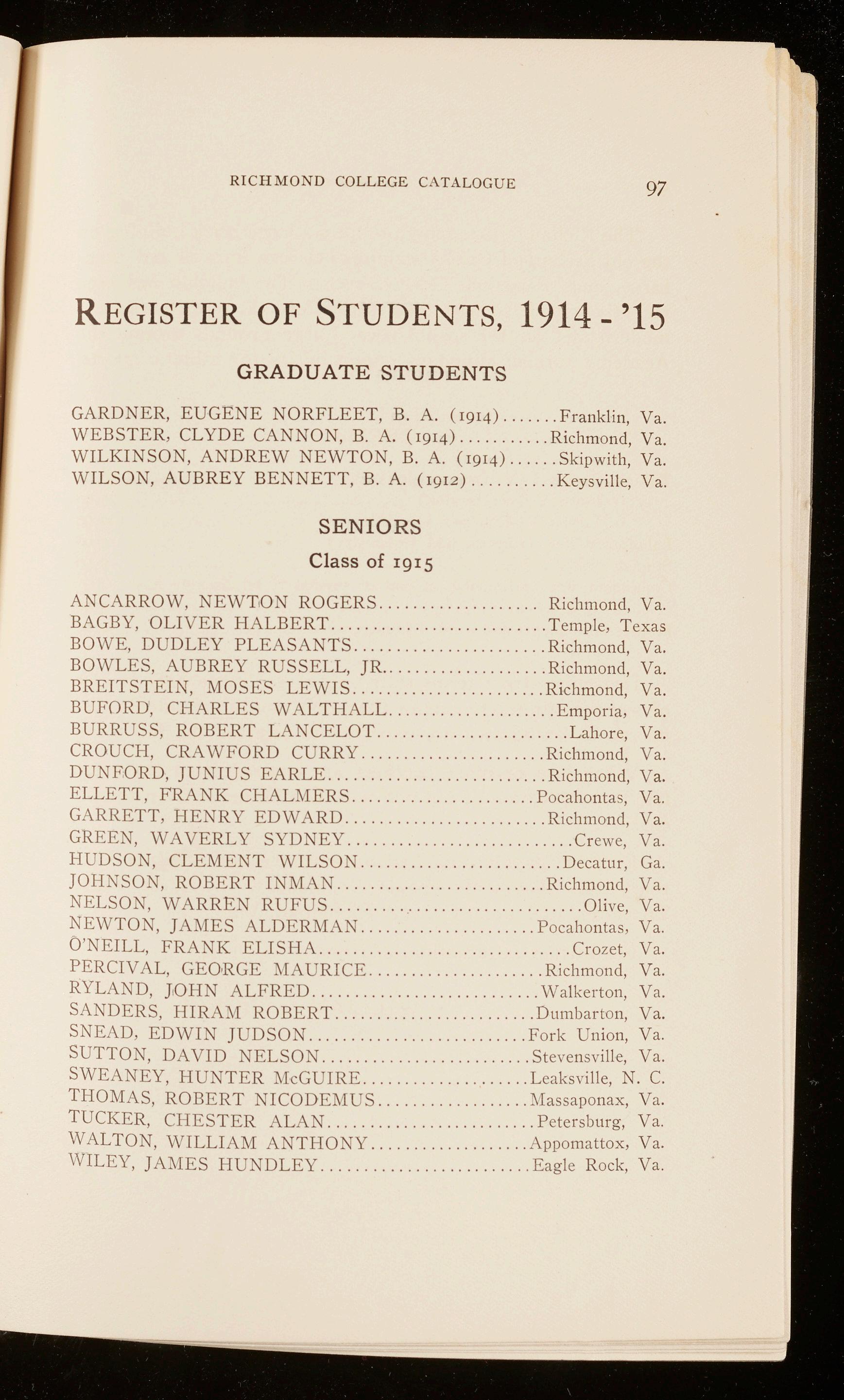
GARDNER, EUGENE NORFLEET, B. A. (1914) Fra nkl in, Va. WEBSTER, CLYDE CANNON, B . A. (1914) ........... Richmond, Va. WILKINSON, ANDREW EWTON, B A. (1914) ...... Skipwith, Va WILSON, AUBREY BENNETT, B A. (1912) ..... Keysville, Va.
Class of 1915
ANCARROW, NEWTON ROGERS ..... .. . . . .... . ... Richmond, Va. BAGBY , OLIVER HALBERT ......... . . . .... ... ....... Temple, Texas BOWE, DUDLEY PLEASA TS . ..... Richmond, Va. BOWLES, AUBREY RUSSELL, JR ... .............. .. Richmond, Va. BREITSTEIN, MOSES LEWIS . .. . . . ........... Richmond, Va. BUFORD, CHARLES WALTHALL. ........... Emporia, Va. BURRUSS, ROBERT LANCELOT ...... .. .... . ..... L ahor e, Va. CROUCH, CRAWFORD CURRY ...................... Richmond, Va. DUNFORD, JUNIUS EARLE . .... ... ... Richmond, Va. ELLETT, FRA K CHALMERS ... . ........... Pocahontas, Va. GARRETT, I-IE TRY EDWARD .. ...... Richmond, Va. GREEN, WAVERLY SYDNEY ... .. ... . ...... Crewe, Va. HUDSON, CLEMENT WILSON ..... . ...... Decatur, Ga. JOHNSON, ROBERT I i !\IAN .... . ........... ........ Richmond, Va. NELSON, WARREN RUFUS .............. .......... Olive, Va. NEWTON, JAMES ALDERMAN .......... Pocahontas, Va. O'NEILL, FRANK ELISHA ..... . .. .. . . Cro zet, Va. PERCIVAL, GEORGE MAURICE ......... ... Richmond, Va. RYLAND, JOUN ALFRED ........ . ... ............. Walkerton, Va. SANDERS, HIRA:\1 ROBERT ..... . . . . . . . .Dumbart on, Va. SNEAD, ED\VI JUDSON . ............... ........ Fork Union, Va. SUTTON, DAVID NELSON ... . .. . . . . ..... Ste1·ensville, Va. SWEANEY, HUNTER McGUIRE ...... .. . .... ...... Lcaksville, N. C. THOMAS, ROBERT NICODEMUS . ..... :'.IIassaponax, Va TUCKER, CHESTER ALAN ......... ...... Petersburg, Va. WALTON, WILLIAM ANTHONY ..... . Appomattox, Va. WILEY, J AMES HUNDLEY .......... . .............. Eagle Rock, Va.

RICHMOND COLLEGE CATALOGUE
Class of 1916
ALLEN, WALTER KENDALL ....... Salisbury, Md. ANDERSON, KARL BROOKE Richmond, Va. BAHLKE, WILLIAM HERBERT . . .... . ...... .... ... Baltimore, Md . BARLOW, WILLIAM HARVEY Brooknea l, Va. BRANNOCK. WILLIS HERBERT ................... Cambr idge, Md. CARTER, JOHN ARCHER Sutter, Ill. COBURN, JOHN THOMAS . . ...
. Easton, Md.
DEWLING, WALTER FRANKLIN Baltimore, Md. DURHAM, WALTER EMERSON ........... . ... . . .. . Appomattox, Va. ELLWANGER, ALBERT THOMPSON Witt, Va. FATHERLY, DUNTON JACOB .
. . ........ .. ...... Weirwood, Va. FORE, PHILIP WINFREE ..... Richmond, Va. GARBER, JOHN HOWARD .. . .......
. Wa ynesboro, Va. GELLMAN, MOSES ... .. .............. . .... . .. . ...... Richmond, Va. GOODMAN, ANDREW JACKSON . ...... .......... Guin ea Mills, Va. HAMILTON, WILLIAM WIST AR, JR. .. Lynchburg, Va. LESLIE, JOSEPH ALEXANDER .. . . ... . ...... ...... . . Tazewell, Va.
McDANEL, RALPH CLIFMAN ............... Covington, Ky. METCALF, VICTOR SHARP . ....... ..... . . ....... . .. Richmond, Va. MITCHELL, PERRY LOUIS .. Anoka, Minn. PERDUE, FAUL GOODE ........ ... .. . . .. .. . .... .. ... Richmond, Va. QUICK, GEORGE WILLARD ............... . ....... Falls Church, Va. SAVEDGE, JAMES ACTIUS ......... Littl eto n, Va. SNEAD, EDLOE BRYAN .. R ichmond, Va. TAYLOR, LORIMER BLAND . . ... . .......... . . Harmony Village, Va. TERRELL, GEORGE TYLER .. ... . ....... . ... .. .. . .. . .. Ashland, Va. WARRINER, HENRY GRANT ........ . .. . ... .... . . . . Ri chm ond, Va. WYATT, HENRY OSWELL M ontagu e, Va.
ALDHIZER, STUART GEIL. ....................... . . Broad way, Va. BAGL EY, WILLIAM A RCHER .......... . .. . ......... Bla ckstone, Va. BAUSUM, R,OBERT LORD Annapolis, Md. BOYD, CLAUDE CLEVELAND ...... . . . . . . .. . ... . ..... Honaker, Va. BRISTOW, WESTON Stormont, Va. BROOKING, THOMAS NEWTON Orange, Va.

RICHMOND COLLEGE CATALOGUE 99
BURCH, JUDSON KERFORD ......................... Millwood, Va.
CHARLTON, HUBERT WARREN ....................... Dillwyn, Va.
CLARKE, WILLIAM BURLEIGH ................ Newport, News, Va.
CLOPTON, HARVEY ARCHER ...................... Richmond, Va.
COMBS, MORGAN LAFAYETTE ....................... Council, Va.
CONNELLY, HESTER WALTON ........................ Gladys, Va. CRIPPEN, LEE FORBES .............................. Hurlock, Md.
DAVIS, WIRT LEE ............................... Charlottesville, Va.
DICKERSON, LYNN CALGAR ................... Drakes Branch, Va.
DIGGS, ISAAC, JR. ................................... Richmond, Va. FIELDS, JOHN CAM ........................... Mouth-o1-Wilson, Va.
FOX, EDWARD JACKSON .. . .............. . Newport News, Va.
GELLMAN, SAMUEL HELMER ..... ........... ...... Richmond, Va.
HARRIS, ALBERT HARDIN ... . . .... .............. . Richmond, Va.
JOHNSON, CLAUD :ms OSBORNE .. .. ... ........... Basic City, Va. LATANE, LOUIS MONCURE ......................... Richmond, Va.
LA WRE CE, VIVIAN STREETER ..... ...... Churchland, Va.
LOGAN, JOHN ROWELL, JR. ........................ Yorkville, S. C.
McCLUNG, HUBERT WILLIAM .................... Tincher, W. Va.
MEADE, RICHARD HARDAWAY, JR. ............... Richmond, Va.
MILLHISER, ROGER ................................. Richmond, Va.
MONTAGUE, HILL, JR .............................. Richmond, Va.
MUSTOE, ROBERT MOORE ............. ........... Car!oover, Va.
NOBLIN, EMERA YANCEY .......................... Clarksville, Va.
NORTHEN, EUGENE ERNEST . .. ... ..... Rio Vista, Va.
OWEN, SANDY CLAY ........................ Republican Grove, Va. POTEET, JAMES HIRAM ............. ............... Salem, Va.
RENNIE, FRANK FLETCHER, JR ..................... Richmond, Va. RICHARD SO , JOH KIRK ............................. Crewe, Va. ROBINSON, ELDRED HITER ........................... Marion, Va. ROSS, GEORGE WILMOT ............................ La Belle, Mo. RUSSELL, HARRY ASTON ........................... Jon esville, Va. RUSSO, AUGUSTI E JOSEPH ..................... P ortsmouth, Va. SILVEY, WILLIAM RUSSELL. ...................... Richmond, Va. SMITH, GEORGE FERDI1 AND, JR. ..... ....... ..... Baltimore, Md. SNEAD, LAWRENCE OWEN .......................... Virgilina, Va. SUTHERLAND, HERBERT MAYNOR ................ Clintwood, Va. TALIAFERRO, THOMAS BOYD ... .... .... .......... Caret, Va. THOMAS, HERMAN POLLARD .. , • ...................... Wise, Va. WHITE, WILLIAM EARLE ......................... McKenney, Va. WILLIAMS, RAMOTH PAYNE ........................ La Belle, Mo. WRIGHT, JAMES RAYMOND .. .......... ....... Philadelphia, Pa.

RICHMOND COLLEGE CATALOGUE
ABRAMS, RAY HAMILTON .... Patchogue, N. Y. ADAMS, PHILIP CHAPPELL. Clu ter Springs, Va.
ALLEN, BERNARD DIGGS ....... K ing and Queen C. H , Va.
ANDERSON, BYRON FIELDS ..... . ................ .. .. Marion, Va.
ANDERSON , HIRAM DOUGLAS ... . . . .. . ............. Clarkton, Va.
BAGBY, WILLIAM HUGH .. ............ Stevensville, Va.
BAKER, KENNETH LAMAR .. ............ Rich mond, Va.
BARKSDALE, IRVING SYDNOR . ....... . ... . .. . .. . .. R ichmond, Va.
BARKSDALE, J OHN CRADDOCK .... ................ .Houston , Va.
BASS, THOMAS EDWARD , JR., Norfolk, Va.
BASSETT, WILLIAM McKINLEY ...... . ........... . . ... Bassett , Va.
BEALE, WILLIAM ELTON . . .. . ... .. . . ...... Windsor, Va.
BEAZLEY, ROLAND JENNI GS .................... Upper Zion, Va.
BEASLEY, TITUS WALKER .... . ..... . ...... . ...... H ollywood, Va.
BENNETT, CHARLES ROGER ............ Danville , Va.
BISH OF, CARROLL ERNEST . . .... ... . . .. Warrenton , Va.
BOBBITT, JOHN R,OBERT ......................... Stony Creek, Va.
BOWLES, LEFTWICH SHEPHERD ... Chester, Va.
BOTELER, JAMES EARLE ... ...... . ... .. .. . ..... R emington, Va.
BRADLEY, GEORGE YOUNGER, JR. ............. Tappahannock, Va. BRADSHAW, JOHN PILCHER . .. . Burkeville , Va.
BRITTLE, OSCAR LEONARD .............. . Waverly, Va.
BRITTON, FREDERICK STIRLING . ........... Seven Mi le Ford, Va. BROADDUS, WILLEY RICHARD ..... . .... We st Poin t, Va. BRONSON , EMMETT SHERLOCK ................... Ri chmond , Va. BURTON, WILLIAM WEAVER Salem , Va. CHEETHA~I, ALBERT CORNELIUS ................ Baltim ore . Md. CHESTER:.fAN, EVAN RAGLA D ....... . . .. ... . .. . . Richmond , Va. CLARK, MERCER OWEN ... . . .. . . .. . ........... Parksley, Va. CLEMENT, CHARLES :.IOFFITT .. • ....... Jeffcrsonton, Va. COLE:.IAN, RICHARD TAYLOR ................ Richmond , Va. COMBS, FIELDING, JR ... .. . . . . . .... . . . ...... .. .. .. ... Honaker, Va. CORR( RICHARD HENRY .................. West Point , Va. COX, CHRISTOPHER CHRISTIAN, JR. ......... Newport News, Va. CRAIG, IRVIN GA:.1MON ....... . .................... Ri chmond, Va. CRAVEN, ~1URRAY BAXTER .. .. ................... Charlotte, N. C. CROSSLEY, OBLE THO:.IAS .... '>" Kinsale , Va. CROWELL, WILLIAM YOUNG .. . Manchester, N. Y. CULBERT , GUY THURSTON ..... . .......... . .... . ..... Marion, Va.
DAWSON, HENRY STARKE ...... . ..... . .. .......... Richmond, Va.
DEAN, EDWIN CARLTON ...........................

Newcast le, Del.
DESPORTES, DELL VALMO N T ...................... Richmond, Va.
DICKINSiON, NA THAN LOOK Marion, Va.
DORSET . GEORGE NEWTO ..................... Washington, Ga.
DUNFORD, FRANK BER ARD , JR. . Richmond, Va.
ED::\IU DS, JA~1ES FREDERICK ................ .. .... Accomac, Va.
EFFORD, LAWRE CE WADSWORTH ......... Farnham, Va.
FOX, PERCY RYLAND ........ Edgar, Va.
GARCI , RAMON DAVID, JR .... . ..... . ...... Richmond, Va.
GLASS, ::\fAX..... . ........ . ... ... Richmond, Va.
GODWI , CHARLES BERNARD, JR ................ Chuckatuck, Va.
GODWI , FRANK WHITNEY .. . ......... ... . ... ... Chuckatuck, Va.
GOODE, BENJAMIN CLIFFORD . Henry, Va.
GRIMES, JESSE WILLARD .............. . . .. ....... Chur chland, Va.
HALL, 0 CAR LEVI. ...................................... Witt, Va .
HA1\1ILTON, PERRY ELWOOD ....................... Lynchburg, Va. HARDWICK, LINDSAY R SSELL. ........... ....... Kinsale , Va.
HARRIS, l\IALCOL\1 HART . .... . .......... . ...... Apple Grove, Va. HARRISON, E::\L\IETT CLIFFORD . .. Farnham, Va. IIARRUP, PAUL LOUIS . ..... . ..... Yale, Va.
HAZELGROVE, ELLIOTT BRYAN .......... ....... Richmond, Va. HIBBITTS, PHILIP JERO:\IE .. . ...... Grundy, Va. HICKS, DUVAL QUi r N . ...... . .... . . Fredericksburg, Va. HILL, SA::\fUEL S1IITII ............... . . . ..... Scottsville, Va. HITE, JESSE REUBEN ........ . .. . . . Virgilina, Va. HONAKER, THO:\IAS JED'FERSON ......... . .. . ...... Honaker, Va. HOOVER, EUGENE CARL. ..................... . .... Carloover, Va. HUBBARD, LEONARD CECIL ...... .. ........... Princeton, W. Va. llt:RT, \VERTER HOB SO .................. ...... Stevensburg, Va. KAKE, EPPA DAVENPORT . . .............. . Midland, Va. KAY, ASIIBY \YELDON . . ........ Alps, Va. KENNEDY, JA:\IES ARTHUR ....................... Williston, S. C. KENNEDY, \VILLIAl\I ROBERTS ............. . ..... \Villi ton, S. C. KIDD, G.\TES \VARRI ER ................ ............ Crewe, Va. KOONTZ, RAE THOMAS ................. . ........ Luary, Va. LACY, RHODERICK LEE . . . Scottsburg, Va. LANE, HOWARD CHAPMAN ............. . Easton, l\fd. LIGGAN, LEE SPOTTS\VOOD, JR .................... Richmond, Va. LUTTRELL, HOMER BROWNING ............ Ami ss\'ille, Va. :\I:\PP, R\RRY LLEWELLYN . ... . .. .. .. . . . .. Belle HaYen, Va. :.\[ARTI .L, WALTER FRA:NKLI ........ ....... Glasgow, Va. :.\IARI IN, \VILLIA:\I F R:.\IAN ............. . ........... Suffolk, Va. :.\IASON, CLI TON LEE ........... Parksley, Va. :\IASTERS, \\'ILLIA:.\I WICKLIFFE ... ........... Atlanta, Ga.
ro2
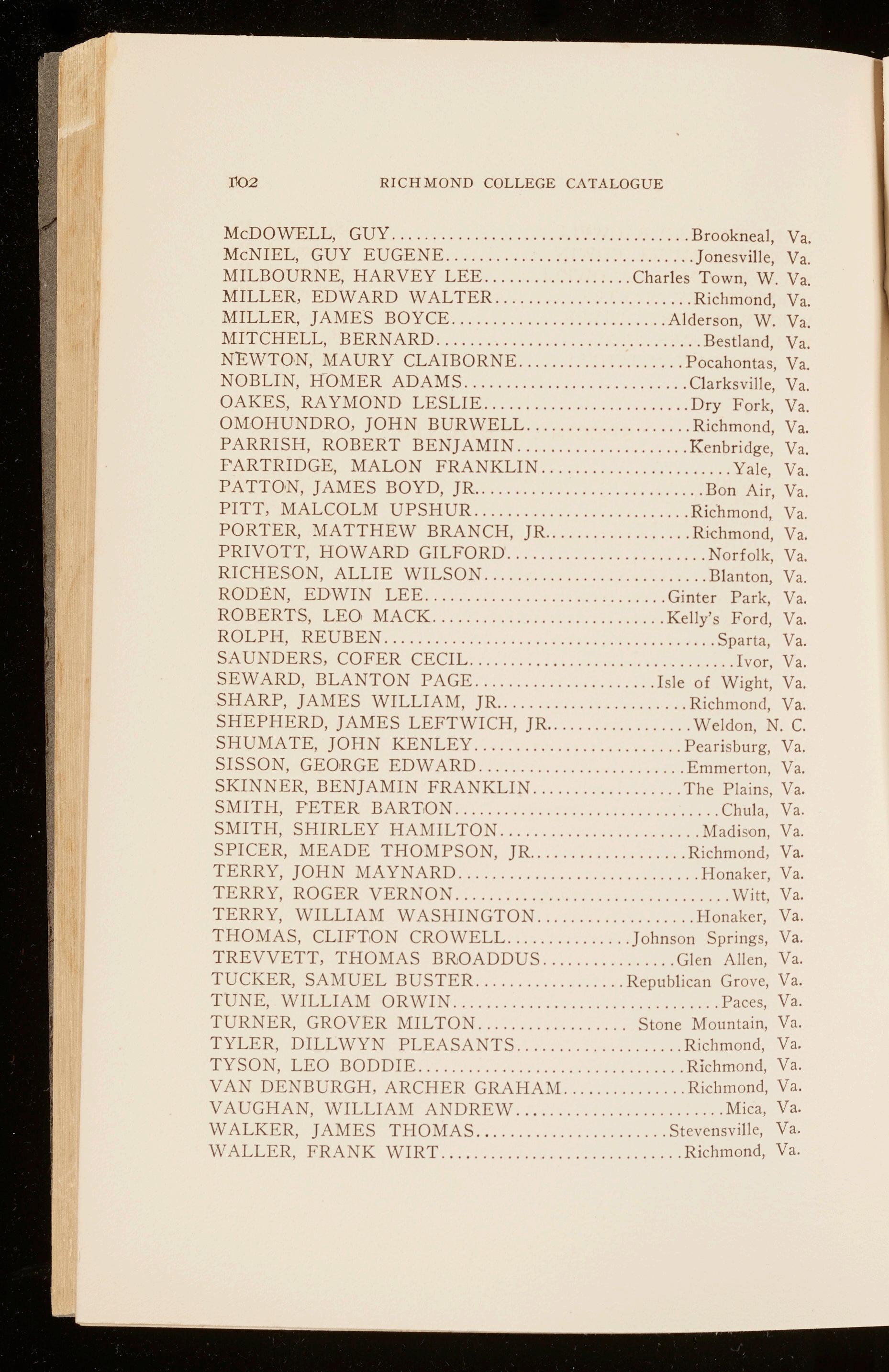
RICHMOND COLLEGE CATALOGUE
McDOWE L L, GUY ........... ..... . ..... . . . Brook neal, Va.
McNIEL, GUY EUGENE .......... J onesv ille, Va
MILBOURNE, HARVEY LEE . . .... Char les Town, W Va. MILLER, EDWARD WALTER .... .. .................. Richmond, Va. MILLER, J AMES BOYCE . ..... . .. . .. A lderso n, W. Va. MITCHELL, BERN ARD . .............. . Bestland, Va.
N:EWTON, MAURY CLAIBORNE .. ... Pocahonta s, Va. NOBLIN, HOMER ADAMS ...................... Clarksville, Va. OAKES, RAYMOND LESLIE ... . .... ... ........ Dry Fork, Va. OMOHUNDRO, JOHN BURWELL. . ....... .. . . . Richmond, Va. PARRISH, ROBERT BEN J AMIN ....... Kenb r idge, Va. PARTRIDGE, MALON FRA KLI 1 •....• Yale, Va.
PATTON, J AMES BOYD, JR ..... . ... .. . Bo n Air, Va. PITT, MALCOLM UPSHUR ....... ..... R ichmond, Va. PORTER, !-.1ATTHEW BRA CH, JR .... . ... .. ... . .. . Richmond, Va.
PRIVOTT, HOWARD GILFORD ........ ............. Norfolk, Va. R I CHESON, ALLIE WILSON ......... . . . ..... . .. .. Blanton, Va.
RODEN, EDWIN LEE ... .. .. . ... . .. Ginter Park, Va.
ROBERTS, LEO MACK . .. . ......... Kelly's Ford, Va. ROLPH, REUBEN ........ . ............................... Sparta, Va.
SAUNDERS, COFER CECIL. .......... . .............. Ivor, Va.
SEWARD, BLANTON PAGE . ... I sle of Wight, Va.
SHARP, JAMES WILLIAM, JR. . . ... ..... Richmond, Va. SHEPHERD, JAMES LEFTWICH , JR .......... . .... .. . Weldon, N. C. SHU MA TE, JOHN KENLEY . . . . .. .. .. . . . Peari sburg, Va.
SISSO , GEORGE EDWARD .. . . .. ... .. . Emmerton, Va.
SKINNER, BENJAMIN FRANKLIN ......... ........ The Plain s, Va.
SMITH, PETER BARTON . . .. . .. . .......... Chula, Va.
SMITH, SHIRLEY HAMILTON ... .. ... .. ....... Madison, Va. SPICER, MEADE THOMPSON, JR .. .... .. . . . .. ..... Richmond , Va.
TERRY, JOHN MAYNARD . ...... .. .. ...... Honak er, Va. TERRY, ROGER VERNON ............ . . . ...... . . ... Witt, Va.
TERRY, WILLIAM WASIIINGTON ........... . ...... . Honaker, Va.
THOMAS, CLIFTON CROWELL. .............. Johns on Springs, Va.
TREVVETT, THOMAS BROADDUS .. ............. Glen Allen, Va.
TUCKER, SAMUEL BUSTER . .... Republican Gro ve, Va.
TUNE, WILLIAM ORWIN ........ Pace s, Va.
TURNER, GROVER :MILTON ......... . . . ...... St one Mountain, Va.
TYLER , DILLWYN PLEASANTS ..... . Richmond , Va.
TYSON, LEO BODDIE . ... . ...... . .......... Richm ond, Va.
VANDENBURGH, ARCHER GRAHAM ...... . .... Richmond, Va.
VAUGHAN, WILLIAM ANDREW . ........ . ... Mica, Va.
WALKER, JAMES THOMAS . .. ... . ...... Stevensvill e, Va.
WALLER , FRANK WIRT ............................. Richmond, Va.

WARD, DONALD BAGWELL. .................... .... Smithfield, Va. WATS KY, SAMUEL EDWIN ............ . ...... Richmond, Va.
WICKER, JAMES CALDWE LL. ...... Richmond, Va.
WOOD, WILEY WALTER ............ . Norfolk, Va .
WOODY, ALBERT McIVER ..... .. ....... ........... Louisville, Ky.
WRIGHT, J AMES NEA L ..... . .... . . Richm0nd, Va.
WYATT, JOH N MITCHELL .......................... Richmond, Va.
BAKER, ROBERT MARCELLUS ...... . .. . . . .... Richmond, Va. BATTEN, CALEB ...... .. .. . . ......... . Smithfield, Va. BLAND, ANDERSO , .......... . . ....... ... Shatkelford's, Va. BLANKINSHIP, ALEXANDER HUGO .... . . .. Richmond, Va. CARTER, HARRY LEE ...... . .......... . Richmond, Va. CHRISTIAN, THOMAS LUTHER ..... ............. Vera, Va.
CLARK, HENRY THORBURN .................. . ...... Parksley, Va. COSBY, ANDERSON BLACKWELL, JR. . . ........... Richmond, Va. DECKER. HENRY WALKER ..... ....... . .... .. Lahore, Va. ESTES, HUGH THOMAS .................. . ....... Washington, Va FLINT, LAWRENCE EARLE ... .... ............... Lawton, W. Va. GRIFFITH , ERNEST HOMER .......... . ....... . Huntdale, N. C. GRUBB, JOHN ADAM ............ . ....... . Salisbury, N. C. HICKERSON, EDWARD EARLE ........... . ......... Richmond, Va. HUTCHISON, FRANCIS ALBURTUS ..... ....... . . Mana ssas, Va. KIDD, JOHN CLAUDIUS .... . ....... . . . ... Crewe, Va. PEYTON, EDWARD VOORHEES .................... Illidlothian, Va. ROBINS, BERTRAM LEE . ........... . . Richmond, Va. SOYARS, HE RY NOR:\1AN ............. . . .. . .. . Wenonda, Va. TIPTON, GEORGE BRITT .............................. Street , N. C. TOMBES, TH0;,1AS NATHANIEL. ................. Crystal Hill, Va. VAC HE, JEAN A r DREW .......................... Philadelphia, Pa. WALLERSTEIN, EMANUEL W . .. ... . . . .. . Ri chm ond, Va. WHITE, \VE DELL. .......... . ............. ..... Dixie, Va. WRENN, JAMES ERNEST ... . .. ....... . . .. .... Richmond, Va. W RIGHT, ELBERT JOSEPH ... .... . .... . Richmond, Va.

RICHMOND COLLEGE CATALOGUE
SENIOR CLASS
COGBILL, FHILIP HANCOCK ..... ... .. ...... Ashla nd , Va. CROWDER , CHARLES WOMACK, JR. . ....... Richmond, Va. CRYMES, THOMAS NEBLETTE . . ............. .... Meherrin, Va.
DUKE , JESSE CLARION . . . . . . ................ Richmond, Va. DUNFORD, EDWARD BRADSTREET ...... . Richmond, Va FINNIGAN, McCLELLAN GEORGE . ............ Richmond, Va. GARY, JULIAN VAUGHAN .... ......... ...... Richmond, Va. HARRIS, HERBERT WITT ........ ... . . . . .. Richm ond, Va. J AMES, BERNARD WATSON .... ... .... . .. .... Richmond , Va JONES, CATESBY GRAHAM ..................... . . Gloucester, Va. KING, WAVERLY GRETTER . ..... .. ............... Du mbarton, Va. L UEBBERT, CARL HEI 1R ICH . . . . ... . Richmond, Va. O'FLAHERTY, WILMER LO Y ...... . ..... F·ichmond, Va. PINNER, JAMES HU TER ......... . .. . .. .. Chuckatuck, Va. PITT, ALFRED TAYLOR .................. .. .. . Richmond, Va. POLLARD, OLIVER AMOS .. . .... . .. . Petersburg, Va. RANEY, GEORGE MEREDITH .. . .. . .... Smoky Ordinary, Va. SMITH, CHARLES HENRY .. . .................. Oldhams, Va. WICKER, JOI-I N JORDAN, JR . ................. Richmond, Va.
BAKER, ANDREW ELLIS ....... ..... . ................. Cedon, Va. CARDWELL, WILLIAM HOW ARD ............. Ashland, Va. CLARKE, WILLIAM BURLEIGH .... .... . .. Newport News, Va . COVINGTON, WILLIA~! BYRON .............. . ... New Church, Va. FORD, CHARLES EDWIN .... .. .. . ..... Richmond, Va. GAYLE, ROBERT BROADDUS .... . ... . ..... Richmond, Va. MILLER, JOHN MAURICE ........ ....... . ..... .... Richmond, Va. MOREWITZ, J ACOB LOUIS ...... ..... Newport cws, Va. MOSS, THOMAS OVERT ,ON, JR. ... .. . . . .. ... Beaver Dam, Va. SANDS, WILLIA~! HA~IIL TO , JR. .. . ....... Richmond, Va. SATTERFIELD, DA VE EDWARD, JR. . . .. . .. . Richmond, Va. SI-ffiL10N, MARVIN HALEY ....................... ... Ines, Va.

SM IT H, PERCY SCOT T ..... Ric hm ond, V a.
TATE, VERNOY BROWNIE Coeburn , V a.
WEST, J OSEPH ATK I NSON ... Richmo n d, Va.
WILSON, LLYOD TILGHMAN, JR ..... Ric hm on d, Va.
WILSON, PARKER RIDELL. . . ..... . .. .. .......... Gar dner, W. Va.




